Academic Report 2020
DSU ACADEMIC REPORT

Editor-in-Chief
Dr. Cheri Crenshaw
Lead Designer
Scott Garrett
Photography
Alex Santiago
Bryce Parker
Matt Black
Sean George
Review
Dr. Pam Cantrell
April Ficklin
PUBLICATION BOARD
Dr. Michael Lacourse
Provost and Vice President of Academic Affairs
Dr. Jordon Sharp
Vice President of Marketing & Communication
Jyl Hall
Director of Public Relations
Stacy Schmidt
Public Relations/ Publications Coordinator
Jared Madsen
Creative & Visual Services
Production Manager
Shantelle Owens
Director of Academic Budget
STUDENT
active
IN THIS REPORT
The Park Data Project: Tracking Visitors to Zion and Snow Canyon Parks 7 Next Stop for Criminal Justice Majors: Law School 9 DSU's Dental Hygiene Program: Education and Access to Care Come Together 10 Students Get Hands-on Experience at New Analytics and Modeling Center 18 The International Reputations of the Art Department Faculty 21 DSU's Elementary Education Program Gains National Recognition 22 Four Graduate Degrees Now Available at DSU 26 Atwood Innovation Plaza: Resources and Relationships Lead to Entrepreneurial Success FACULTY SPOTLIGHTS 30 Dr. Susan Hart 31 Dr. Erin O'Brien 32 Dr. Allyson Hamilton 34 Lora Klein 35 Vince Brown
FEATURES 3
SPOTLIGHTS 6 Undergraduate Research at DSU Sets Students Apart 36 Brianna McFadden 37 Debbie Peterson 38 Noelle West 39 Holly Blaha
learning. active life. 4 Degrees by College 7 Esports Club: Casual and Competitive Gaming 8 An Introduction to DSU's New Entertainment, Arts, and Animation Emphasis 8 A Look Inside the Center for Adult and Professional Education 12 The Udvar-Hazy School of Business Achieves Candidacy for AACSB Accreditation 12 Kanab Center: Propelling Educational Possibilities in Kane County 13 Lyman Geosciences Center: Exploring, Expanding, and Experiencing 14 The Southern Quill and Route 7 Review: DSU's Literary Publications 14 Curiosity: DSU's First Refereed Interdisciplinary Journal 15 DSU's Inaugural Conducting Symposium 16 ESL and Global Education: Partnering in Peru 17 DSU's Institute for Social Research 17 Go Baby Go: Toy Cars Become Powered Wheelchairs To Help Children Move 20 Ensuring Student Success Through Quality Instruction: The ACUE Program 20 New Degrees Added in Electrical Engineering and Computer Engineering 24 DSU5: Digital Humanities of Utah's Fifth Symposium 24 DSU's Music Department Gets Creative to Keep Their Students Safe 25 Hands-on Learning in the Exercise Physiology and Biomechanics Laboratories 28 Stanford & Johns Hopkins Summer Research Intership Report 2020 33 Crypotgraphy and Quantum Computing at DSU DSU GRANTS AND RECOGNITION, PUBLICATIONS, AND RESEARCH 29 Dixie State University Grants 40 Faculty Publications and Research 2019-2020 IN MEMORIAM 49 Dr. Brent Hunt: Accomplished Scientist, Innovator, and Mentor
Message from the Provost
Dear Friends,
It is with great pride that I present the 2020 edition of the Dixie State University Academic Report, highlighting and recognizing the scholarship and creative activities, innovations, programs and numerous accomplishments of our students, faculty, and staff from this past year. I am proud to announce that once again, each of the stories contained in this report was written by a DSU student.
It was an exceptional and unprecedented year for our university, with the pace of advancement accelerating despite the extraordinary challenges we faced in managing the impact of the COVID pandemic on students, staff, and faculty. Despite these challenges, we have achieved so much in advancing the academic quality and reputation of the university through exceptional teaching, learning, and student success. The 2020 Report includes many examples of our new academic programs and highlights our students engaging in active learning alongside our exceptional faculty and staff.
Perhaps the biggest news of the year was the successful completion of the 2020 Strategic Plan, “Status to Stature,” and the launch of our 2025 Strategic Plan, “Trailblazing Distinction.” In addition to the five primary goals included in the 2025 plan, the university adopted a new mission as an open, inclusive, comprehensive, polytechnic university and established a vision to become premier. With the anticipated growth in the St. George and Washington County population over the coming decades, it is essential that DSU transform to become a new type of university capable of supporting the evolving educational, social, and economic needs of a rapidly growing region. The new mission and vision provide the framework for this transformation.
I am very proud of our faculty, staff, and students and invite you to explore the 2020 Annual Report, learn more about the quality of our academic programs and faculty and the extraordinary opportunities that DSU students are provided to “learn by doing.”
Sincerely,
 Dr. Michael Lacourse Provost and Vice President for Academic Affairs michael.lacourse@dixie.edu
Dr. Michael Lacourse Provost and Vice President for Academic Affairs michael.lacourse@dixie.edu
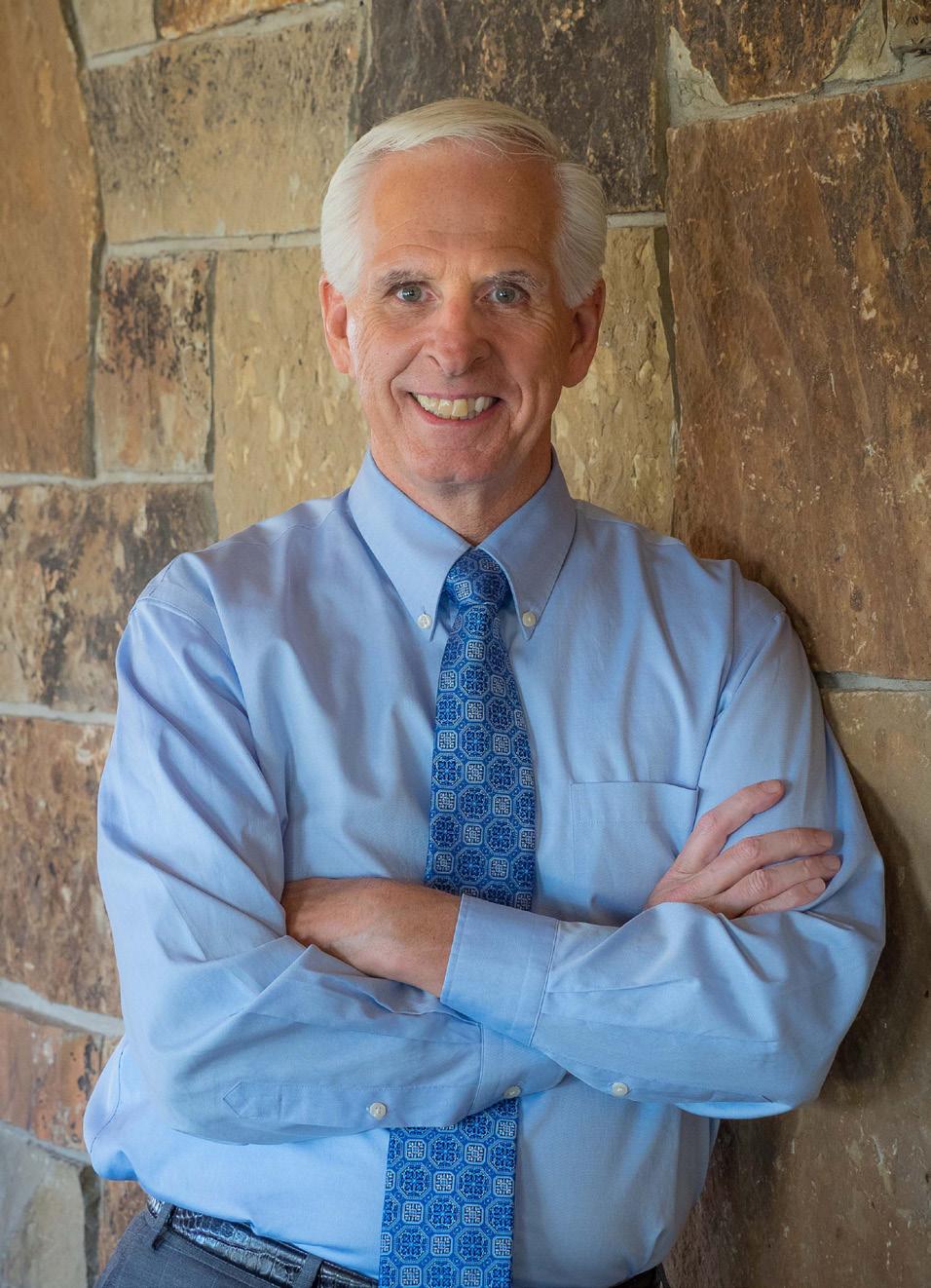
2 dixie.edu | active learning. active life.
THE PARK DATA PROJECT: Tracking Visitors to Zion and Snow Canyon Parks
 By Allison Furse, Senior, English Major, Professional & Technical Writing Emphasis, Marketing Minor
By Allison Furse, Senior, English Major, Professional & Technical Writing Emphasis, Marketing Minor
The Park Data Project is a team of faculty and students from Dixie State University and other southern Utah colleges that work in partnership with state and national parks across the country toward the betterment of visitor data collection. Jason Pitts spearheads the project with the help of several employees and student interns. His team is developing new and innovative ways to track the number of people visiting state and national parks each day. Members of the project are working tirelessly to make sure their data is as accurate and effective as possible by installing sensors at park entrances, trailheads, parking lots, and inside shuttles to track both the number of people and cars coming and going. The team has also developed both apps and web-based programs to be used by park employees to view the numbers of people in the park in real time.
The information gathered and compiled by the Park Data Project is invaluable in a variety of ways, especially amidst the ongoing coronavirus pandemic. When park officials have the ability to see real time data on an app, they can take action to ensure that the park remains safe and visitors can follow the appropriate social distancing guidelines as required by state and/ or county officials. They can also ensure that, when parking lots are full, visitors are alerted to this prior to entering the park and can avoid being turned away without enjoying the experience they came for. This data gives park officials the ability to send out alerts on social media to inform the public when the park is full, alleviating visitor stress and frustration.
One of the effects of the COVID-19 pandemic is that visitor patterns from previous years have been completely upended. According to data collected by the Park Data Project, there were several days in October 2020 where the daily attendance at Zion National Park exceeded the total number of people who visited the park in all of 2019. As a result, it has become more important than ever before for park officials to know, in real time, how many people are in the park so that they can decide how many people to staff and how to best implement safety guidelines. The Park Data Project is making these decisions possible.
The Project is also creating other services to be of use in different parks across the state. The team is currently working closely with Snow Canyon State Park to create and implement an online, app-based way for visitors to pay admission fees, limiting the time spent in person-to-person contact when entering the park. This system could revolutionize park entry across the state, and the team is hoping to take the app to many more parks in the future.
Cade Gardner is a student intern who has been working with the project since November of 2019. He is currently a senior in Software Development, and he uses his skills to enhance the project’s materials and online resources. While working with the project, Gardner has gained valuable work experience. Gardner describes working with the Park Data Project as “a neat learning experience,” and he believes the work prepared him well for his future as a software developer. Gardner says, “It is really neat to be able to see my work actually being used in the real world and at such a large scale rather than just in a classroom.”
3 Academic Report 2020 | Dixie State University
DEGREES BY COLLEGE
DSU offers 4 master's degrees, 53 bachelor's degrees, 16 associate's degrees, 44 minors, 49 certificates and 68 emphases.
SCIENCE, ENGINEERING & TECHNOLOGY HUMANITIES & SOCIAL SCIENCES BUSINESS
MASTER'S DEGREE
Accountancy
BACHELOR'S DEGREES & EMPHASES
BS Accounting
BAS Enterprise Management
BS Finance
BS Information Systems & Analytics
BS Management
Management Information Systems
BA/BS Marketing
ASSOCIATE'S DEGREES
AAS General Technology: Business
AS Management
MINORS
Accounting
Economics
Management
Marketing
ARTS
BACHELOR'S DEGREES & EMPHASES
BA/BS Art
Art Education
Entertainment/Arts/Animation
Painting/Drawing/Illustration
Photography/Digital Imaging
3-D/Sculpture/Ceramics
BFA Studio Art
Bachelor of Music in Performance
BA/BS Dance
BS Digital Film
BA/BS Music
BS Music Education
BA/BS Theatre
BA/BS Theatre Education
MINORS
Art
Art History
Dance
Music
Photography
Theatre
BACHELOR'S DEGREES & EMPHASES
BS Applied and Computational Mathematics
Actuarial Science
Data Analytics
Scientific Computing
BS Biochemistry and Molecular Biology
BS Bioinformatics
BS Biology
Biology Education
Biological Sciences
Biomedical Sciences
Natural Sciences
BS Biology with Integrated Science
BS Chemistry
BS Computer Engineering
BS Computer Science
BA/BS Design
Digital Design
Graphic Design
Interaction Design
BS Earth, Energy and Environmental Science
Geoscience
Environmental Science
BS Electrical Engineering
BS Information Technology
BA/BS Mathematics
BA/BS Mathematics Education
BS Mechanical Engineering
BS Physical Science Composite Teaching
BS Software Engineering
BAS Techonolgy Innovation
ASSOCIATE'S DEGREES & EMPHASES
AS Earth & Environmental Sciences
Geoscience
Environmental Science
AAS General Technology: Design
AAS General Tech.: Information Technology
AS Laboratory Studies
Associate of Pre-Engineering
MINORS
Biology
Biology Education
Chemistry
Chemistry Education
Computer Science
Digital Design
Geoscience
Information Tech.
Web Design & Dev.
Mathematics
Mathematics Ed. Physics
MASTER'S DEGREES
Marriage & Family Therapy
Technical Writing & Digital Rhetoric
BACHELOR'S DEGREES & EMPHASES
BA/BS Applied Sociolgy
BS Communication Studies
Applied Leadership
Health Communication
Organization & Leadership
BA/BS Criminal Justice
Criminology
Digital Defense and Security
BA/BS English
Creative Writing
English Education
Literary Studies
Professional & Technical Writing
BA/BS History
History and Social Science Teaching
BS Media Studies
Media Production
Multimedia Journalism
Public Relations
BA/BS Phychology
BA Spanish
Spanish Education
ASSOCIATE'S DEGREES
AS Criminal Justice
MINORS
American Sign Language
Communication Studies
Creative Writing
Criminology
Digital Defense and Security
English Education
General English
Global Studies
Health Psychology
History
Humanities & Philosophy
Media Studies
Nonprofit Management
Professional & Technical Writing
Psychology
Sociology
Social Justice
Spanish
4 dixie.edu | active learning. active life.
BACHELOR'S DEGREES & EMPHASES
BS Elementary Education
Bachelor of Individualized Studies
BA/BS Integrated Studies
American Sign Language Interpreter
Art Biology
Chemistry
Communication Studies
Criminal Justice
Dance
Digital Design
Digital Film Production
Earth Science
English
Family Studies and Human Development
Global Studies
Health Care Administration
History
Humanites & Philosophy
Information Technology
Long Term Care Administration Management
Marketing
Mathematical Science
Media Studies
Music Psychology
Public Health
Recreation Management
Sociology
Software Development
Spanish Theater
Web Design and Development
ASSOCIATE'S DEGREES
AAS Early Childhood Education
AA/AS Early Childhood Education
MINORS
Family Studies and Human Development
MASTER'S DEGREE
Athletic Training
BACHELOR'S DEGREES & EMPHASES
BS Dental Hygiene
BS Exercise Science
Pre-Athletic Training
Pre-Occupational Therapy
Pre-Physical Therapy
BAS Health Administration
BS Medical Laboratory Science
BS Nursing
BS Population Health
Health Care Administration
Long Term Care Administration
Public Health
BS Recreation & Sport Management
Experience Management
Corporate Recreation & Wellness
Sport Management
BS Respiratory Therapy
ASSOCIATE'S DEGREES
AAS Emergency Medical Services
AAS Medical Radiography
AAS Nursing
AAS Physical Therapist Assistant
AAS Surgical Technology
MINORS
Public Health
Health Care Administration
Long Term Care Administration
ASSOCIATE'S DEGREE
AA/AS General Studies
2D Animation
3D Animation
Accouting & Information Systems
Advanced Design
Advanced Emergency Medical Tech.
Advanced Information Technology
Applied Statistics I
Applied Statistics II
Art: Photography/Digital Imaging
Biotechnology
Community and Social Change
Computing Fundamentals
Critical Reasoning
Cryptography I
Cryptography II
Data Analytics
Design
Diversity
Emergency Medical Technician
Entrepreneurship
Ethical Judgement
General Education
Gerontology
Global Perspectives
Health Communication Information Technology
Leadership Maker
Marketing
Mediation
Media Production
Medical Lab Assistant Technology
Modeling and Simulation
Multimedia Journalism
Nurse Assistant
Paramedic
Phlebotomy
Piano Pedagogy
Professional & Career Communi-
cation
Professional Writing
Retail Management
Secondary Ed. Licensure
Social Media
Social Research Methods
Strategic Communication
Sustainability
Supply Chain Management
Tech Innovation & Entrepreneurship
Utah Math
Visual Culture and Society
Web Design & Development
5 Academic Report 2020 | Dixie State University
HEALTH
CERTIFICATES
EDUCATION
SCIENCES DIXIE STATE UNIVERSITY
& ENDORSEMENTS
UNDERGRADUATE RESEARCH AT DSU SETS STUDENTS APART
By Autumn Nuzman, Senior, English Major, Creative Writing Emphasis, Sociology Minor
At Dixie State University, students can conduct undergraduate research and have it funded through grants provided by the Undergraduate Research Office. This opportunity includes hundreds of projects ranging from how the humanities can enhance the lives and careers of medical students to research on the history of vampires in literature.
To be eligible for funding, students must have a faculty mentor involved in their research or creative project. Funding may be used for costs directly related to the project or for the costs of traveling to conferences to present the research.
“We accept proposals for funding from students once per semester,” Undergraduate Research Director Dr. Rico Del Sesto says.
Of the hundreds of students performing undergraduate research and creative activities, three were highlighted in the Undergraduate Research Office’s Fall 2020 newsletter.
DSU alumna Rachel Manuele, who double majored in English and Biology, engaged in interviews and questionnaires with the St. George medical community and the University of Utah to analyze how classes in the humanities helped enhance the lives of medical students. This project successfully combined her Honors Program research requirement and senior capstone project.
Undergraduate student Shandon Stiner developed a computer model to predict how vaccinations and spraying mosquitos would impact the transmission of the West Nile Virus to horses and presented her work to the Southwest Mosquito Abatement and Control District, at the Joint Mathematics Meeting, and at DSU’s Regional Research Symposium.

Senior English major Mary McFadden hopes to trace the gradual literary split of vampire portrayals into factions and to publish the results of her research in Curiosity, DSU’s student-run interdisciplinary research journal, as well as present her research at the Utah Conference on Undergraduate Research (UCUR).
When students are ready to present their research, they can publish their work in Curiosity, and they can present it at UCUR and DSU’s Regional Research Symposium. The Regional Research Symposium also accepts presentations of research in progress.
“We encourage our students to present their work at all stages, with the potential to have discussions about the progress and
potential directions of their projects,” Dr. Del Sesto says.
Dr. Del Sesto and Assistant Director Dr. Olga Pilkington do their best to encourage students to perform undergraduate research so students can experience the same academic growth and exploration they did when they themselves performed undergraduate research.
“For me, working alongside a faculty member and being engaged in the same practices as my professors was an ultimate recognition of my abilities, better than any A on an exam or an assignment,” Dr. Pilkington says.
Dr. Del Sesto says conducting research as an undergraduate sets students apart from peers who graduate without experiencing what it’s like to function professionally in their chosen discipline.
“Involvement in undergraduate research is an indicator not only of intellectual abilities, but also of perseverance, tenacity, and the ability to do teamwork—all valuable skills when it comes to succeeding in graduate school or on the job market,” Dr. Del Sesto says.
Dr. Del Sesto also says undergraduate research isn’t necessarily limited to the university.
“While research is often perceived to exist ‘within’ a university, our students and faculty are always looking for opportunities to collaborate with people in the region so that the research and creative activities can have impacts beyond the DSU campus and into our community,” Dr. Del Sesto says. “Anyone interested in collaborating with faculty and students, or mentoring students, is encouraged to contact our office at research@dixie.edu.”
6 dixie.edu | active learning. active life.
NEXT STOP FOR CRIMINAL JUSTICE MAJORS: Law School
By Shay Durrant, Senior, English Major, Literary Studies Emphasis, Psychology Minor
Many of DSU’s criminal justice majors move onto law school once their time at DSU is over. Two Dixie State alumni, Brooke Rawlinson and Jordan Johnson, have done just that. Rawlinson is in her second year at BYU law. She had an interesting story on why she chose criminology as her major. “I am not going to lie,” Rawlinson states, “I really love those crime TV shows!” After enrolling in DSU’s program, She fell in love with criminology. Rawlinson says her first year of law school was definitely challenging. However, She loves to
Brooke Rawlinson
learn, and has loved law school. Rawlinson is interested in child advocacy work and wants to practice that branch of law in the future.
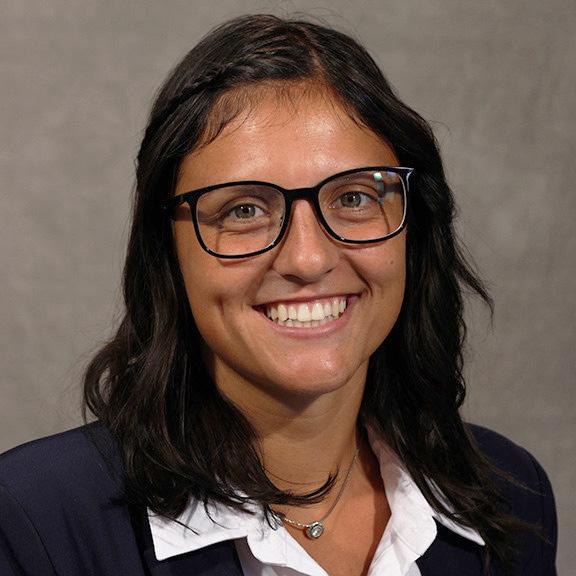
Jordan Johnson also majored in criminal justice at DSU. After DSU, Johnson graduated law school at Pepperdine University as the valedictorian. She has been practicing corporate and labor law for the past two years. Johnson says that ever since she was little, her family told her she was going to be a lawyer. She says that as soon as she got into college, she chose criminal justice for her major because she wanted something to do with the law. Johnson describes being a lawyer as the best decision she ever made. “I was always afraid of having the same day every day,” Johnson explains. She likes how every day as a lawyer brings a new set of problems to be solved.
ESPORTS CLUB: Casual and Competitive Gaming
By Samantha Roybal, Senior, English Major, Professional and Technical Writing Emphasis, Photography Minor
Dixie State University Esports is a student-led club that organizes collegiate teams to compete in major tournaments for video games such as League of Legends, Rocket League, Overwatch, Super Smash Bros, and much more. The club was created by a single student, but has grown to more than 400 members within 5 different teams. The club offers weekly meetings, tournaments, viewing events, service projects, fundraisers, and career opportunities through Gamerlink.
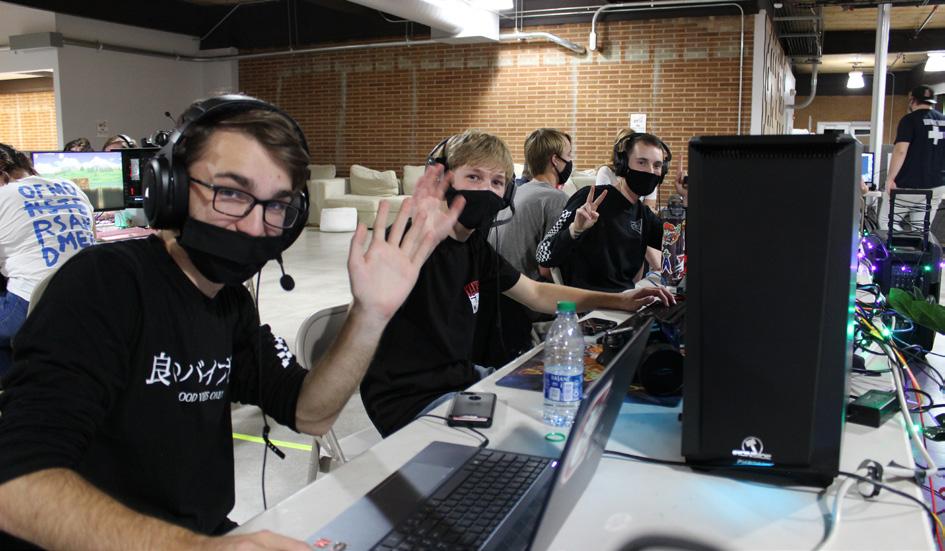
Whether participants are casual or competitive gamers, the Esports club welcomes everyone. They also welcome different types of gaming including tabletop, console, or PC. “It’s a great way to make friends and even learn more about the gaming community and the Esports industry,” says Lhea Livings, the president of the Esports club. The club comes highly recommended by club members as not only a place for social interaction, but personal growth. While reflecting on her own personal experience, Jadely Cartagena, the Overwatch leader, said “Since joining the club, I have become a part of a culture
with such tight bonds and immense dedication to an otherwise stigmatized hobby.”
Like-minded students have managed to turn a hobby into a growing success. Beyond the social aspect, the club has quite the bright future. The presidency of the club has been working to gain publicity, funding for scholarships, and an Esports arena. They are hopeful that the continued growth of the Esports club will encourage those who are passionate about video games to join.
7 Academic Report 2020 | Dixie State University
AN INTRODUCTION TO DSU’S NEW ENTERTAINMENT, ARTS, AND ANIMATION EMPHASIS
 By Samantha Roybal, Senior, English Major, Professional and Technical Writing Emphasis, Photography Minor
By Samantha Roybal, Senior, English Major, Professional and Technical Writing Emphasis, Photography Minor
The Entertainment, Arts, and Animation emphasis is the newest addition to the Dixie State University Art Department. Due to much interest and a high volume of demand from students, this program became available in Fall 2019. The program offers a general overview of 2D and 3D animation along with visual art techniques involving design, graphics, and drawing. Students can expect to engage in the hands-on creation of visual arts while also receiving the opportunity to observe artwork both on and off campus.
The curriculum will not only provide students with artistic knowledge, but with the necessary skills that may lead to a variety of future career possibilities. Art Department Chair and Associate Professor of Animation Alex Chamberlain says, “The idea is that the program should be applicable to anything students want to pursue eventually.” The education students receive from this art program may provide a career in the motion picture or video game industry along with the opportunity to continue on to graduate school.
The entertainment and arts industry is growing, making this Entertainment, Arts, and Animation program a valuable asset to the university. “The goal of the program,” explains Professor Chamberlain, “is to help students build a portfolio so that they are able to compete for jobs.” The requirements of the program will impart students with the fundamental skills of art along with an in-depth focus on the study of animation. For more information on the course curriculum and requirements, visit catalog.dixie.edu/programs/art.
A LOOK INSIDE THE CENTER FOR ADULT AND PROFESSIONAL EDUCATION
By Brooke Garceau, Senior, English Major, Professional and Technical Writing Emphasis
This year, DSU opened the Center for Adult and Professional Education. The director of the center, Chris Guymon, says their goal is to build “an inclusive adult learning culture at the University.”
Adult students are those over the age of twenty-five. They often balance careers and families with their educational pursuits. They also generally prefer active, engaging classroom experiences and career-focused curriculum.
They can access the center’s services by calling, emailing, or visiting Guymon in his office in the Administration Building.
At the Center, Guymon connects adult students with the resources they need to succeed in their unique circumstances. Academic advisors ensure that students graduate as quickly as possible, and experts at Career Services help with resumes,
interview skills, and online job profiles to secure employment.
The Center is working to expand resources. Guymon says that they are training faculty on how best to engage adult learners and working to offer more online, weekend, and condensed classes. The Center is also partnering with DSU’s Alumni Association to create an alumni networking software to help graduates connect professionally and build relationships.
The Center’s goal is to make academic resources more accessible to adult students so that they can complete their degrees. Guymon says that while pursuing an education later in life has challenges, the Center will be “serving students, recognizing the complexity of their worlds, and adding value to their lives.”
8 dixie.edu | active learning. active life.
DSU’S DENTAL HYGIENE PROGRAM: Education and Access to Care Come Together
By Yasel Avalos, Junior, English Major, Professional and Technical Writing Emphasis, Spanish Minor
The Dental Hygiene program at DSU offers vast opportunities and benefits for students and the community alike. The DSU Public Dental Hygiene Clinic serves as a front line of defense for vulnerable community members who lack the financial means to provide themselves with oral healthcare. Through the State Primary Care grant that the program applies for every year, community members are able to apply for financial assistance. This year, more than $81,000 was awarded to DSU’s Dental Hygiene program to assist the average of over 600 patients seen each year. The most exciting part is that each patient is seen by DSU’s students, who gain immediate and important real-world experience.
Presently, the entry level for those who seek dental hygiene as a profession is an associate’s degree. Department Chair of Dental Hygiene Brenda Armstrong states, “The American Dental Hygienists’ Association has advocated for entry level to be a bachelor’s degree for more than 20 years. We are proud of the fact that we offer a bachelor’s degree at Dixie State University. This provides greater opportunities for the graduate to expand their career outside of clinical care if desired.” DSU offers a B.S. in Dental Hygiene with graduates entering a workforce that has a 41% growth rate in Utah.
Dental Hygiene was founded on the basis of serving the public through aiding prevention and increasing awareness of oral disease. DSU students are doing just that with a mobile clinic for place-based care. Students can travel to places where people live or work to offer their services. Some of their collaborating populations include Root for Kids, Three Points Center, WorkForce Services, long-term care facilities, and Title I elementary schools.
Armstrong is proud of the program, stating that “The DSU Public Dental Hygiene Clinic and mobile clinic provide an educational avenue for students to learn the practice of dental hygiene as they prepare for their future careers. It is a magical place where education and access to care come together for the betterment of individuals and our community.” Anyone who goes into the Dental Hygiene program benefits immensely. The opportunities for the Department of Dental Hygiene keeps growing. Partnerships with various organizations such as
DentalCon and Southern Utah Dental Hygienists’ Association and donations from organizations such as Midmark Dental, UltraDent, Patterson Dental, and Henry Schein Dental allow the department to keep offering prestigious and accredited education to DSU students and professionals in the community.
In the spirit of growth, the Department of Dental Hygiene recently began an affiliation with the University of Utah School of Dentistry. A remodel to create a $1.1 million clinical addition and improved sterilization spaces in the Taylor Health Sciences building are in place to facilitate the joint venture. The purpose of this collaboration is twofold: 1) Dental hygiene and dental students will be learning together in the clinical setting and 2) Dental services will be expanded to some of the most vulnerable in our community. This association provides a win-win for students and the community.
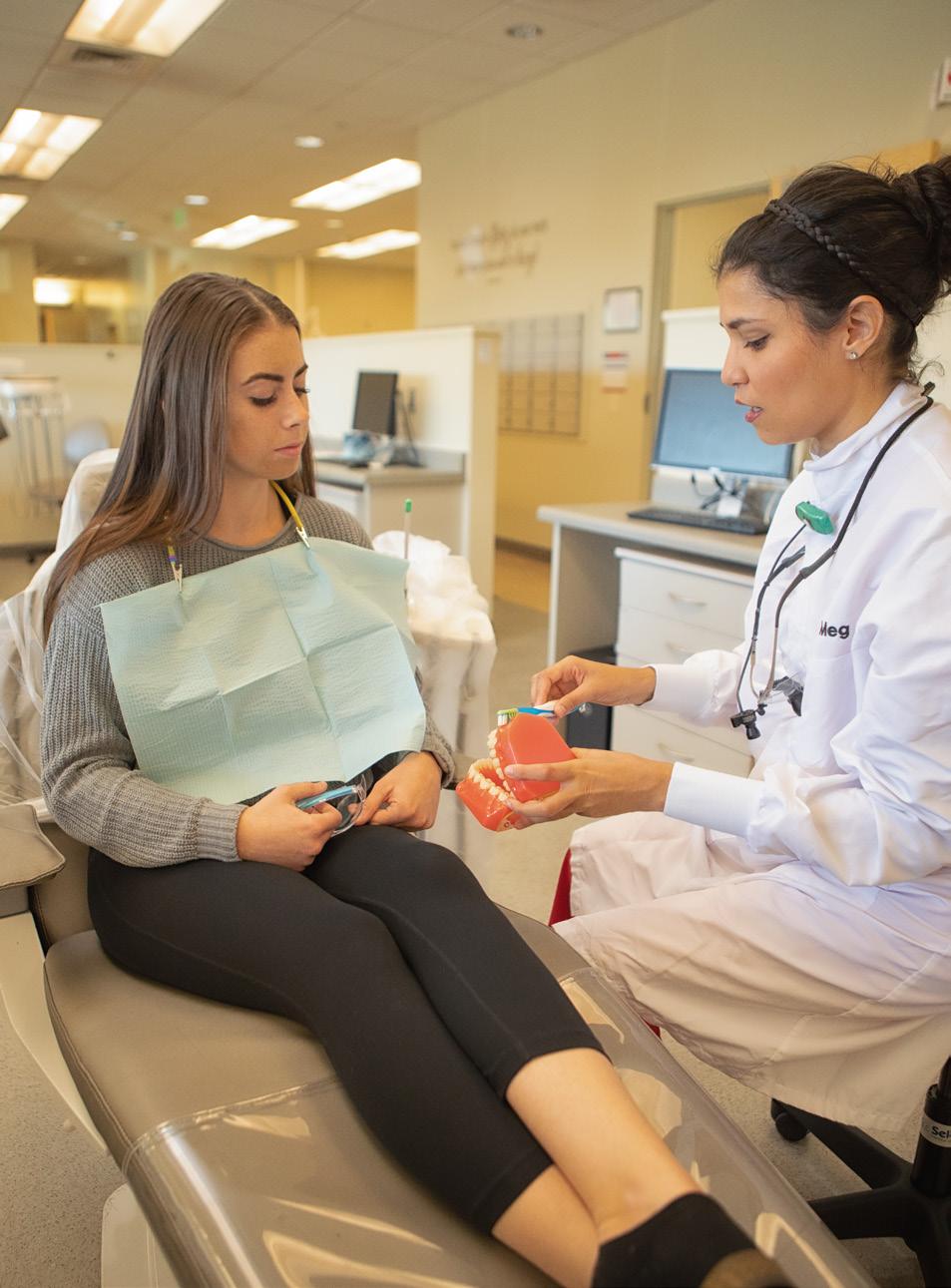
9 Academic Report 2020 | Dixie State University
STUDENTS GET HANDS-ON EXPERIENCE AT NEW ANALYTICS AND MODELING CENTER
By Spencer Soule, Senior, English Major, Creative Writing Emphasis
“The future is data and data is everywhere,” says Dr. Vinodh Chellamuthu, Assistant Professor of Mathematics and Co-Director of the new Analytics and Modeling Center for students. “The demand for professionals in the field is high, but supply is low and more students are needed.”
The modern world runs on the rapid transfer of information. Every click, every post, every episode of The Great British Baking Show viewers binge is recorded as data. But how do we interpret all those clicks and posts? What are corporations like Netflix to do with such vast quantities of information?
Students enrolled in Dixie State University’s Analytics and Information Systems program learn the skills to process and interpret that data and communicate their findings effectively in today’s job market. Students become mathematical storytellers, putting numbers in context to help businesses and other interested parties map trends and make predictions.
Experts predict that jobs in the field of analytics and information systems will increase to nearly 11 million by 2026— nearly two million new jobs per year. As more businesses rely on online interaction, especially through social media, marketing teams are collecting more data based on what users click on, upvote, and repost. But business is not the only application.
To prepare students for positions in an ever-expanding job market, Dr. Chellamuthu co-directs the new Analytics and Modeling Center with Dr. Matt Harris. In the Center, students work together as a team to apply their classroom learning to real issues in the community.
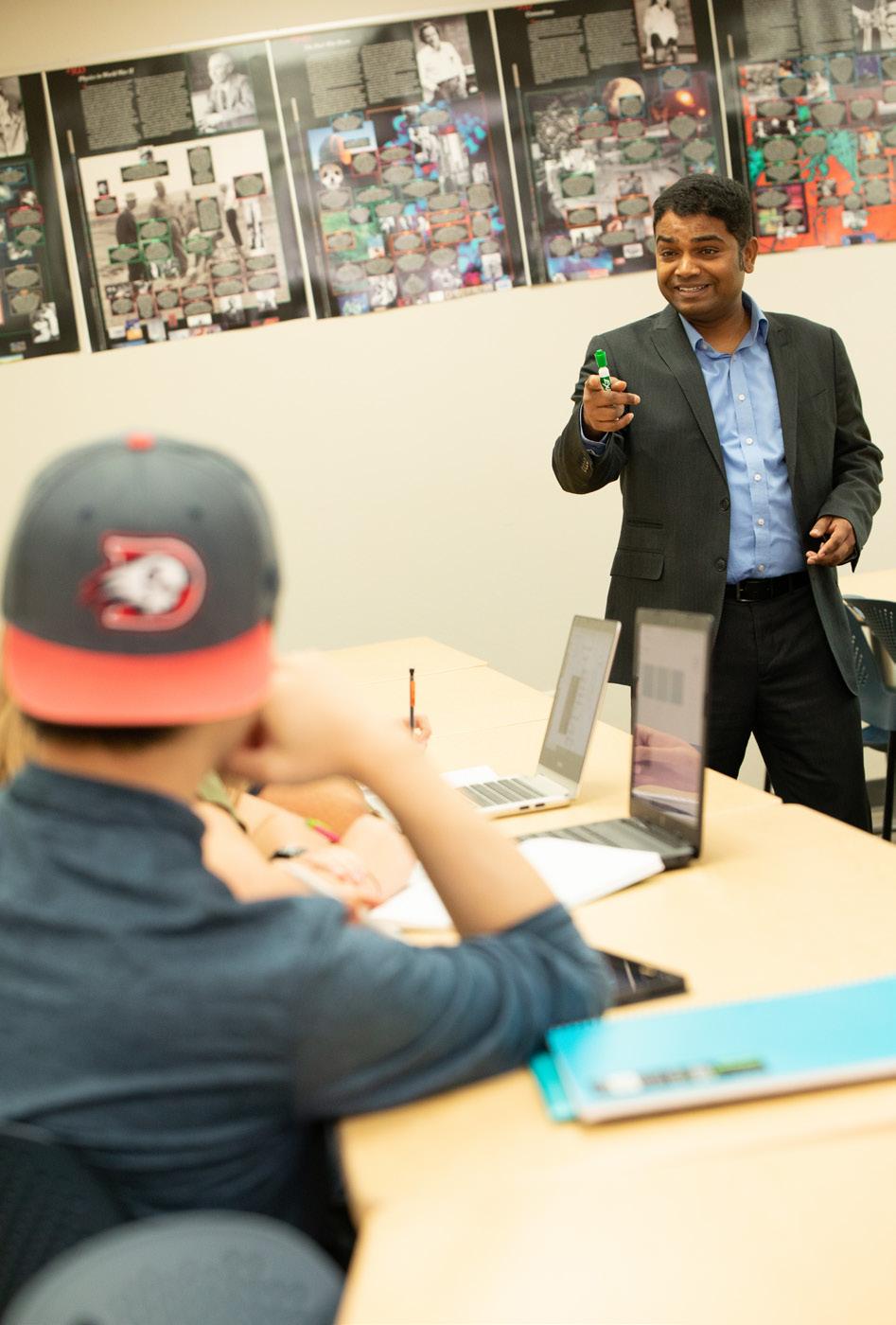
The Center represents a joint effort between Dixie State’s Math and Information Systems & Analytics programs, offering opportunities for students from separate disciplines to work together, building on each other's strengths to complete projects. “We want students to be able to say in their future job interviews: Yes, I have worked as a member of a team, collected data, combined efforts with my peers to write a report and presented it to an interested party,” says Dr. Chellamuthu, who earlier this
year was awarded the Early Career Mentoring Faculty Award for his efforts in supporting undergraduate research and mentoring students in the Analytics and Modeling Center on local realworld projects.
Recently, students in the center worked with representatives from Zion National Park to create a model predicting visitation rates to the park. “By creating a statistical model of visitation rates, we could help them better monitor crowding across the park, which affects everything from parking availability to safety measures for more dangerous hikes like Angel’s Landing,” Dr.
10 dixie.edu | active learning. active life.
Chellamuthu says. He enjoys working closely with students, helping them learn how to conduct research and interpret their findings, but finds the greatest satisfaction when students are able to move out from under his mentorship and conduct research on their own.
Among other projects, students have also had the opportunity to collect data and create control measures to curb the spread of the West Nile Virus. And as new problems arise, the Analytics and Modeling Center continues to prepare students to face them. Measures developed during the West Nile study are now being
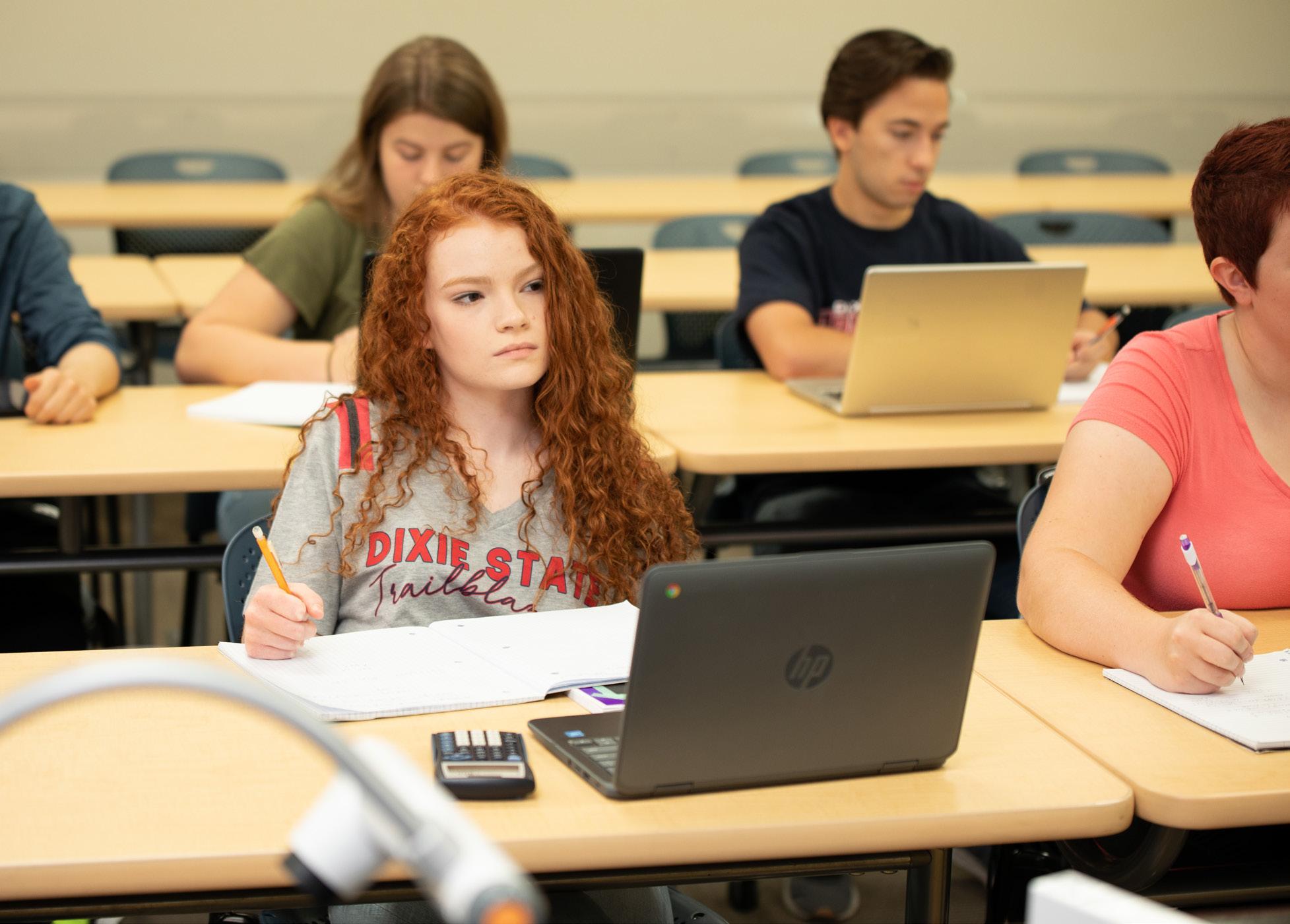
used to help track the spread of COVID-19.
“Students who have had the opportunity to not just learn the math but apply it in real life experiences will have so much more confidence as they enter the workforce,” Dr. Chellamuthu says. “To anyone who might find modeling and analytics interesting but fears mathematics I say context is what makes the numbers interesting. We want students to gain the mathematical tools to solve real world problems and get them used to being researchers in an environment that puts their skills of problem solving and investigation to work.”
11 Academic Report 2020 | Dixie State University
THE UDVAR-HAZY SCHOOL OF BUSINESS ACHIEVES CANDIDACY FOR AACSB ACCREDITATION
By Cody Tolbert, Senior, English Major, Professional and Technical Writing Emphasis
The Udvar-Hazy School of Business at Dixie State University is home to students who wish to major in Accounting, Marketing, Finance, Management, or Information Systems and Analytics. The business school is excited to announce that it now holds accreditation from the the Association to Advance Collegiate Schools of Business (AACSB). This means that DSU now joins 785 other schools from over ninety different nations with this distinction.
The AACSB accreditation means that graduates from the business school are better prepared to become industry leaders thanks in part to the education that DSU has provided them. This education comes from prestigious professors shown to be business leaders not only in this community but on a national level. These professors have molded their students to become
integral parts in our national and global economy.
This move creates the path to potential master’s degrees in the School of Business, including what could be an MBA program in the future.
KANAB CENTER: Propelling Educational Possibilities in Kane County
By Jessica Lounsbury, Junior, English Major, Secondary Education Emphasis
The Kanab Center is not part of Dixie State University's main campus; however, the Center, located in Kane County, receives the same care and attention. The Center has only been open for a year but has already facilitated massive leaps in jumpstarting Kane County's higher education goals.
This past spring, eleven students were able to participate in a CNA program funded by the Perkins Grant, and they're now fully certified nursing assistants. Director Jennifer Harrington commuted twice a week and used an interactive video system for lectures.
The driving motivation is to give the students of rural Kane County as many opportunities as the students in Washington County. Correspondingly, Associate Provost of Community & Global Engagement Dr. Nancy Hauck states, “We're offering GE certificates and several Career Technical Education (CTE) pathways, and when combining the two, it's pretty close to earning an associate degree."
The center is a state-of-the-art facility and a welcome addition to the high school. Consequently, it has generated lasting partnerships with Kane County School District and the local community. DSU has actively listened and met the needs of Kane County, including but not limited to personal interaction, career preparation, embracing local input, and consistently collaborating to give the students the best facility and instruction possible.
Concurrent enrollment is fundamental, although adults can also enroll. Additionally, combining courses with the Hurricane Center has allowed DSU to offer almost any class to Kane County.
CTE pathways allow each student to obtain, as Dr. Hauck explains, "stackable credentials that enable them to work in their desired career, in more of an entry-level, and work their way up as they get their degree finished." The main objective is to create stepping stones that take each individual as far as possible while opening up career opportunities.
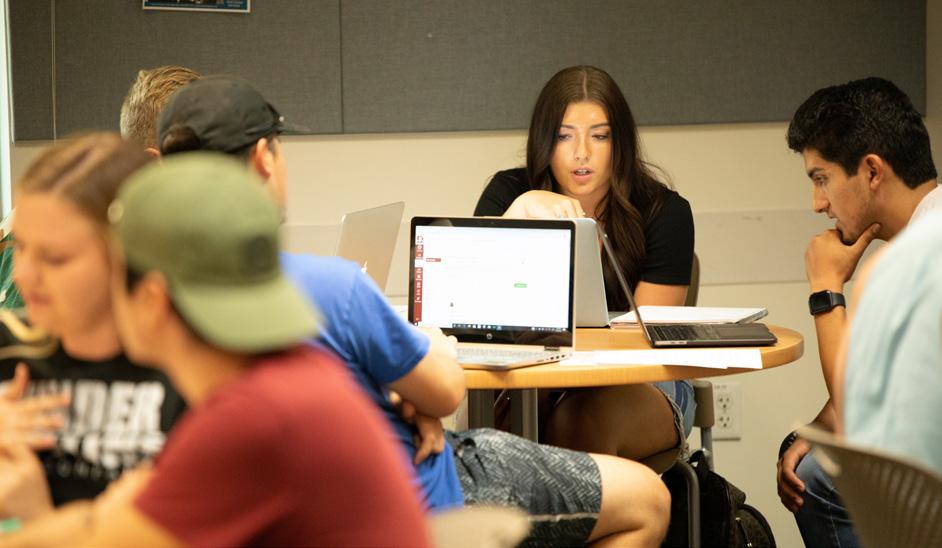
12
LYMAN GEOSCIENCES CENTER: Exploring, Expanding, and Experiencing
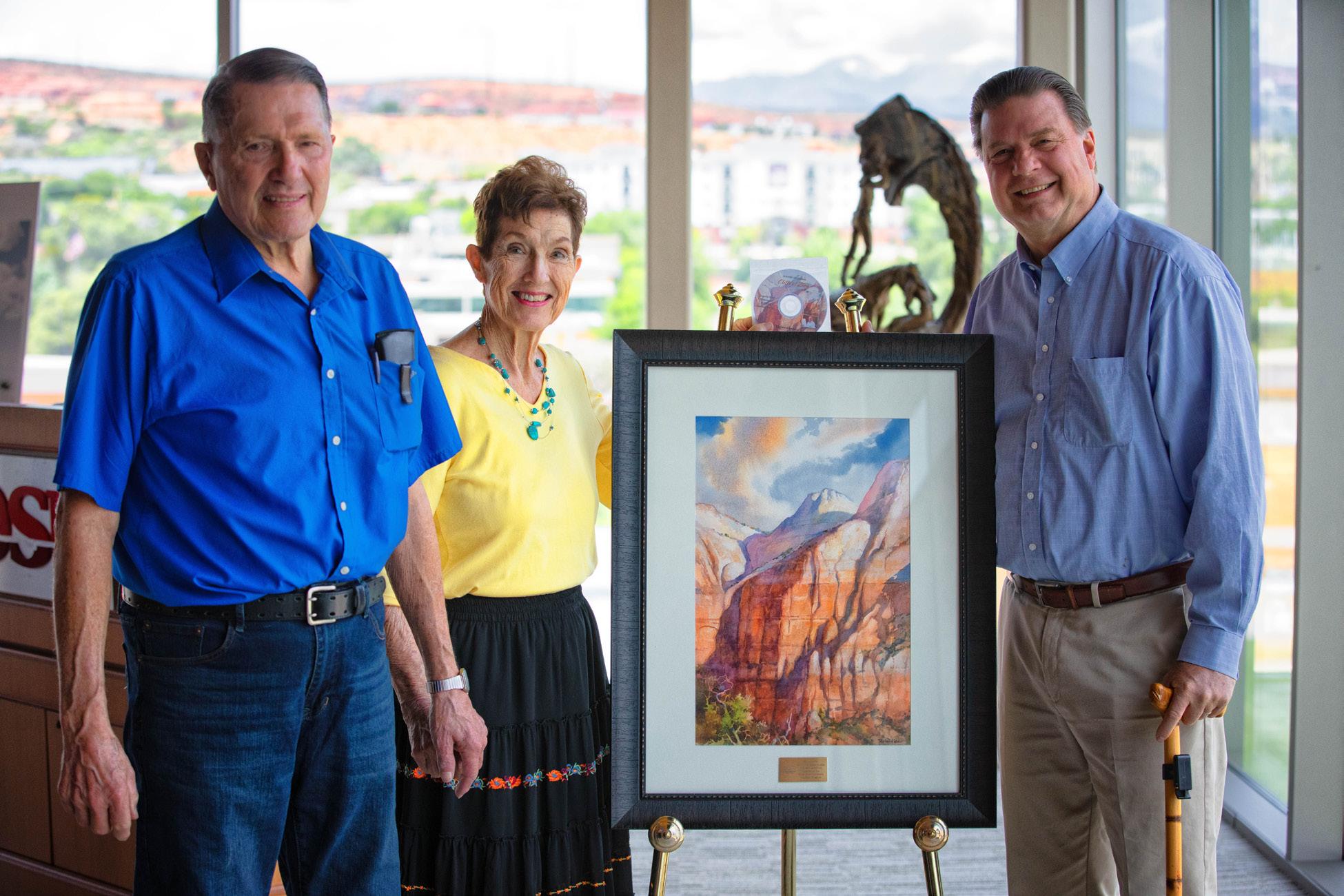 By Brooke Carpenter, Senior, English Major, Professional and Technical Writing Emphasis
By Brooke Carpenter, Senior, English Major, Professional and Technical Writing Emphasis
On the west side of Dixie State University’s campus, a large structure of steel columns and white paper with blue markings provides the skeleton of what will soon be known as the Science, Engineering & Technology building. With a generous donation of $1 million from Denis and Diane Lyman, the fifth floor of the building will be dedicated as the Lyman Geosciences Center.
The center is a contribution to the University as well as to the St. George community. “Whether you’re 2 or 102, we want to enhance the community’s perspective about the region that surrounds them," says Dr. Rico Del Sesto, Associate Professor of Chemistry and active participant in the development of the center.
The center will also pave the way for a new program: the Earth, Energy, and Environmental Science degree. Between 25-30 students are enrolled for the first year, and an additional two faculty members have been hired.
“As we grow,” says Dr. Del Sesto, “we want to protect what we have and do things in a sustainable manner.” In an area where some of the world’s greatest geological landmarks reside, the addition of the Lyman Geosciences Center presents exciting new possibilities for exploring, expanding, and experiencing the wonder of Southern Utah — a physical reinforcement of Dixie State University’s motto, “active learning. active life.”
13 Academic Report 2020 | Dixie State University
THE SOUTHERN QUILL AND THE ROUTE 7 REVIEW: DSU's Literary Publications
By Yasel Avalos, Junior, English Major, Professional and Technical Writing Emphasis, Spanish Minor
The Southern Quill (SQ) has come a long way since publishing its first literary arts journal, such as acquiring its own ISSN and hosting an annual benefit reading and silent auction. At first, SQ only took in work from DSU students and staff. Now, the journal is also accepting work from residents of Arizona, Colorado, Idaho, Nevada, New Mexico, Utah, and Wyoming. Opening the journal to western states will increase the number and quality of submissions the journal receives as well as expanding readership, thus elevating the journal’s visibility and stature within the region. Residents of these states, excluding Utah, will pay a $3 fee to submit their work. Dr. Cindy King, faculty supervisor of SQ, seeks to use these funds for distribution and advertising budgets, allowing the journal to reach more potential contributors and readers. She says, “With these changes comes an increase
in hands-on, real-world work experience for our students, who I believe will graduate from DSU fully prepared to enter the workforce.”
Route 7 Review (R7R), an online literary arts publication, serves a worldwide audience through its website. Just like SQ, R7R has gained its ISSN, further legitimizing the publication. Dr. Olga Pilkington, faculty supervisor for R7R, believes in eliminating any barriers for submitters; thus, there are no submission fees. Dr. Pilkington says, “As DSU moves toward becoming an open university, it is paramount that the costs of publication fall on the institution and not on the potential authors.” To flourish, Dr. Pilkington says, R7R must “attract talented, visionary, and devoted student editors.”
CURIOSITY: DSU’s First Refereed Interdisciplinary Journal
By Emily Mildenhall, Senior, English Major, Professional and Technical Writing Emphasis, Communication Studies Minor
In January 2020, Dixie State University launched its first ever peer-reviewed academic journal with sponsorship from the Provost’s Office and the Office of Undergraduate Research. The journal, Curiosity: Interdisciplinary Journal of Research and Innovation, is managed by Dr. Olga Pilkington as editor-in-chief. Dr. Pilkington says, “The journal serves as an outlet for graduates and undergraduates to publish their work in a low-stress, in-house environment without fear of disparaging peer reviews.”
Curiosity’s name comes from American author and anthropologist Zora Neale Hurston, who wrote, “Research is formalized curiosity. It is poking and prying with a purpose. It is a seeking that he who wishes may know the cosmic secrets of the world and they that dwell therein.”
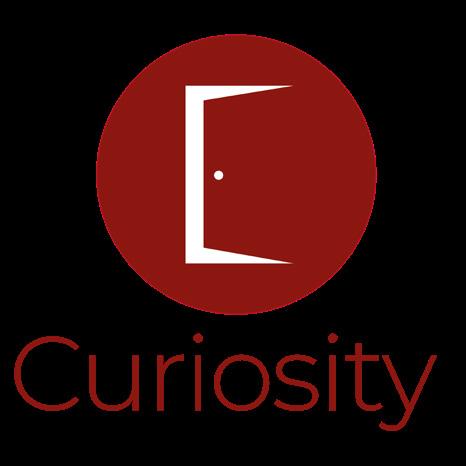
What makes the journal particularly unique is that its editorial board consists of undergraduate students in the Digital Journal Production course offered during spring semesters with Dr. Pilkington (although a few students also interned over the summer to accommodate the year-round publishing schedule).
Curiosity has been featured in Scholastica Blog because of its uniqueness of having students, rather than faculty members, as editors. One of the undergraduates that took the course and interned for the journal over the summer Benjamin Miklautsch says, “I think I got a lot of good practice with client relations as well as project management. Although I did proofread the papers assigned to me, the class was much more about collaboration with outside contributors. I enjoyed being able to get my name out there, and I was proud to be a part of something being published on campus.”
Curiosity has received and published submissions from humanities, social sciences, and STEM departments, including one article from a Weber State student graduate.
14 dixie.edu | active learning. active life.
DSU’S INAUGURAL CONDUCTING SYMPOSIUM
By Rebecca Goates, Senior, Integrated Studies Major, Dance and English Areas
The DSU Music Department hosted its inaugural Conducting Symposium, led by Dr. Bryant Smith. While focused primarily on professional educators, DSU students took an active role in the success of this event. Cassey Flinders and Mattina Reep, as student leaders, oversaw logistics during the two-day event including managing equipment, erecting learning spaces, and instructing student workers.
The DSU Symphonic Band volunteered three hours of their time to perform and allowed 18 professional educators to conduct sessions. These educators were then critiqued by two worldrenowned visiting clinicians: Dr. Richard Mayne, Emeritus Associate Director of Bands from the University of Northern Colorado and Dr. David Fullmer, West Regional Educational
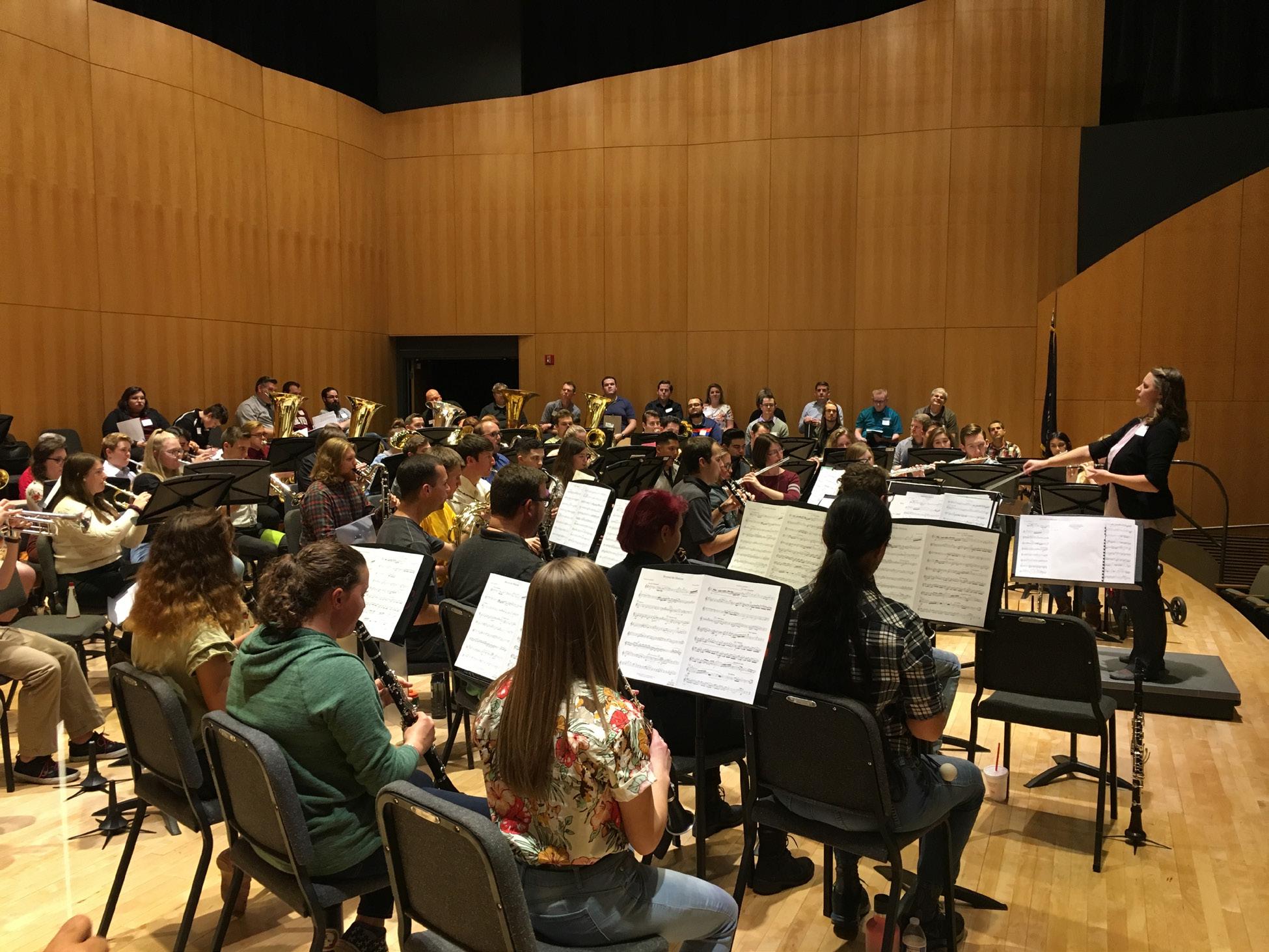
of Emphasis, Honors Program
Support Manager for Conn-Selmer Inc. Dr. Mayne and Dr. Fuller gave recommendations to enhance the participants’ conducting skills.
Band students then played again, responding to the changed techniques. The students commented that this experience changed how they viewed performing music and their understanding of a music conductor’s role. Several students, Cassey Flinders, Mattina Reep, Dylan Fizer, and Shandon Lewis, also volunteered to conduct the band and be given feedback by the clinicians. The clinicians praised them for having the courage and preparation to actively conduct and learn, as university students, at a conference designed for professionals.
15 Academic Report 2020 | Dixie State University
ESL AND GLOBAL EDUCATION: Partnering in Peru
 By Samantha Roybal, Senior, English Major, Professional and Technical Writing Emphasis, Photography Minor
By Samantha Roybal, Senior, English Major, Professional and Technical Writing Emphasis, Photography Minor
The English as a Second Language (ESL) program at Dixie State University has partnered with the DSU Global Education program in recent years. The director of this program, Luis Arevalo, has since formed an addition to the program known as Global Engagement Partnerships. These partnerships entail an agreement between the ESL faculty and international universities. It was more than three years ago when the ESL faculty partnered with Global Education to redo the English teaching program at Uladech University in Peru. The partnership with this particular university is a 5-year contract, and at least once a year, 1–2 faculty members go to Peru to conduct teacher training. The ESL faculty typically educates the teachers by developing the curriculum, producing materials, and conducting teacher training workshops. The workshops will often last several hours over the course of 4–5 days. During these workshops, the teachers learn how to use materials effectively, how to teach reading and writing skills, and how to manage a classroom.
ESL faculty members often meet more than 30 teachers in a single visit. These teachers come from all over Peru in order to attend the training. ESL Associate Professor and Coordinator Scott Miles says, “It has been a good collaboration, and we have really enjoyed working with them. We are impressed with their
active participation and how much they want to improve their teaching.” Faculty members have had the opportunity to travel to Peru three times so far. The most recent workshop was held online due to the COVID-19 pandemic, but the ESL faculty hopes to be able to return to Peru soon.
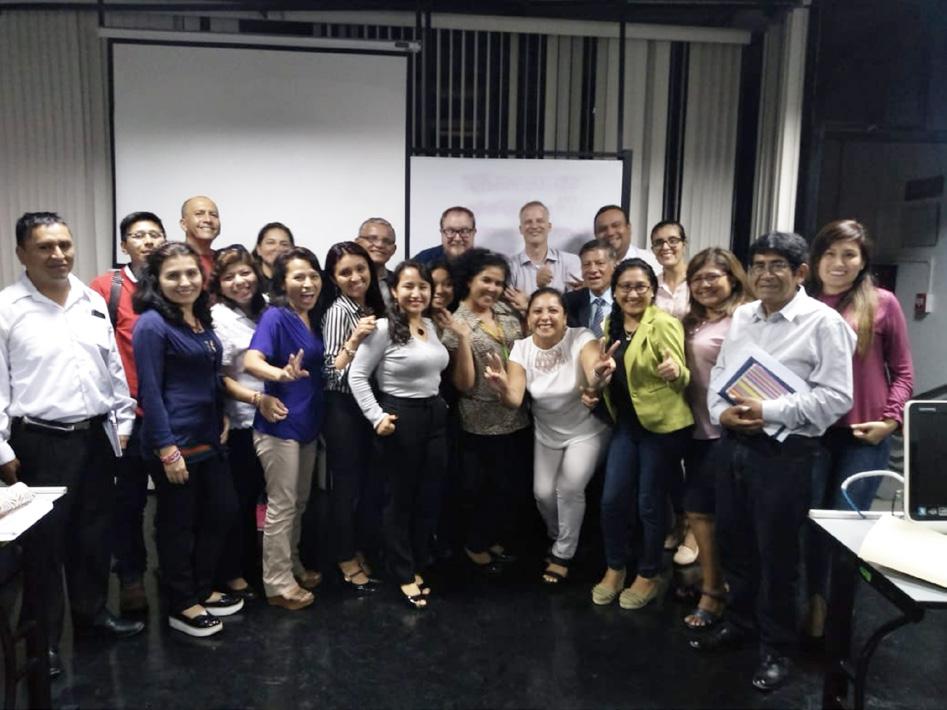
16 dixie.edu | active learning. active life.
DSU’S INSTITUTE FOR SOCIAL RESEARCH
By Emily Mildenhall, Senior, English Major, Professional and Technical Writing Emphasis, Communication Studies Minor
The Institute for Social Research (ISR) was created only three years ago, but it has made great progress in a short time. DSU faculty Dr. Robert Oxley and Dr. Matthew Smith-Lahrman developed the ISR to give students from all disciplines real-world experience to pair with their academic training.
Dr. Oxley says the first study looked at single, full-time, female DSU students who had a three- or four-year-old. The team asked, “What did she encounter? What kind of expenses did she have?” The following spring, the ISR team analyzed two hypothetical 18-year-olds to examine the experiences and challenges of firsttime freshmen at DSU. The ISR team’s latest case study “A New Era: Teaching and Accepting of Burnout in a Techno-Reliant Society" focuses on the question of whether society is teaching, or even encouraging, burnout as a condition to being successful.
The ISR team administered two surveys over the 20192020 academic year to measure the quality of life for the DSU community, distributing one survey to students and one to faculty and administration.
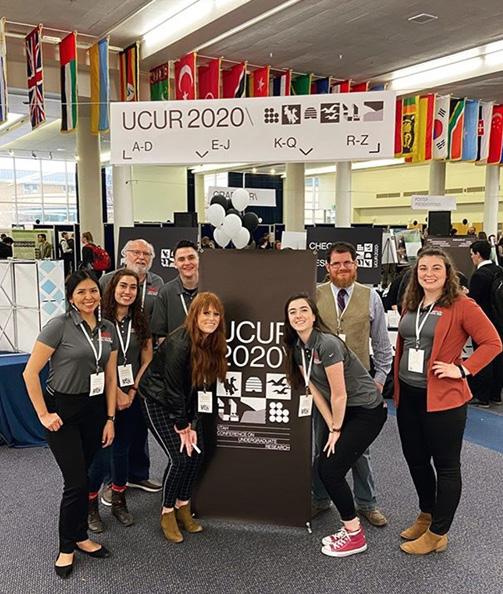
GO BABY GO: Toy Cars Become Powered Wheelchairs to Help Children Move
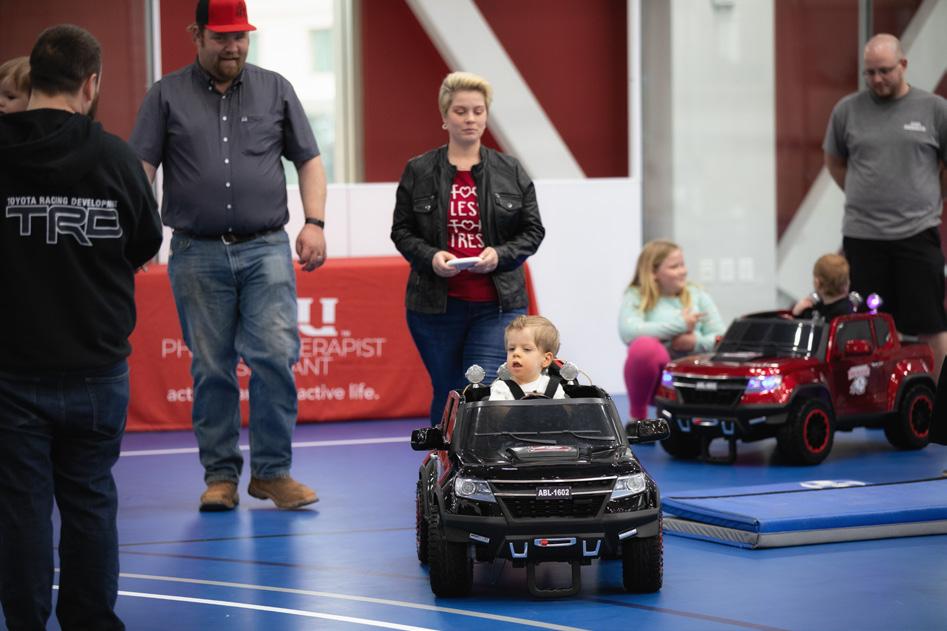 By Denali Lathrop, Senior, English Major, Creative Writing Emphasis
By Denali Lathrop, Senior, English Major, Creative Writing Emphasis
April 2020 marked the first time that Dixie State University’s Physical Therapist Assistant (PTA) Program participated in the Go Baby Go Program. Dr. Burke Jorgensen, part-time faculty member and full-time pediatric physical therapist, was an integral part of the program. Jorgensen worked with Drew Wilcox, the Department Chair of Healthcare Diagnostics and Therapeutics, and Nicole Schneider, an Assistant Professor in the Physical Therapy Assistant Program.
PTA students adapted toy cars to allow independence and mobility to children with disabilities. The toy cars were converted to function as powered wheelchairs. Schneider explains that the “cars are adapted for the children to activate the trigger switch with other body parts, rather than their non-mobile lower
The team presented their findings at the Utah Conference for Undergraduate Research, Dixie’s Regional Symposium, and the MidSouth Sociological Association Annual Conference. The ISR teams’ studies were published in DSU Institute for Social Research: Quality of Life Initiative, so each member is a published author.
ISR Coordinator Pamela Holiday says, “The ISR has also given us the opportunity to network and experience presenting our research at national and state and local conferences. We are exposed to other professionals and students, and we make connections and build relationships. Being able to come to present and participate and attend these conferences has been an amazing experience.”
extremities, to propel the vehicle.” Remote control panels were built into the cars as well, so parents could take control if needed. Students in the PTA program taught children in need how to use these powered wheelchairs and provided a positive impact on the children’s futures. Eight cars were provided to the PTA program through a community engagement grant. Although this was only the first time that Dixie State University’s Physical Therapist Assistant Program participated in the Go Baby Go program, it will likely not be the last.
17 Academic Report 2020 | Dixie State University
THE INTERNATIONAL REPUTATIONS OF THE ART DEPARTMENT FACULTY
By Abbigail Earl, Senior, English Major, Creative Writing Emphasis, Art Minor
Dixie State University’s Art Department has dedicated faculty who go above and beyond teaching students the fundamentals of becoming an artist. They are practitioners as well as teachers, and their current collective work is always being placed in art shows, installations, and exhibits to be purchased or viewed nationally and internationally.
Faculty members each have their own style of presenting their art, which helps shape students’ experience and exposure to different types of expertise in each mode of art.
Art Professor Del Parson is internationally known as a figure painter, largely because of his religious depictions of Jesus. He says, “Because of my experience with every kind of painting style, I can help my students in whatever mode of painting they desire to learn.”
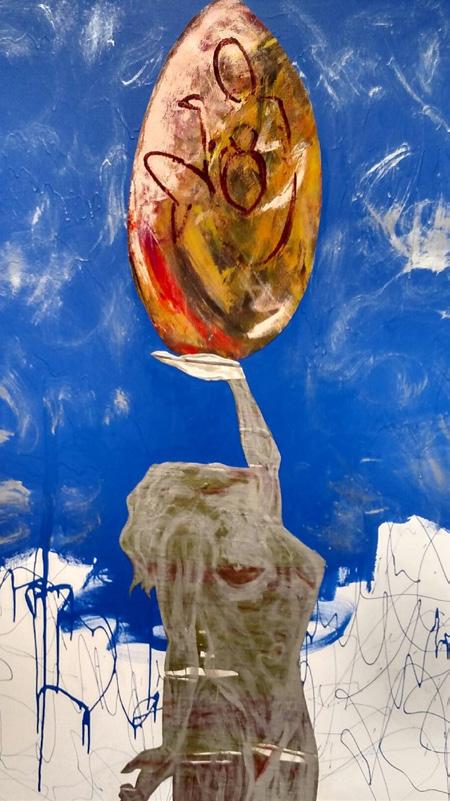
Professor Parson puts a painting in the Dixie Invitational every year, along with an additional painting or two in galleries across the nation. His success as a painter enables his students to come to him with questions about life as a painter.
Glen Blakley’s skill in ceramics makes him a great teacher. His pots are all over the world; he has received several awards and distinguished titles over the course of his long career as a ceramicist. He says, “I think [my success] has kept my interest really high in ceramics… and I think that keeps it fresh
for the students.”
This year marks Professor Blakley’s 44th year teaching at DSU, and currently, he is the senior faculty member on campus. McGarren Flack, who has taught at DSU for the past 8 years, does figure painting about emotional memory. He works as an EMT part-time and paints re-creations of scenes that he has come across. In the last 3 years, his work has appeared in 40 national and international shows. He says, “My goal as a teacher is to help my students become professionals before they even graduate.”
Alex Chamberlain is famous mainly for his work in filmmaking, but for the past 10 years, he has shifted to photography. He has been sponsored by backpacking wildlife companies, and his photos have been published in the St. George News , and other publications. He says, “When students are involved in experimentation… especially something that you’re keenly interested in, the quality, engagement, and instruction goes up in the classroom.”
Professor Chamberlain strives for growth in his teaching. He has taught at DSU for 8 years and currently acts as the Art Department chair.
Shane Christiansen’s work is popular in the ceramic world. He is active in getting his work out through exhibiting, research, developing, or presenting. Currently, he has two teapots being
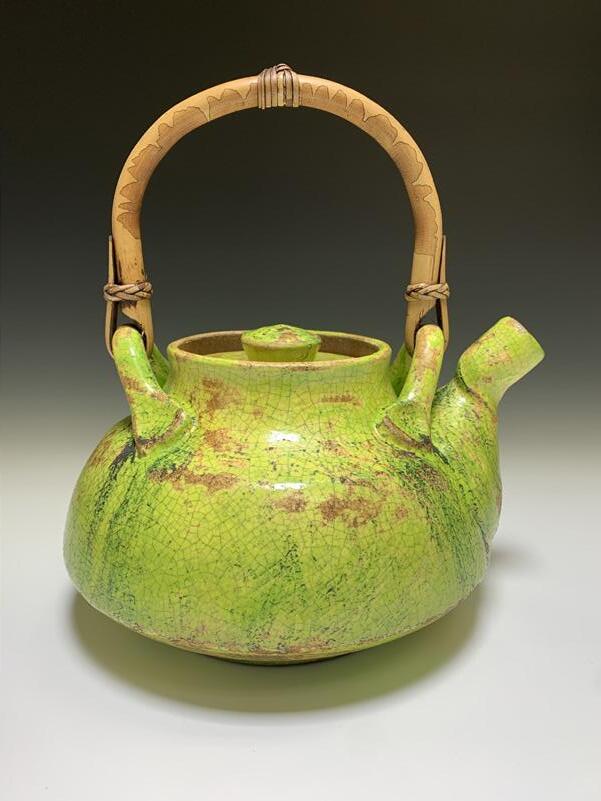
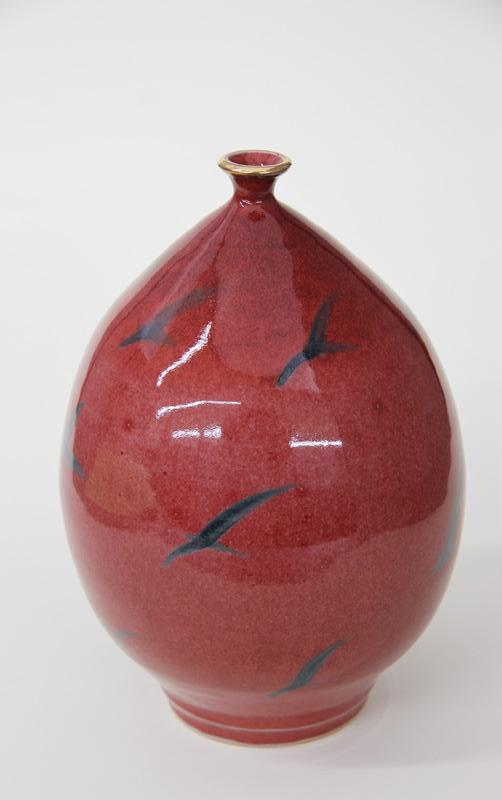
18 dixie.edu | active learning. active life.
Red Pot with Birds - Glen Blakley
Green Pot - Shane Christiansen
The Human Touch - Dennis Martinez
exhibited with Artlink in Indiana. He has been to Korea 3 times for conferences. He says he feels that his success “gives me connections that help my students.” His exposure to other ceramicists means his students will not be limited to only his techniques.
Professor Dennis Martinez has taught at DSU for 26 years. He focuses on mixed media artworks. He considers himself a painter and an installation artist. Currently, he has an installation at the St. George Art Museum. He says, “I can’t stay stagnant; I have to keep a tie with the art world.”


For Mollie Hosmer-Dillard, Fall 2020 was her first semester teaching at DSU. She is an emerging artist who has shown and sold her paintings in Berlin, New York City, and Providence, Rhode Island. Her experience gives her a broad background in painting, and this helps her students understand what options they have as emerging artists. She says, “As a teacher here at DSU, I’m trying to give my students an insight into a much bigger picture of art history.”


19 Academic Report 2020 | Dixie State University
Mind in Two - McGarren Flack
Lost Lamb - Del Parson
Summer Arc to Autumn - Mollie Hosmer-Dillard
Neighbor Rising - Alex Chamberlain
ENSURING STUDENT SUCCESS THROUGH QUALITY INSTRUCTION: The ACUE Program
By Rebecca Goates, Senior, Integrated Studies
Major, Dance and English Areas of Emphasis, Honors Program
Last year, DSU established a partnership with the Association of Colleges and University Educators (ACUE) to ensure student success through quality instruction. ACUE is the nation’s leading provider of professional development to higher education. ACUE’s mission is student success through quality instruction. Through innovative online courses, ACUE prepares and credentials faculty in evidence-based teaching practices. ACUE’s standards-based approach leads to the only nationally recognized Certificate in Effective Instruction endorsed by the American Council on Education (ACE). Numerous, independently validated studies confirm that students learn more, more equitably, when taught by ACUE-credentialed educators.
In partnership with ACUE last year, thirty full-time faculty members completed a nine-month long course entitled “Effective Teaching Practices” in which they used evidence-based teaching
practices to promote active student learning, persistence to graduation, career readiness, and deeper levels of learning. In order to complete the course, faculty members had to master twenty-five modules and apply what they learned in the courses they teach here at DSU. Faculty were evaluated by an external evaluator to determine if they achieved mastery.
All 30 faculty members who were enrolled completed the course, despite all the challenges with COVID-19, and were recognized as one of the few cohorts from universities in the country that achieved a 100% course completion rate. The group consisted of twenty-one new faculty, five second-year faculty, and four current faculty members teaching high-enrollment courses. This year, thirty faculty have enrolled in and are projected to complete the course by May 2021.
NEW DEGREES ADDED IN ELECTRICAL ENGINEERING AND COMPUTER ENGINEERING
By Rebecca Goates, Senior, Integrated Studies Major, Dance and English Areas of Emphasis, Honors Program
The Engineering Department has expanded its degree offerings with the addition of two new Bachelor’s degrees: Electrical Engineering (EE) and Computer Engineering (CE). The EE program builds upon the department’s mechatronics-focused Mechanical Engineering program by providing coursework in power systems, electromagnetics, and semiconductor devices. The CE program additionally brings embedded systems and machine learning training to the table. While EE is more hardware oriented, CE is best described as a cross between EE and computer science because the focus is equal parts on hardware and software. Both programs provide students with a plethora of hands-on learning experiences in the form of lab training, design projects, and research opportunities. The courses in the programs are being phased in starting with sophomore courses in Fall 2020,
junior courses in Fall 2021, and senior courses in Fall 2022. The first cohort of students is scheduled to graduate in Spring 2023.
The Engineering Department will be moving into the new Science, Engineering & Technology building in Summer 2021. The approximately 124,000 square-foot building sports 6 engineering labs located on the 1st, 2nd, and 5th floors. The labs will provide space for students to work on design projects and experience engineering through applied learning. With the recently announced polytechnic direction of the university, DSU is focused on building high-quality STEM programs. Students looking for an engineering education filled with industry-relevant training, research opportunities, lab courses, and design projects should check out the DSU Engineering Department.
20 dixie.edu | active learning. active life.
DSU’S ELEMENTARY EDUCATION PROGRAM GAINS NATIONAL RECOGNITION
By Samantha Roybal, Senior, English Major, Professional and Technical Writing Emphasis, Photography Minor
Dixie State University’s Elementary Education program has again been named one of the top programs in the nation for its early reading instruction. DSU first gained an A+ ranking from the National Council on Teacher Quality (NCTQ) in 2016, and the program continues to be recognized on a national level. Dr. Angela Child, Associate Professor in the College of Education, says, “This recognition means a great deal to our small program. I feel very excited that we can do things that are being recognized alongside much larger and more well-known universities across the nation.”
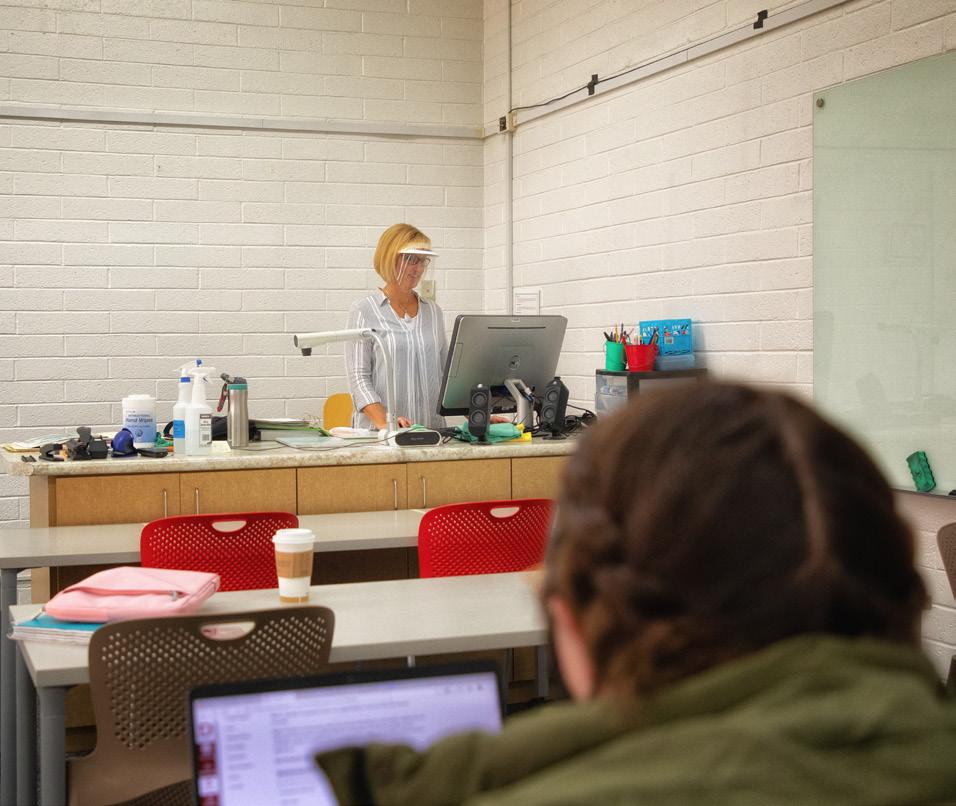
This bachelor’s degree teacher preparation program provides certification to teach in grades K–6 and an ESL endorsement. Students are typically a part of the program for two years. The curriculum provides a very hands-on experience for the students, as they are able to observe and practice teaching methods within Washington County School District classrooms. This hands-on experience prepares them for student teaching during their last semester. Student teaching presents an especially useful opportunity because students get to teach for the majority of the day.
Research-based instructional strategies are notably the main reason DSU achieved national recognition. Some of the
practices taught to the students include comprehension strategy instruction, explicit phonics instruction, meaningful vocabulary instruction, metacognition, and text-based component instruction. Reading components are a primary area of focus for the students. Students learn what reading components are and how to teach them effectively. Comprehension and writing, early literacy foundations, fluency, phonics and phonemic awareness, and vocabulary are all significant reading components included within the program.
The teaching of Response to Intervention (RTI) and Multiple Systems of Support (MTSS) are other vital elements within the program. Dr. Child explains, “I make sure to include these in my literacy course and provide a broad understanding of what those structures are, and how to run them within [a] school or classroom to improve student learning.” RTI and MTSS are both processes used by educators to support and help students so that they may succeed. It is these methods, along with the other practicum-based strategies, that has allowed DSU to become one of the only 15 undergraduate elementary education programs to receive a recognition of this caliber.
NCTQ is committed to ensuring there are education programs available that offer quality methods and results. They have declared only 27% of early education programs worthy of an A+ ranking. DSU’s program is one of them and is a part of the daily battle against illiteracy. The effective curriculum, hands-on experiences, and mentorship from experienced educators has aided DSU in creating qualified teachers that have received the proper education necessary to succeed. Dr. Brenda Sabey, Dean of the College of Education, says, “The efforts of the Department of Education are evident in the high completion and high placement rates of our graduates. Principals want our graduates in their schools.” DSU is making such a significant difference within the world of elementary education and early reading instruction. This recognition acknowledges all of the hard work of the elementary education department, and it is an exceptional honor to all those that have been dedicated to improving the program.
21 Academic Report 2020 | Dixie State University
FOUR GRADUATE DEGREES NOW AVAILABLE AT DSU
By Rebecca Goates, Senior, Integrated Studies Major, Dance and English Areas of Emphasis, Honors Program
Dixie State University offers four graduate programs: Master of Athletic Training, Master of Marriage and Family Therapy, Master of Accountancy, and Master of Technical Writing & Digital Rhetoric.
This is the inaugural year of the Athletic Training Master's program, which is a six-semester, two-year program that prepares students for a board of certification exam and licensure as athletic trainers. Using the cohort model, this program accepts up to 20 students a year and begins in the summer term. Currently working toward accreditation, this program has two faculty, Dr. Peter Neibert, (Program Director) and Dr. Dillon Hyland, a 1,300 square-foot lab, and support from DSU President Richard B. Williams, who is an athletic trainer himself. Employment of athletic trainers is projected to grow 16 percent from 2019 to 2029, much faster than the average for all occupations. Athletic trainers are hired in traditional and non traditional areas such as Delta Airlines, the military, Cirque du Soleil, and physicians’ practices to help prevent, assess, and treat injuries.
The DSU Marriage and Family Therapy program was designed to prepare students for clinical careers in marriage and family therapy. These degrees can be applied in various positions including working in private practice, clinics, behavioral health, or other mental health settings. Students will be prepared with the basic academic and clinical practice for Utah state licensure as a
marriage and family therapist, for clinical membership with the American Association for Marriage and Family Therapy, and to take the national licensing exam. DSU is currently working toward seeking accreditation with the Commission on Accreditation for Marriage and Family Therapy Education.
DSU’s Master of Accountancy Program, the first graduate program offered at DSU, was created to provide for industry needs. The curriculum has been structured to prepare students for the CPA exam and a career in accounting. Both CPA and CMA certifications are offered through this program. Career opportunities range from public accounting and academia to financial analyst and CFO. Another goal of the program is to develop a differentiation in the market and help fill job needs locally. The course work is designed to give students conceptual, technical, analytical, and communications skills required for working in the accounting and tax professions. Students are also encouraged to enhance their understanding of available careers and to implement their knowledge with moral reasoning, confidentiality, and integrity.
The Technical Writing & Digital Rhetoric (TWDR) Master of Arts program is in its second year and will see its first graduates in May 2021. TWDR faculty are dedicated to offering students a humanistic approach to communicating effectively in technical

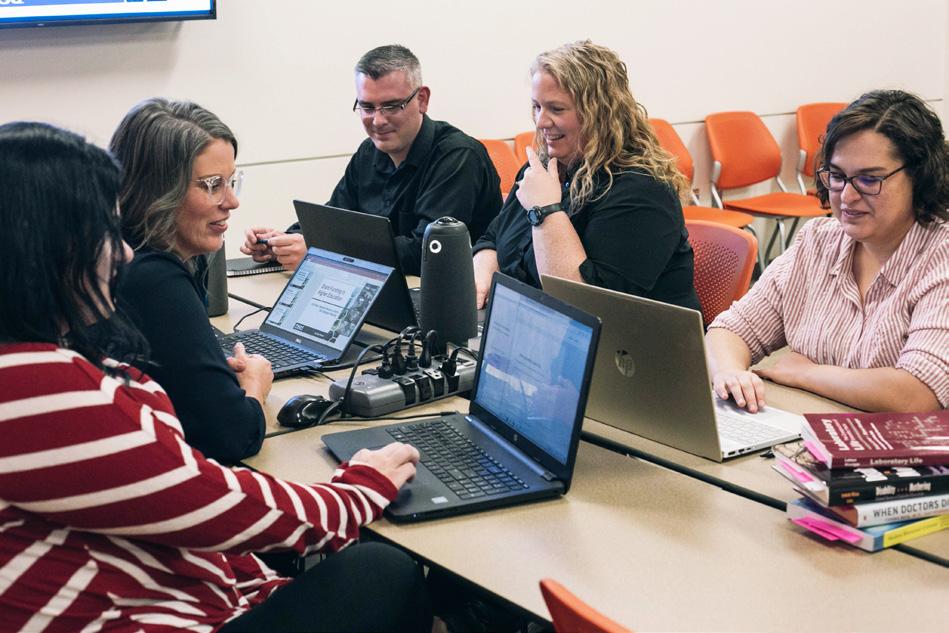
22 dixie.edu | active learning. active life.
and digital spaces. The strength of the program is its flexibility. Students adapt the curriculum to their personal interests and goals and work on extended projects across courses. Furthermore, students can complete the program on campus or remotely. The TWDR Coordinator Dr. Joy McMurrin says, “We have an amazing group of diverse students, which makes thinking through the theories and questions of our field particularly interesting. If they all had similar talents and goals, we wouldn’t have the opportunity to approach problems from different perspectives.” In addition to the coursework, students have taught composition courses, delivered conference presentations, started successful internships, made substantial changes in their workplaces, and moved into better positions of employment. Dr. McMurrin says, “We could not be more pleased with all our students have achieved. And they’re just getting started.”
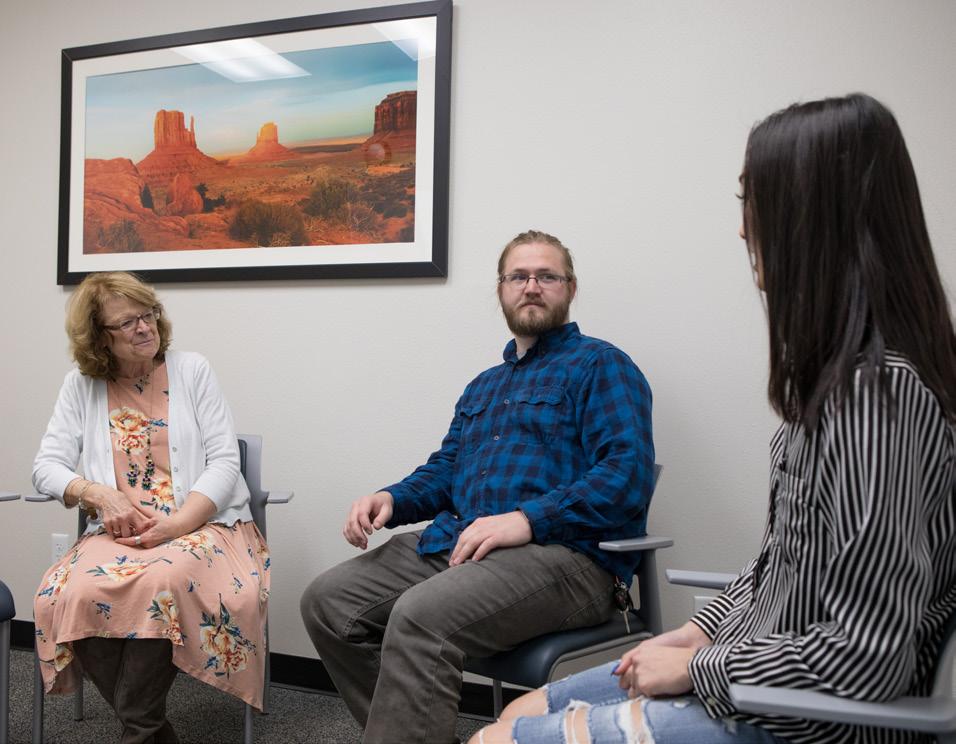
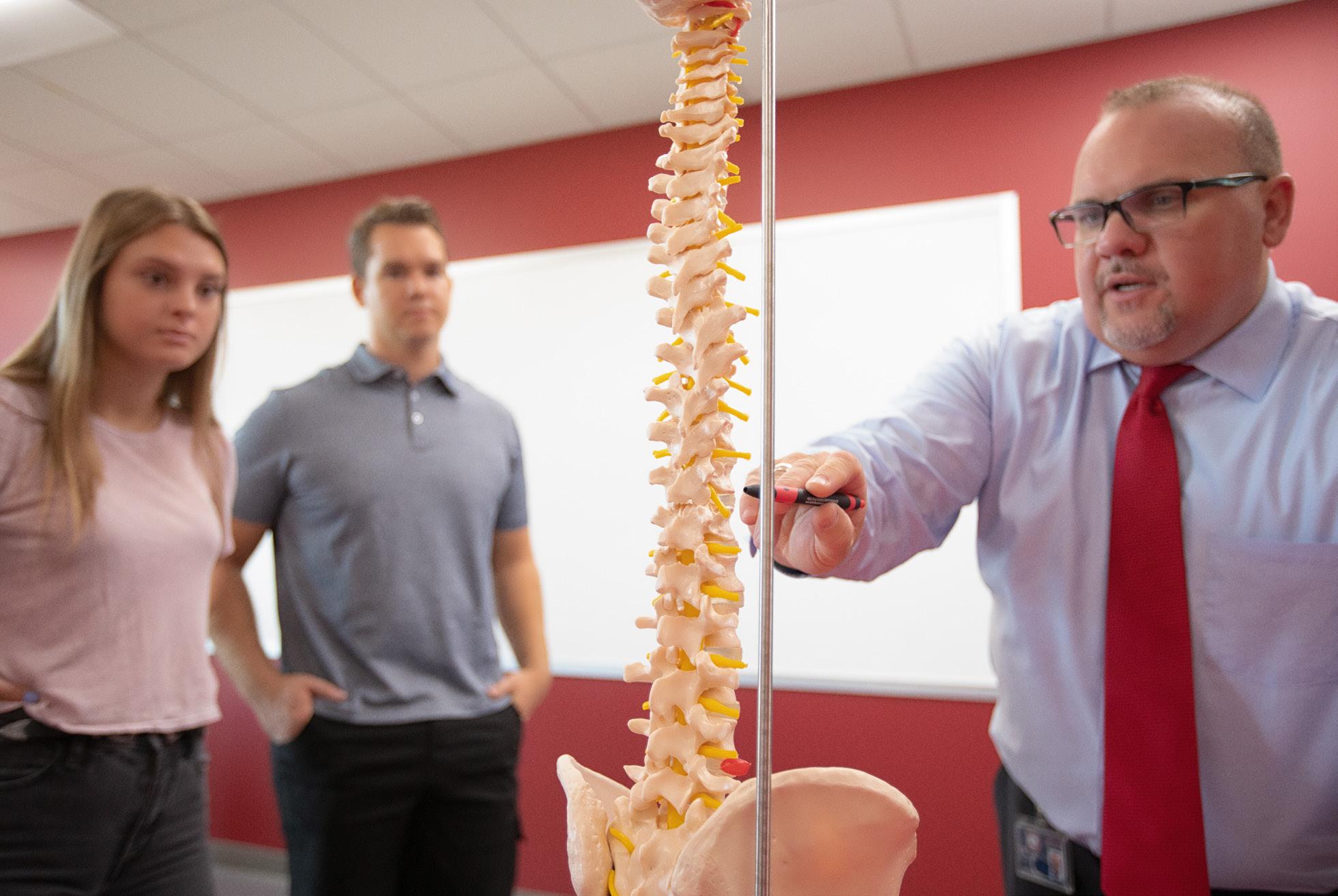
23 Academic Report 2020 | Dixie State University
DSU5: Digital Humanities of Utah’s Fifth Symposium
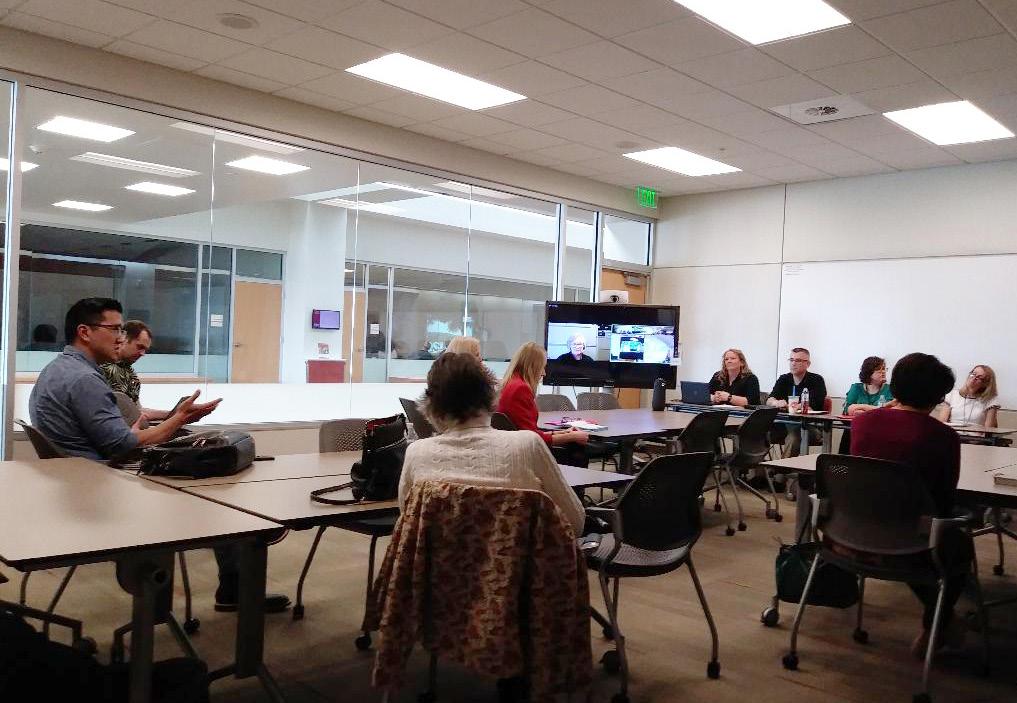 By Taylor Connor, Junior, English Major, Literary Studies Emphasis, Creative Writing Minor
By Taylor Connor, Junior, English Major, Literary Studies Emphasis, Creative Writing Minor
This year Dixie State University hosted the Digital Humanities of Utah’s Fifth Symposium (DHU5). Dr. Randy Jasmine, Professor of English, had the fortune to act as the principal organizer for the conference of student and faculty presentations in February before the COVID-19 nationwide shutdowns. Dr. Jasmine defines Digital Humanities as “the intersection of what we traditionally considered humanities with technology.” Digital Humanities is the combination of two different fields of study to create something unique to our place in history. Digital Humanities takes advantage of databases and programs to enhance the study of art and literature.
As usual in times of technological progress, traditionalists oppose such change in moving away from what is familiar. In the wave of expanding sciences, even the arts are swept into the digital world. Dr. Jasmine reports that in promoting Digital Humanities, “You also have to show people the value. It’s not giving up what we’ve always considered important in humanities: it’s complementing the work we’ve been doing.”
For the future of DHU, Dr. Jasmine thinks it’s “far out to think we can have a program in Digital Humanities like other schools.
I think for Dixie State the viable goal is to say: Let’s continue to support students and faculty.” DHU serves to advance the state and DSU’s interest in the subject. Dr. Jasmine says, “It’s a great emerging field and the more that get to know about it, the more I think people are going to enjoy it.” Dr. Jasmine encourages students to participate in next year’s DHU6 which will be hosted remotely by BYU.
DSU’S MUSIC DEPARTMENT GETS CREATIVE TO KEEP THEIR STUDENTS SAFE
By Shay Durrant, Senior, English Major, Literary Studies Emphasis, Psychology Minor
The music department has had to adjust rapidly to a pandemic-plagued world. Dr. Paul Abegg, Director of Strings and Director of Orchestras, Dr. Bryant Smith, Director of Bands, and Dr. Roger Hale, Director of Choral Activities, have changed how performances and how practices are conducted.
For instance, the orchestra hosted their first concert outside. Their musicians keep socially distanced during practices by standing on spots marked with tape on the floor. Further, Dr. Smith states, the department moved to completely live-stream performances.
The members of the symphonic band also have new equipment for practices and performances. Dr. Smith explained that the wind instruments are the biggest concern. The musicians play the wind instruments with bags placed over them. They also have special
masks with a hole to insert their mouth piece. Other instruments, such as trombones and trumpets, use bell covers to block air particles from escaping. The symphonic band has split into two groups for practice. They are on alternating days to keep everyone socially distanced. “It is a real chess game,” Dr. Smith states.
Dr. Hale explains that the choir pre-records their performances, then they go outside to lip sync to their recording. After that, Dr. Hale edits the video to have the lip synching match up with the recording.
All of the music department’s performances are available on their Facebook page. The DSU musicians have had to get creative, but through technology, the music department has been able to continue to bring the joy of music to the community during these hard times.
24 dixie.edu | active learning. active life.
HANDS-ON LEARNING IN THE EXERCISE PHYSIOLOGY AND BIOMECHANICS LABORATORIES
By Brooke Garceau, Senior, English Major, Professional and Technical Writing Emphasis
At DSU’s new Human Performance Center, students and professors are engaging in hands-on learning and gaining valuable skills in the exercise physiology and biomechanics laboratories.
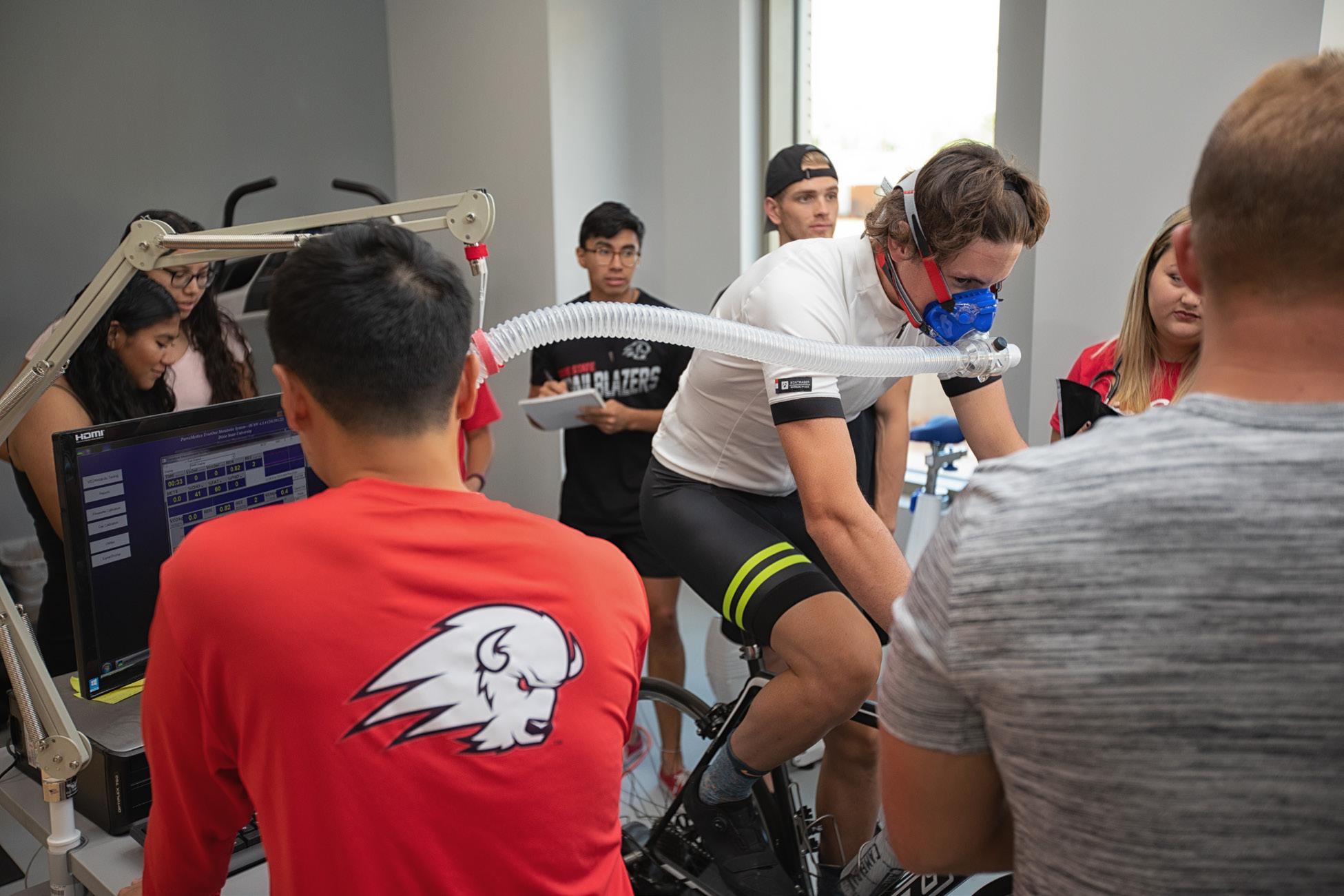
In describing the work they do there, Dr. Travis Ficklin says, “We study human movement with a focus on athletic performance.” Both labs are set up with classroom space for teaching and learning the principles of exercise physiology and biomechanics. And, most importantly, they contain equipment to test and experience those principles.
In the exercise physiology lab, students use equipment like a VO2 max machine that measures maximum oxygen intake during increasingly difficult exercise and a DEXA that scans a person’s entire body to determine body composition. In the biomechanics lab, students use a system of cameras and force platforms that
record athletes in motion and measure the direction and force of energy they exert. There is even a batting cage for baseball and softball research.
Students use lab computers to design, record, and analyze their own research studies to improve athlete performance. They might find the perfect angle for a golf swing or change the shoes a basketball player wears.
As students conduct research and gain experience with the labs’ specialized equipment, they are preparing for graduate school and careers in medicine and exercise science. Dr. Ficklin says this hands-on experience is crucial. He goes on to say that “active learning, active life is our way of doing things here, and the labs are an embodiment of that approach to learning.”
25 Academic Report 2020 | Dixie State University
ATWOOD INNOVATION PLAZA: Resources and Relationships Lead to Entrepreneurial Success
By Brooke Garceau, Senior, English Major, Professional and Technical Writing Emphasis
Atwood Innovation Plaza, the hub of entrepreneurship at DSU, is home to resources that transform ideas into businesses. The director of the plaza, Colby Jenkins, says, “Our main goal is to support ideas, any and all ideas from students and community members.”
On the plaza’s website, innovation.dixie.edu, potential inventors and entrepreneurs can learn about and reserve time to use plaza resources. One of the first things they’ll see on the site is the slogan “Innovate. Launch. Grow.”— a perfect description of the entrepreneurial journey.
Students begin at Innovation Guidance and Solutions with Dr. Wayne Provost. Together they research their ideas to prove originality and feasibility. In the state-of-the-art Makerspace, students use tools like 3D printers, wood-working and welding equipment, and a sewing and embroidery machine to create prototypes. The on-staff business attorney then helps inventors apply for protections like patents and trademarks.
From there, students can apply for the chance to receive mentorship and funding from investors for their new business through the Startup Incubator program. In the Business Resource Center, students find further mentorship to start and manage their businesses, marketing support, and workspace to facilitate growth.
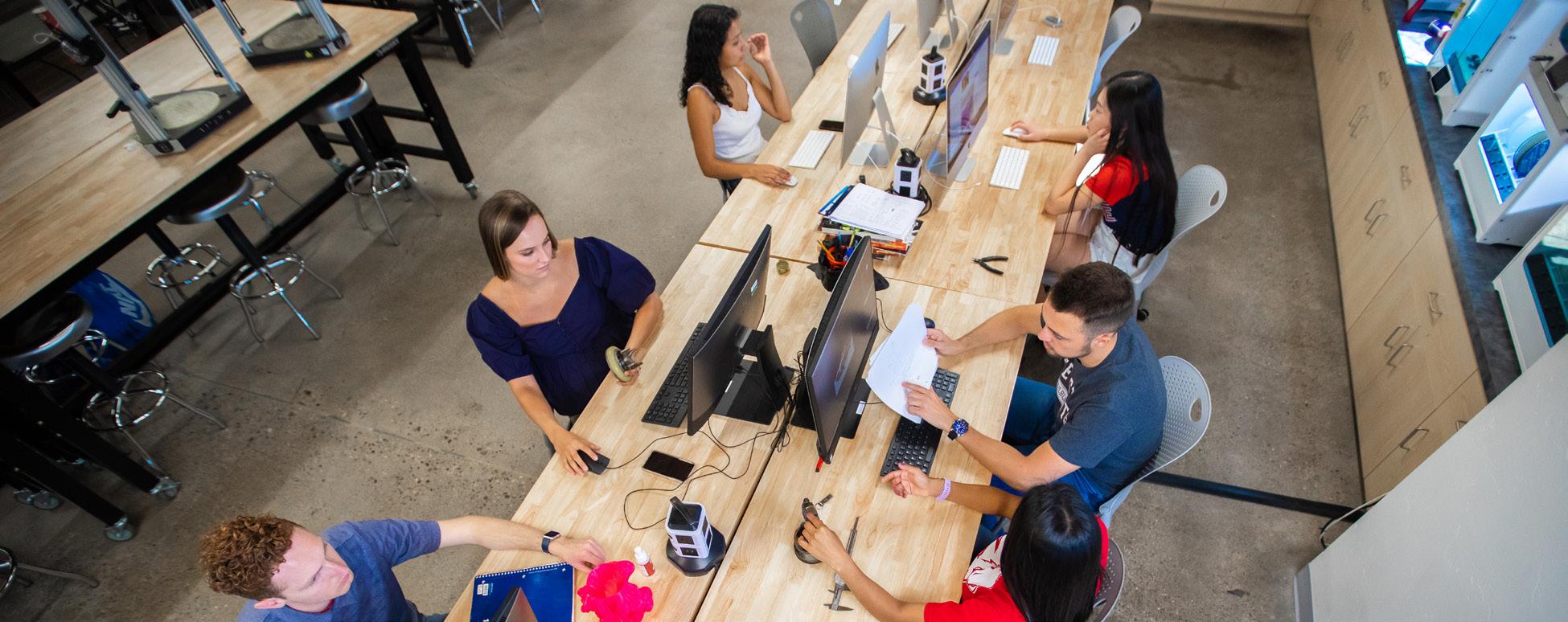
The opportunities at Atwood Innovation Plaza only continue. Students can apply for internships in every area of the plaza. Mr. Jenkins says, “We don’t want to be a home just for STEM students. Everyone has expertise that we could use here.” Interns work in the Makerspace, the Business Resource Center, and, often, with startups connected to the plaza. Mr. Jenkins says, “Our goal is for an intern to gain employment.” And, he reports, they are reaching that goal as companies incubated at the plaza are beginning to hire interns.
Just as interns find opportunities through relationships with potential employers, student entrepreneurs find success through relationships with mentors at the plaza.
In one such case, Dr. Provost teamed up with Jeff Stewart, the late Lindsay Atwood, and other community members to teach and mentor a class of eleven students as they built the startup 3XGreen. Dr. Provost and Mr. Stewart donated their patent for the solar-wind turbine they invented so students could use it to gain experience with the process of entrepreneurship. The turbine they created now provides power to the city of St. George through a partnership with Dixie Power, and one of the eleven students, Wyatt Anderson, currently serves as operations manager of 3XGreen.
26 dixie.edu | active learning. active life.
Another growing student business, Fill Drinks, started with help from mentors at Innovation Plaza. The business offers an unlimited soda subscription to DSU students for $19.99/month. The Fill Drinks machine located at DSU’s Brooks’ Stop scans the RFID chip in each subscriber’s reusable bottle before dispensing.
Devon Dickson, co-founder of Fill Drinks, says he and his partners used all of the plaza’s offered resources to build their business. “We’ve taken full advantage,” he says. One of his co-founders, Stuart Baker, says this: “People are really the main resource here, just all of the wonderful people here who are willing to share their knowledge and expertise with you.”
Student inventor Hunter Manz agrees. He says, “We have the best collection of people. You’ll find the people who can get you anything you need to help your business grow.”
Manz and his partner, Zack Manweiler, created Eden Technologies Inc. and its energy and cost-effective water desalination system. Their goal is to end water scarcity. International and domestic corporations have expressed interest in becoming their customers once prototype testing is complete. Manz says that “you get everything you need to have a successful startup” at Innovation Plaza.
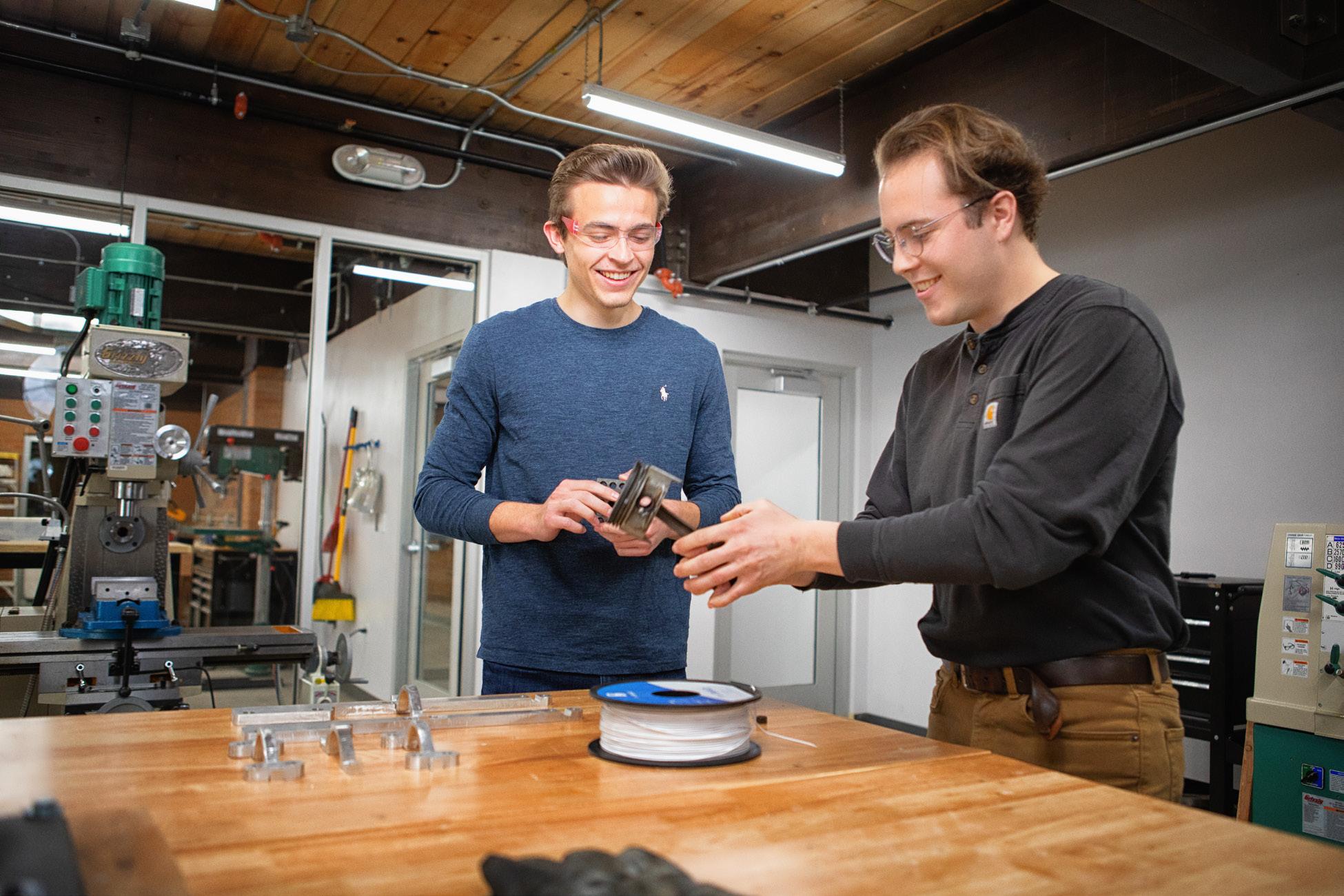
27 Academic Report 2020 | Dixie State University
STANFORD & JOHNS HOPKINS SUMMER RESEARCH INTERNSHIP REPORT
Program established by Lincoln Nadauld, director of Precision Genomics at Intermountain Healthcare

10
students selected from a pool of applicants for an interview with DSU and Intermountain this year
3–6 students selected of those interviewed for the Stanford internship
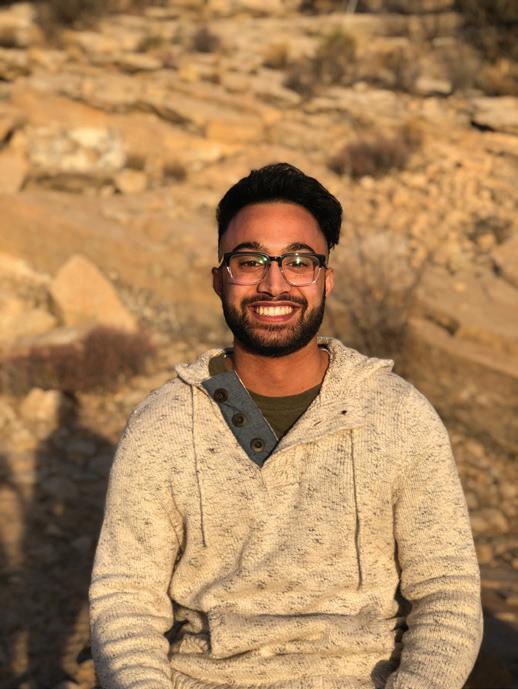
10
week summer research internship at Stanford & Johns Hopkins for juniorand senior-level DSU students
2020 S TANFORD & JOHNS HOPKINS INTERNS
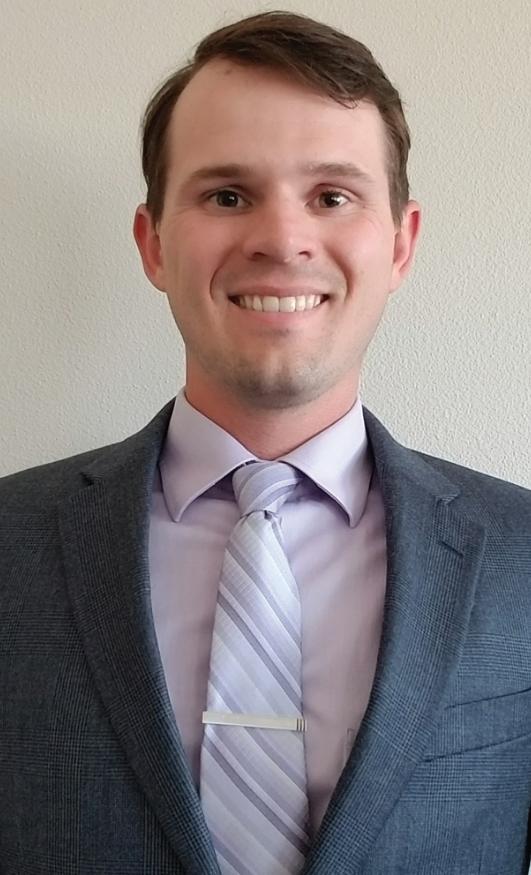
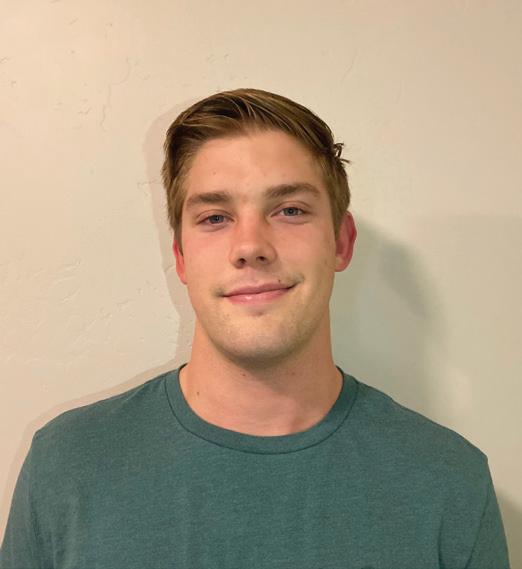
During my internship at Intermountain—Precision Genomics, I learned the importance of the process that takes place before getting into the lab-literature review. I learned significant strategies used to find reliable academic journal articles and how to interpret what was written. Because of this, I was able to comprehend hundreds of papers and produce a white paper about atrial fibrillation.
The unique challenges associated with the 2020 internship required me to be both resourceful and creative. Working with Precision Genomics and their life changing research required me to improve my weakest academic skills and strengthen my aptitude for scientific reading. This summer has given me the best experience on the foundations where all research projects begin.
The summer internship with Johns Hopkins University was life changing! I was able to build confidence in my laboratory skills, create meaningful relationships with my mentors, as well as gain a glimpse of what life would be like as a medical researcher. This experience shows me how to apply the science that I learned at Dixie State to a project that could potentially help future patients, and has made me more excited to pursue research as a physician-scientist.
My experience with Johns Hopkins allowed me to obtain firsthand experience in an increasingly relevant, hot area of research: nanomedicine for precision drug delivery. Working with and getting to know world class doctors and scientists has increased my confidence to pursue an MD/PhD program. What I learned this summer will undoubtedly benefit my patients as a physician and my reasoning and laboratory skills as a scientist.
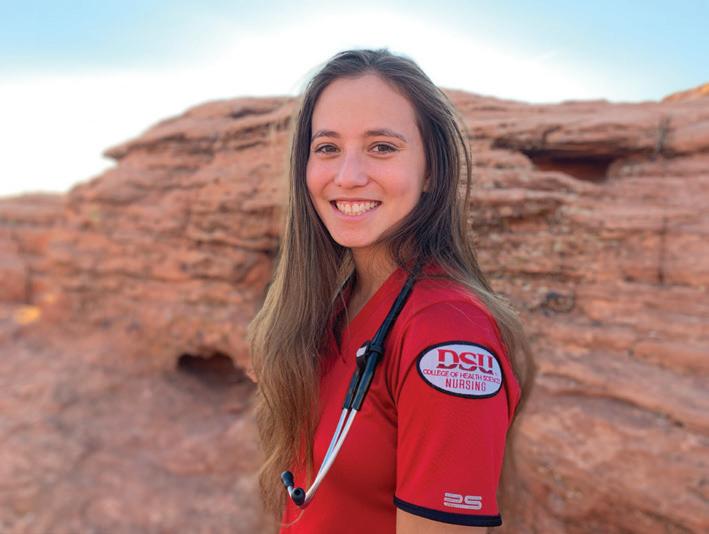
28 dixie.edu | active learning. active life.
2014
COLTON ROSENDAHL Intermountain—Precision Genomics
SPENCER THATCHER Intermountain—Precision Genomics
HANA-JOY HANKS Johns Hopkins
JONATHAN TUSCANO Johns Hopkins
Due to COVID-19, 2020 Stanford interns participated in research with Intermountain—Precision Genomics instead of Stanford and 2020 Johns Hopkins Interns engaged in their research at DSU while receiving daily guidance and support from Johns Hopkins’ faculty via Zoom.
DIXIE STATE UNIVERSITY GRANTS
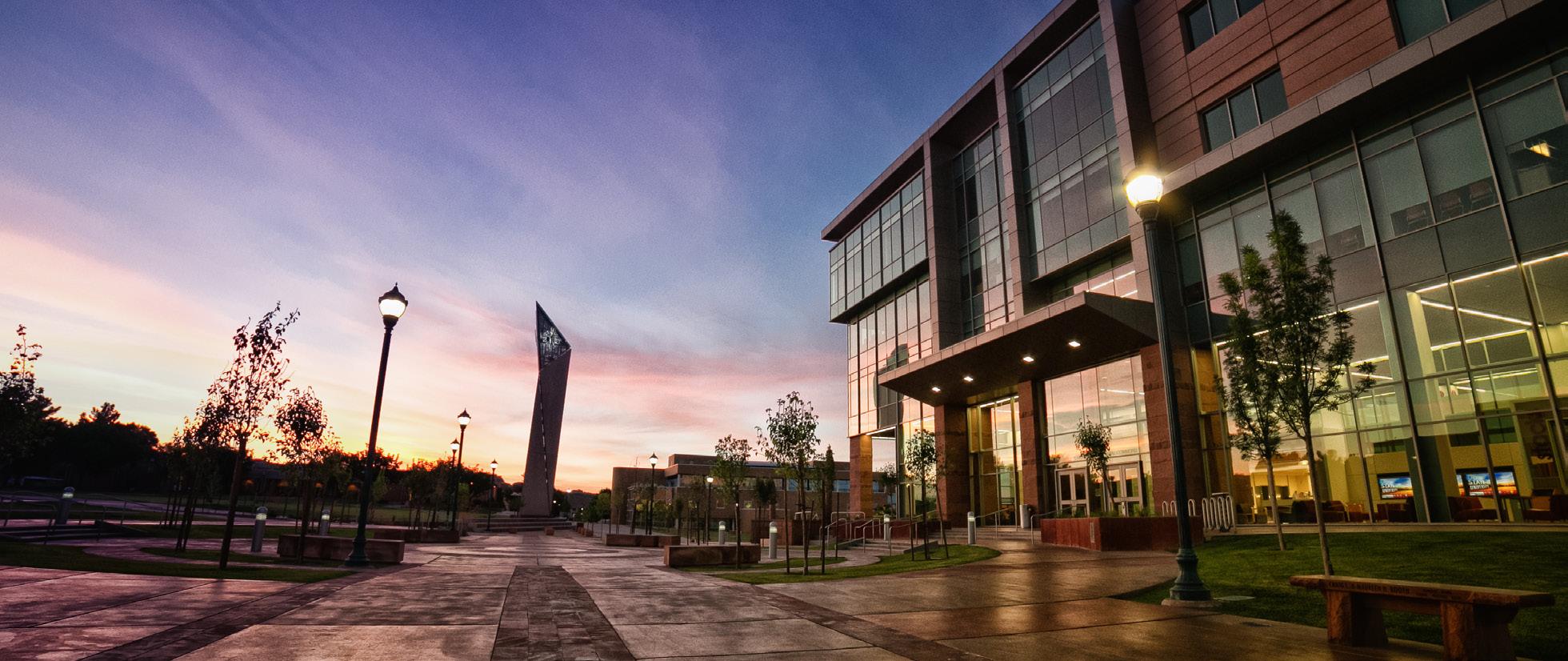
29 Academic Report 2020 | Dixie State University DEPARTMENT PRINCIPAL INVESTIGATOR FUNDING AGENCY TITLE AWARD Academic Affairs Dr. Nancy Hauck Utah State Board of Education 19LDSP Perkins Regional Consortium-LDSP $100,000.000 Academic Affairs Dr. Nancy Hauck Utah State Board of Education 20FLEA Perkins Formula 2020 $274,701.00 Arts Dr. Nancy Allred St. George Arts Commission Non-RAP Organization Castle Rock Music Camp $6,680.00 Arts Dr. Robert Matheson Utah Department of Heritage & Arts Dixie State University Bass Festival $525.00 Arts Ginger Nelson St. George RAP Tax Celebrity Concert Series $25,000.00 Arts Kathy Cieslewicz State of Utah Sears Art Museum $17,500.00 Arts Phil Tuckett Utah Department of Heritage & Arts DocUtah $5,000.00 Atwood/Business Colby Jenkins/ Dr. Kyle Wells EDA EDA-UC $143,000.00 Atwood/Business Colby Jenkins/ Dr. Kyle Wells GOED BRC $35,287.00 Atwood/Business Colby Jenkins/ Dr. Kyle Wells GOED PTAC $5,000.00 Education Dr. Jeri Crosby Utah State Board of Education Beverley Taylor Sorenson Elem Arts $50,000.00 Health Sciences Brenda Armstrong Utah Department of Health Dental Hygiene Program $88,935.00 Humanities & Social Sciences Dr. Jeremy Young/ Dr. Tasha Toy State of Utah Census Day Completion Party for Dixie State University Students $2,500.00 Library Kathleen Broeder Utah State Archives Leo Alva Snow Papers Oversize Materials Project $1,777.00 SET Dr. Andrew Christensen NASA NASA GUVI Project $18,000.00 SET Dr. Erin O'Brien National Park Service Outdoor Leadership $64,762.00 SET Dr. Erin O'Brien National Park Service Outdoor Leadership $63,544.00 SET Dr. Russell Reid NSF Subcontract through University of North Texas High Surface Area Reverse Electrowetting Mechanoelectrical Transduction $10,535.00 SET Dr. Samuel Tobler University of Utah NASA Space Grant Consortium $12,000.00 SET Jessica Davis Office of the Commissioner of Higher Educa-tion (OCHE) CE QL Earned Credit Award $108,325.00 SET Jessica Davis Utah Department of Heritage & Arts Dixie PREP $2,500.00 Student Affairs Craig Harter Department of Education TRIO Upward Bound $360,861.00 Student Affairs Jonathan Morrell Department of Education TRIO-Student Support Services $355,733.00 Student Affairs Kitty Hughes Department of Education TRIO Talent Search $422,193.00
DR. SUSAN HART: Uniting DSU and Special Olympics
By Denali Lathrop, Senior, English Major, Creative Writing Emphasis
Dr. Susan Hart, Department Chair for Exercise Science, has actively helped DSU host Special Olympics since 2018. Events of the Utah Special Olympics Southern Region that have taken place at Dixie include basketball, bocce ball, swimming, and track and field. Dr. Hart says that each event includes “about 150 Special Olympic athletes, with at least as many volunteers, and spectators.”
Everyone who helps with the Special Olympics at DSU is a volunteer. Volunteers may be DSU faculty, staff, students, or community members. “In order to host major events,” Dr. Hart says, “gym reservations and volunteer recruitment begin several months in advance of the event.”
DSU is recognized as a Head of Delegation (HOD) for Special Olympics. This means that volunteers have created teams that participate in a variety of sports throughout the state. Prior to the forming of these teams, many individuals did not have teams and therefore were not able to participate in Special Olympic events. Leaders of the DSU HOD are responsible for team development, including divisioning, recruitment, and competition preparation.
Divisioning takes place prior to competition. The Special Olympics website explains that each athlete is given a skills assessment, which places athletes of similar abilities and skill sets into the same division. This ensures fairness and allows for an equal chance at success.
The DSU HOD also has some unified teams in the Southern Region basketball tournaments. A unified team consists of Special Olympic athletes playing side by side with DSU students. The teams train and play together. Dr. Hart says this results in “a better understanding and appreciation of each other.”
The Special Olympics Southern Region Basketball Tournament was the last Special Olympics event on campus, taking place on February 1, 2020. Dr. Hart says that we “hope to continue to grow our delegation, serving as many athletes as possible within the Southern Utah region.” The DSU delegation has been invited to participate in a snowshoeing event in Northern Utah. Dr. Hart hopes that we will “have athletes participate in this event as well as other events across the state.”
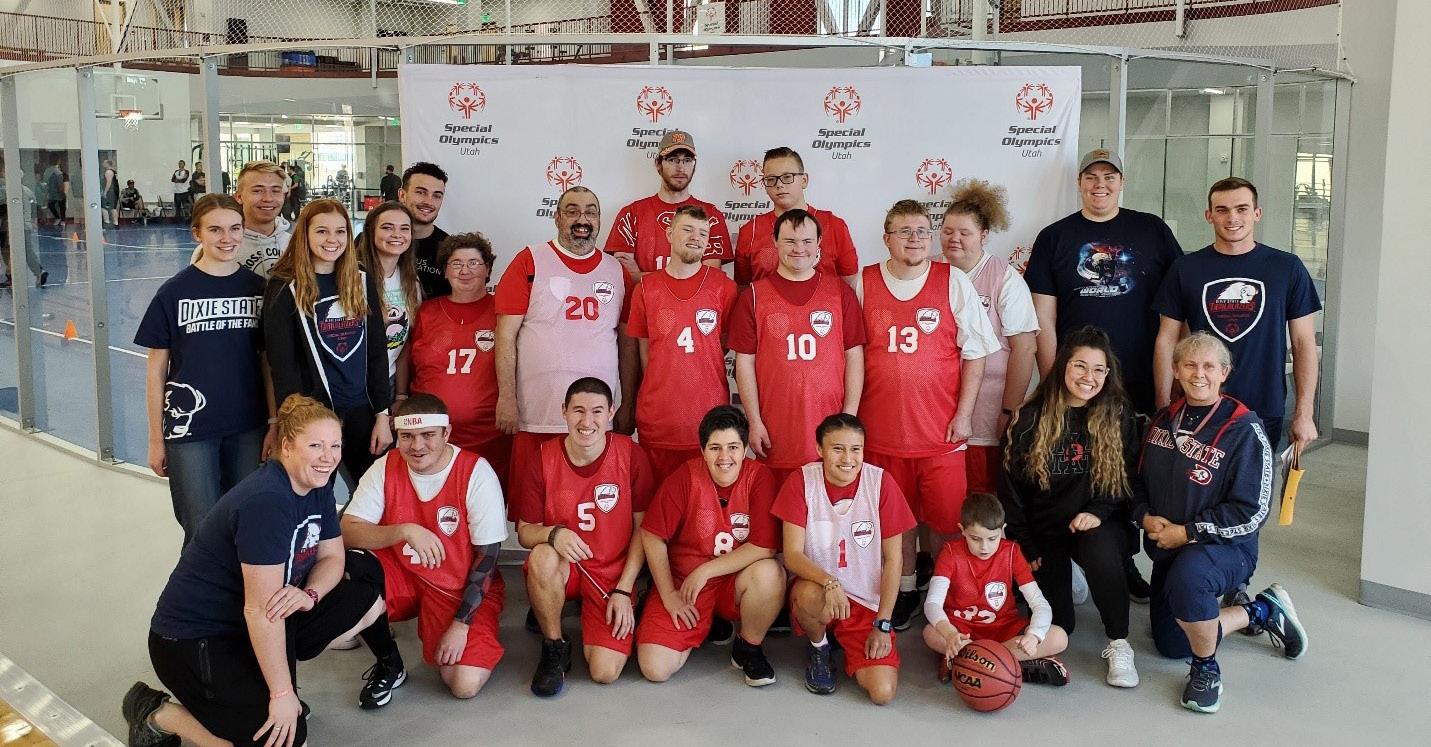
30
FACULTY SPOTLIGHTS
DR. ERIN O'BRIEN: Discover Amazing Places with the Outdoor Leadership Academy
By Jessica Lounsbury, Junior, English Major, Secondary Education Emphasis
Don’t let life idly pass by; grab it by the reins and explore courageously. Since the pandemic hit, many increasingly realized the benefits of being outside. The Outdoor Leadership Academy (OLA) at Dixie State University acknowledges the need for wilderness exploration; therefore, the university provides trips for students of every skill level to enjoy and become comfortable in the unbounded natural world.
The impact OLA has made is vast. Professor of Biology and Director of Community Engaged Learning Dr. Erin O’Brien indicates the program has had influential interactions with thousands of students in the five years it has been operating, exposing participants “to a variety of incredible experiences and activities." OLA typically has two overnight trips and many day outings every semester; some activities include camping, kayaking, rafting, and backpacking.
The target population OLA focuses on is underrepresented youth such as racial/ethnic minorities, LGBTQIA+ individuals, students with disabilities, and those who come from a low socioeconomic background with an emphasis on individuals who are 35 or younger. Dr. O’Brien mentions that sometimes students feel hesitant to sign up, but once they do, every individual wants to return.
Students that participate in OLA’s trips are not only enjoying nature but also changing their whole outlook. Dr. O’Brien has observed the sort of natural phenomenon that has risen as students absorb these experiences. Students have frequently told her that their participation in OLA made it so they’ve stayed in school, and many have found their majors or career opportunities. Additionally, the high school students the program serves have felt inspired to attend college because of what Dr. O’Brien calls “the humanizing experience of being in public land/nature with college professors and realizing it’s not so scary.”
OLA is instilling lifelong learning and showing students the advantage of getting outside and out of one’s self. The program’s frequent service projects and outdoor ethics contribute to bettering
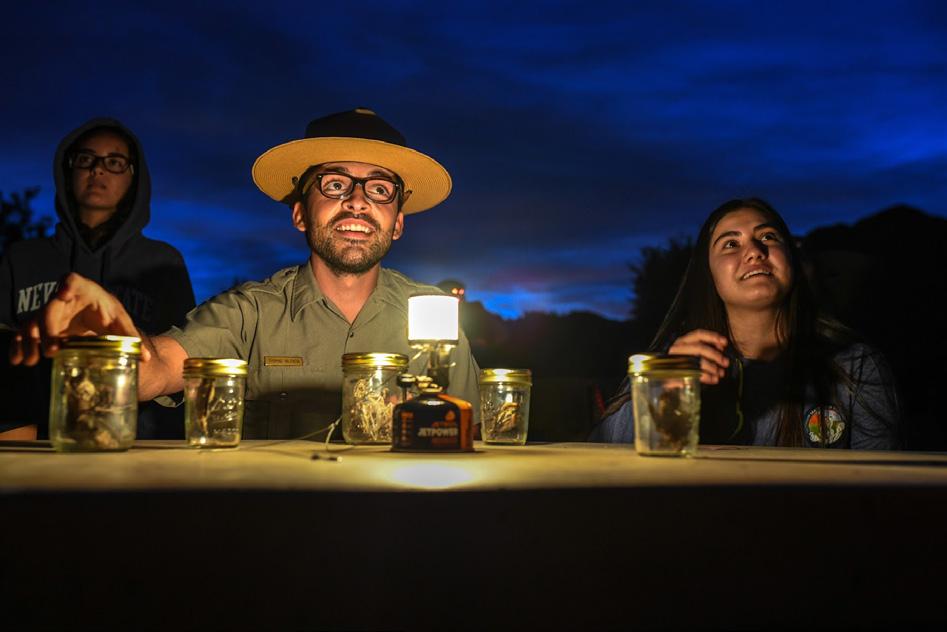
the community. OLA is taking students out of the classroom and exposing them to a wealth of knowledge.
The opportunities OLA provides take a great deal of time and preparation largely done behind the scenes. Additionally, OLA is flourishing because of funding from the National Park Service, DSU’s dedicated team, and the different agencies that contribute to the trips. Participation is covered by the grants, including transportation, gear, food/water, safety instructors, and funding student trips. Dr. O’Brien emphasizes, “Really, the only obligation that you’re under is to show up when you sign up for a trip.” OLA takes care of everything in between, trying to make it as easy as possible for students to attend these outings.
The pandemic has changed many aspects of our lives, but OLA is still here to help students explore. Dr. O’Brien notes that organizers are getting creative so they can still “get people outside while this is still going on but doing so safely.” Also, she mentions the five-year agreement that was recently reinstated with Grand Canyon Parashant will keep OLA going, and she’s excited for this as organizers are already planning phenomenal trips.
Any student who wants to get outside and learn, Dr. O’Brien states, should “sign up for one of our trips or one of our hikes. It’s the easiest way to start...and we live in one of the most amazing places to get outside.”
31 Academic Report 2020 | Dixie State University
DR. ALLYSON HAMILTON - American Sign Language and the Nursery Rhyme Project
By Brooke Garceau, Senior, English Major, Professional and Technical Writing Emphasis
When the COVID-19 pandemic hit, many of us felt like “all the king’s horses and all the king’s men” trying desperately to put Humpty Dumpty back together again. Unlike the king’s horses and men, however, the American Sign Language (ASL) professors and students at DSU overcame their new challenges. They collaborated with the Utah School for the Deaf to fulfill a graduation requirement and helped deaf children and their parents in the process.
At DSU, the ASL program is growing. Students can earn a bachelor’s degree in individualized studies with an emphasis in ASL. Dr. Allyson Hamilton, who is integral to the program, says she hopes DSU will soon be able to offer a full bachelor’s degree in American Sign Language.
In the current program, students are required to complete a 90-hour internship to prepare for graduation. Students spend half of this internship observing a certified ASL interpreter. And, under supervision, students fulfill the other half of the internship requirement by doing the interpreting themselves.
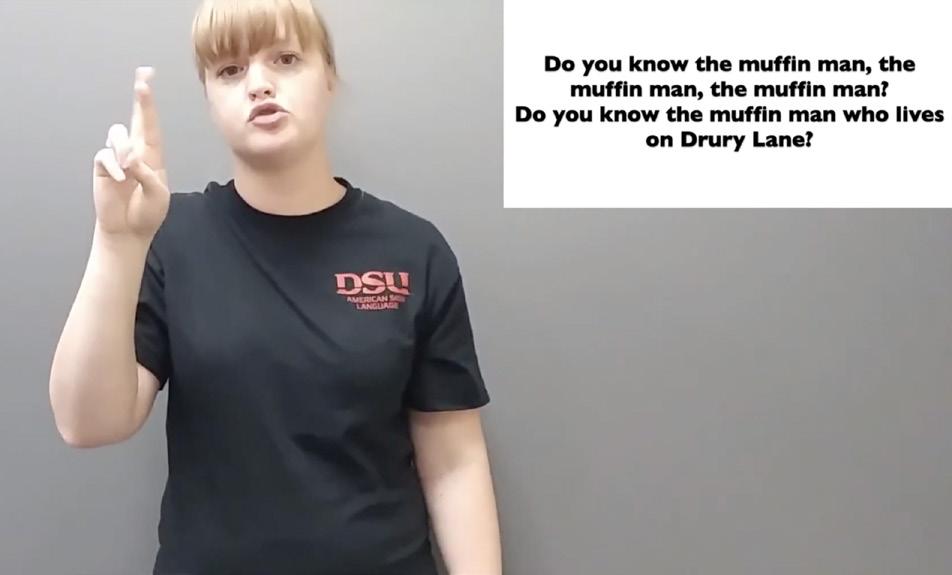
Because of the restrictions and caution associated with the COVID-19 pandemic, interns Chauney Nielson, Sadie Stoneking, and Amber Jeppson could not fulfill the 45-hour interpreting requirement in the traditional way. Collaborating with Dr. Hamilton and the Utah School for the Deaf, the interns completed their interpreting requirement by creating 29 ASL nursery rhyme videos for deaf students and their parents.
Jeppson describes the process this way: “I selected ten nursery rhymes from a list and spent a couple of days researching them, discussing ideas with my peers, glossing [translating] each rhyme, and practicing. I filmed practice videos, which I shared and reviewed with Dr. Hamilton. Together we brainstormed more visually involved and conceptually accurate improvements to my interpretations.” The other interns followed the same pattern.
Dr. Hamilton explains that the nursery rhyme interpretations had to be revised several times because traditional English nursery rhymes contain Old English and “nonsense words and phrases.” The interns had to find a way to communicate the same feeling of whimsy through ASL. Dr. Hamilton further explains that they changed some of the rhymes to feel more age-appropriate for their young audience: “We just tried to make some of the more horrifying ones a little silly so they would have more intrigue for the kids, a little more accessibility.”
That accessibility extends beyond the words of these rhymes into the culture of childhood. Dr. Hamilton says that “deaf kids deserve to have the same experiences as hearing kids.” The project will also give these kids a greater ability to communicate with their parents. Stoneking says that she “realized that this was just the beginning for some parents in learning their child’s language.”
In addition to strengthening parent-child relationships, this project allowed the interns to strengthen their interpreting, signing, researching, and collaborating skills. These ASL interns, like the much younger deaf students, can now engage their worlds with greater competency and confidence.
32
FACULTY SPOTLIGHTS
CRYPTOGRAPHY AND QUANTUM COMPUTING AT DSU
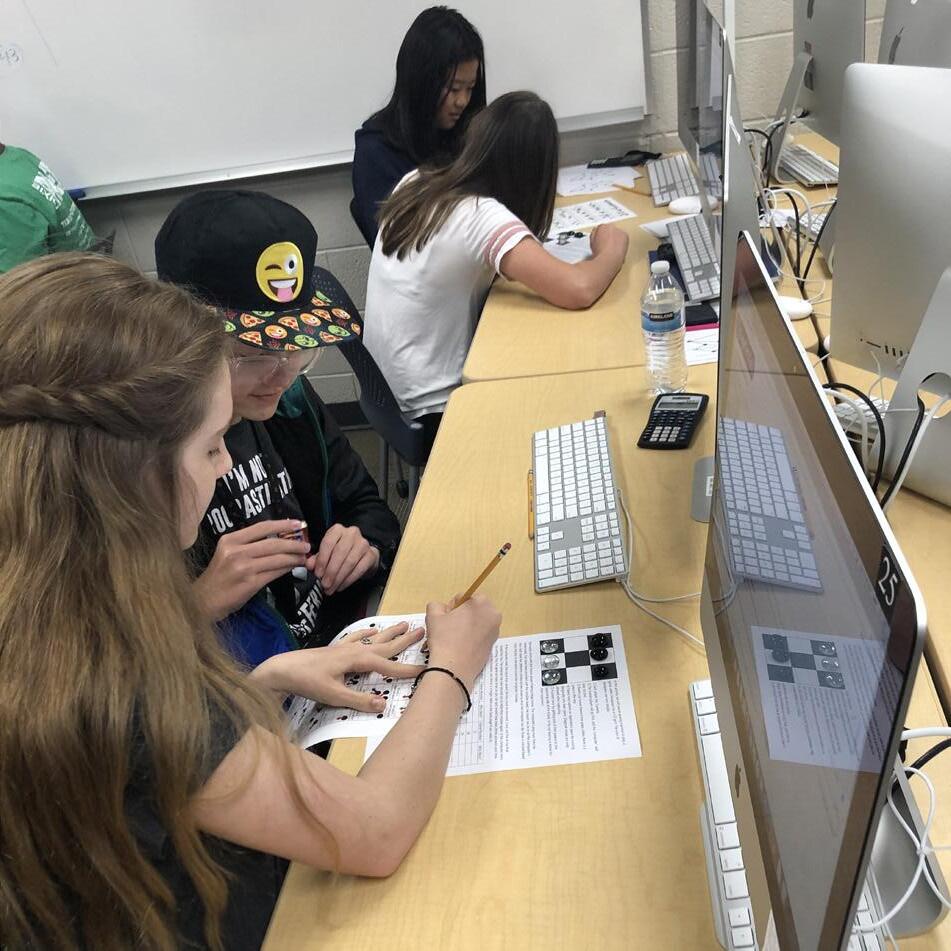 By Rebecca Goates, Senior, Integrated Studies Major, Dance and English Areas of Emphasis, Honors Program
By Rebecca Goates, Senior, Integrated Studies Major, Dance and English Areas of Emphasis, Honors Program
Cryptography lies at the intersection of mathematics and computer science and deals with creating, implementing, and breaking the ciphers that keep our data safe. Students studying cryptography learn to apply advanced topics learned in upperdivision mathematics and computer science classes to critical real-world applications. Cryptography is a primary application for many of the topics students learn in both mathematics and computer science classes. This field of study is exciting, approachable, and feels more like creating and solving intricate puzzles than studying mathematics.
A student-driven push to bring opportunities to learn and apply quantum computing to DSU has led to the formation of a small (and growing) group of students and faculty exploring the radically different ways of thinking required to create and develop quantum computing algorithms. Dr. Jesse Hicks and Dr. McKay Sullivan are assisting this student group to take an activelearning, exploratory approach focused on the understanding and
use of quantum computing tools published by IBM, Microsoft, and others.
Dr. Sullivan and Dr. Hicks proposed and developed two new cryptography certificates based on recommended knowledge units published by the National Security Agency (NSA). The NSA is the largest employer of math majors in the country. Students completing these certificates will be better prepared for both governmental and industrial opportunities in cryptography. Students interested in completing graduate work in this area will find that many researchers in academia build their entire careers around the study of cryptography.
These two certificates give students an early introduction to one of the most exciting and relevant applications of mathematics. They include several new courses, such as a lower-division survey course in cryptography and two cutting-edge upper-division courses in cryptography and quantum computing. Quantum computers continually move toward disrupting the cybersecurity industry in a big way. Quantum computing algorithms already exist to break most of the cryptosystems currently in wide use once a large enough quantum computer is successfully built. In DSU’s unique upper-division Quantum Computing and Cryptography course, students learn and apply quantum algorithms on real quantum computers as well as investigate some of the current candidates for post-quantum cryptosystems.
Mr. Jameson Hardy assisted Dr. Sullivan and Dr. Hicks to develop CryptoCamp, a camp that provides middle and high school students with unique opportunities to explore cryptography through fun, hands-on activities. The students work in groups to encode cryptosystems and learn to use attack algorithms to break them in a hands-on setting. This camp fosters student excitement for cryptography, math, and computer science and showcases the exciting opportunities available at DSU for the brightest future Trailblazers.
33 Academic Report 2020 | Dixie State University
LORA KLEIN: From Stay-at-Home Mom of Six to Computer Science Instructor
By Autumn Nuzman, Senior, English Major, Creating Writing Emphasis, Sociology Minor
Computer science instructor Lora Klein had quite the journey on her way to where she is now.
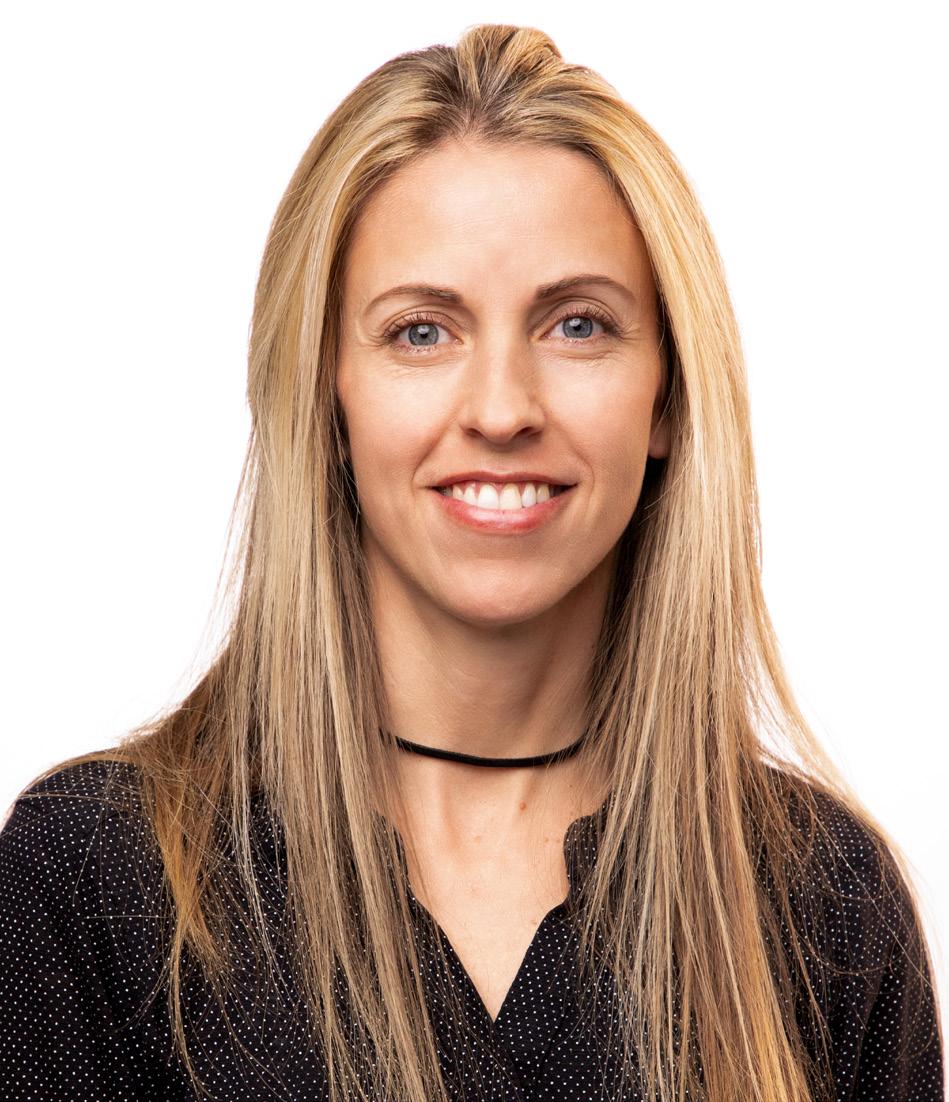
Klein married her husband one year after graduating from Hurricane High School, and they had the first two of their six children within two years after that. Her husband started his own cabinet business and ended up with a large workshop in St. George and a warehouse in Las Vegas. Then the Great Recession of 2008 hit hard.
Soon after the birth of their sixth child, Klein and her husband lost everything and had to downsize to a rental with a single bathroom and three broken windows. Her husband had to start over and started working as a cabinet installer.
“I felt helpless,” Klein says. “I had no degree or experience, and with three preschool-aged children, daycare would have cost more than any money I would make. I decided to explore educational options and was surprised to find that nearly all of the classes I needed to earn my associate degree could be completed online. Although completely overwhelmed and intimidated, I decided to set two goals for myself: Earn an associate degree and learn a skill that would allow me to work from home.”
Klein originally attended DSU as an English major with an emphasis in professional and technical writing because she figured she’d be able to work from home in that field, but after taking a couple of digital design courses, she switched her major to visual technology and did freelance design work for family and friends. She may have ended her educational journey as a graphic designer if she hadn’t taken an introductory web course during the last semester of her associate degree.
“It was fascinating,” Klein says. “I could take all of my graphic designs and make them come to life online with buttons, galleries, hover effects, and animations! My professor promised even greater power to manipulate elements, and the potential for a higher salary, if I learned some programming skills. My interest piqued, and I accepted the challenge.”
Klein says her biggest challenges were securing time to study and finding someone to watch her kids while she was on campus.
“I used early mornings, late nights, middle of the nights, nap times, travel time, waiting in line times, [and more] to try and study,” Klein says. “There were some nights that I started doing homework at 10:30 p.m., and I was still up working on assignments when my kids got up for school the next morning.”
Klein went on to work remotely as a software developer for Musicbed, thanks to contacts she made at DSU she never missed a day of class, maintained a 4.0 GPA, got selected as the CIT Student of the Year, and received the Dixie 11 Award.
Klein says she decided to teach at DSU because the professors in the Computing and Design Department are phenomenal, she wants to help students gain the same confidence she did, and she wants to inspire diversity in a male-dominated field.
“DSU is a fantastic institution,” Klein says. “I am excited for all the new growth and changes that have been happening on campus and that are continuing to happen.”
34 dixie.edu | active learning. active life.
FACULTY SPOTLIGHTS
INSTITUTE OF POLITICS: Vince Brown
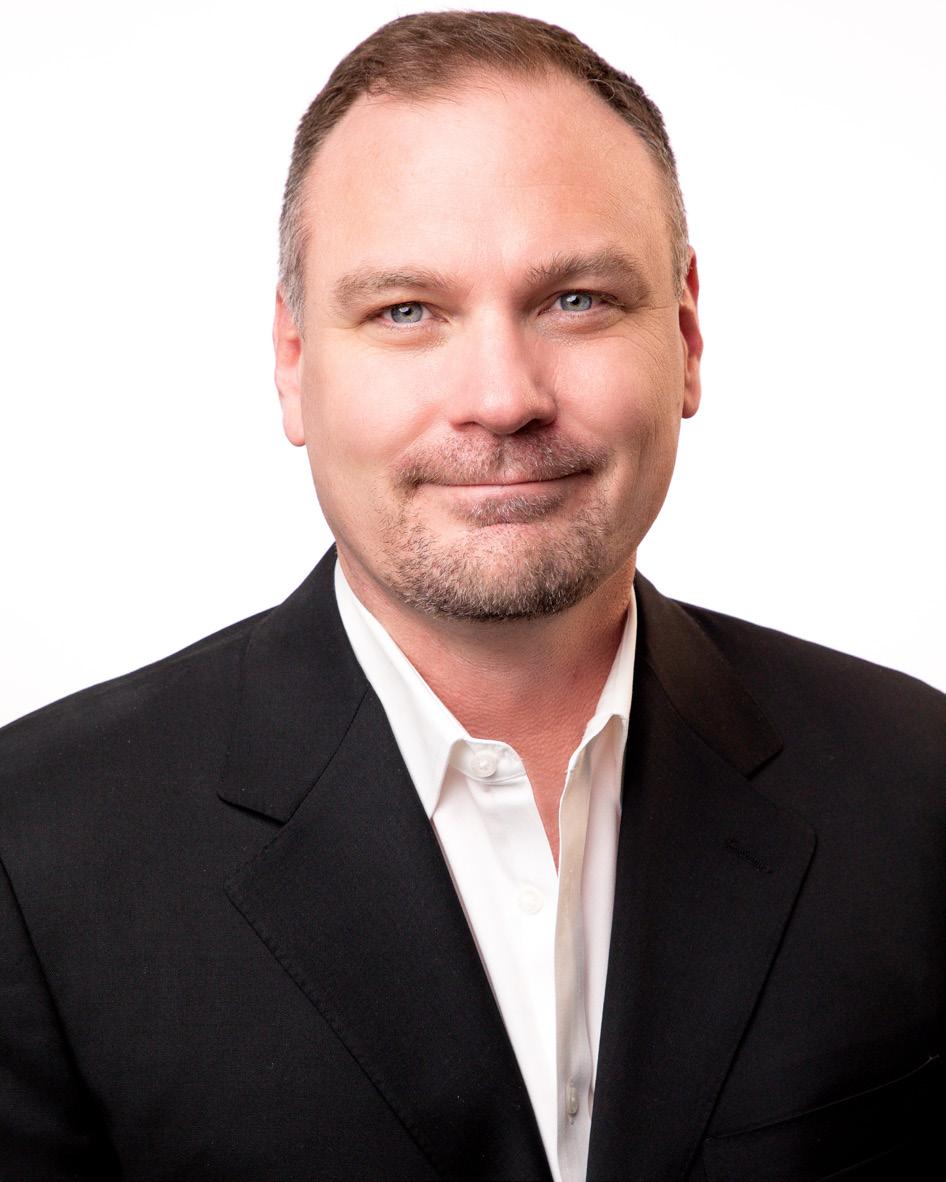 By Yasel Avalos, Junior, English Major, Professional and Technical Writing Emphasis, Spanish Minor
By Yasel Avalos, Junior, English Major, Professional and Technical Writing Emphasis, Spanish Minor
The Institute of Politics & Public Affairs (IOP) first started as a student organization which later, under the leadership of Director Vince Brown, transitioned to being housed in the College of Humanities & Social Sciences (CHaSS). This strengthened the IOP’s goal of becoming a world-class institution.
DSU’s IOP has also partnered with the Hinckley Institute of Politics in Salt Lake City, an already established institute of more than 50 years. Brown has worked tirelessly with the support of his student staff to bring awareness and education to DSU’s students, faculty and staff, and community. Recently, the IOP has brought awareness and education about voting to ensure those in our community register and exercise their right to vote.
To educate students, faculty, and community members, the IOP has held various forums including the recurring Pizza & Politics series with high-profile guests and speakers, including, but not limited to, the following: a mask-wearing mandate discussion with staff from DSU, which explained the science and policy behind mask-wearing mandates, an event on the Black Lives Matter movement with community leaders, faculty and students, an event on policing and police reform with police from DSU, St. George, and a representative from the City Council. Vince Brown believes that “[These] events have gone a long way to educating the community.”
The IOP has also created forums for Southern Utah’s political candidates who have included Congressman Chris Stewart and challengers Kael Weston and Rob Latham. Not only has the IOP served as a political information machine, but as a student guide. The IOP has guided several students to submit resumes in order to become interns for state legislative, congressional, interest group, and campaign offices, many of whom have been placed. Students certainly have been given a career boost through the opportunities facilitated by the IOP.
A current project that the IOP is working toward is making civic engagement a tangible element of campus and community life that prepares students for responsible citizenship. The IOP’s mission is to ignite passion, appreciation, and respect for politics and public service for DSU students and the community. With all that the IOP has accomplished, the Institute is truly on the road to reaching that goal.
35 Academic Report 2020 | Dixie State University
BRIANNA MCFADDEN: Observing a Decade of Change at DSU
By Autumn Nuzman, Senior, English Major, Creative Writing Emphasis, Sociology Minor
Sergeant Brianna McFadden is earning a master’s degree at Dixie State University, but she first attended the institution over a decade ago when it was still a state college.
In ninth grade, McFadden was told about the SUCCESS Academy program, but she was not chosen through the lottery enrollment system, so her Educational Talent Search advisor suggested concurrent enrollment at Dixie State College.

“Most semesters, I took five courses at DSC and three at the high school,” McFadden says. “That’s what allowed me to graduate from DSC with my associate of science degree the same year I graduated from Dixie High School.”
After graduating from DSC, McFadden attended Southern Utah University and graduated with a bachelor’s in criminal justice with an emphasis in forensic science and a minor in biology.
“Thanks to concurrent enrollment [at DSC], I graduated with my bachelor’s degree earlier than I otherwise would have,” McFadden says.
McFadden then joined the Army National Guard and received an Associate of Applied Science in Intelligence Operations Studies, afterward attending the Defense Language Institute and earning an Associate of Arts in Chinese. She graduated at the top of her class.
“Learning a new language as an adult provided me the type of challenge I thrive on, and I feel more secure in hearing and processing any information first hand rather than through an interpreter,” McFadden says. “I also really enjoy Chinese dating shows. They’re way more interesting than English ones.”
McFadden is currently earning a Master’s in Technical Writing & Digital Rhetoric at DSU while on mission in another state.
“I’ve been working in the data analysis field for a while, which includes a lot of technical writing,” McFadden says. “I figured that I could increase my abilities within my field and also work toward having more career opportunities and making more money in the future.”
McFadden has enjoyed the ability to attend class through Zoom since she struggles with traditional online courses because of their strict due date structure and lack of social interaction.
“It’s amazing that the university environment has advanced to the point that a student such as myself can attend class from halfway across the country and fully participate with the rest of my classmates,” McFadden says.
Since coming back to DSU, McFadden has enjoyed adjusting to higher-level classes, shifting her study focus from science to English, and working full time while attending class.
“I’ve been enjoying the challenge of coming back to school,” McFadden says. “It’s quite different from undergrad, for a variety of reasons.”
Another difference is that she’s attending DSU at the same time as her mother, undergrad senior English major Mary McFadden.
“The most interesting thing about attending school at the same time as my mother is that we are both first-generation students, as neither of us had parents with degrees,” Brianna McFadden says. “Another fun aspect of attending school at the same time as her is that my professors will mention her from time to time because we have a lot of crossover with our instructors since she is also an English major. She’s well respected by her instructors, and I’m proud of her.”
Brianna has seen a decade’s worth of evolution from DSU.
“DSU has progressed a lot since I first started attending in 2009,” Brianna says.
“I’ve enjoyed getting the chance to see its evolution from a state college to a wellrespected university.
I’m proud to have been and to once again be a Dixie State University student.”
36 dixie.edu | Student Spotlights
STUDENT SPOTLIGHTS
DEBBIE PETERSON: DSU Alumna Inspired to Learn
By Shay Durrant, Senior, English Major, Literary Studies Emphasis, Psychology Minor
One day, Debbie Peterson, a future Dixie State alumna, picked up a magazine in the waiting room of a doctor’s office. She was a young mom, taking her child to get a check-up. In the magazine was an article about a woman who got her doctorate degree in her sixties and started practicing medicine later in life. The woman in the magazine served as a huge inspiration to Peterson throughout her life, motivating her to come back to college after having a twenty year dental hygiene career and raising a family.
“Transferring back to college after raising a family was hard,” Peterson explains. “I found that I couldn’t be there for all of the big events like when my daughter had a baby.”
However, her family rose to the occasion and filled in where Peterson couldn’t, so that she could pursue an education. Peterson graduated from DSU with a bachelor’s degree in individualized studies. Her focal points were dental hygiene, communications, and the sciences.
Peterson knew that her bachelor’s degree wasn’t the end of her education. She wanted to pursue a physician’s assistant degree. “Most people at my age just want to be retired!” Peterson states. Despite that, Peterson worked hard to fill out her applications and was accepted into the University of Utah’s PA program on a scholarship.
This year has been tough for Peterson. She isn’t able to connect with her classmates like she has been able to in the past. She also states that remote learning has been an adjustment.
However, through this tough year, Peterson has kept a positive attitude, and whenever she is in doubt, she reminds herself of that woman who obtained her doctorate in her sixties. Peterson says, “If she can go into the medical field, then I can do the PA program.”
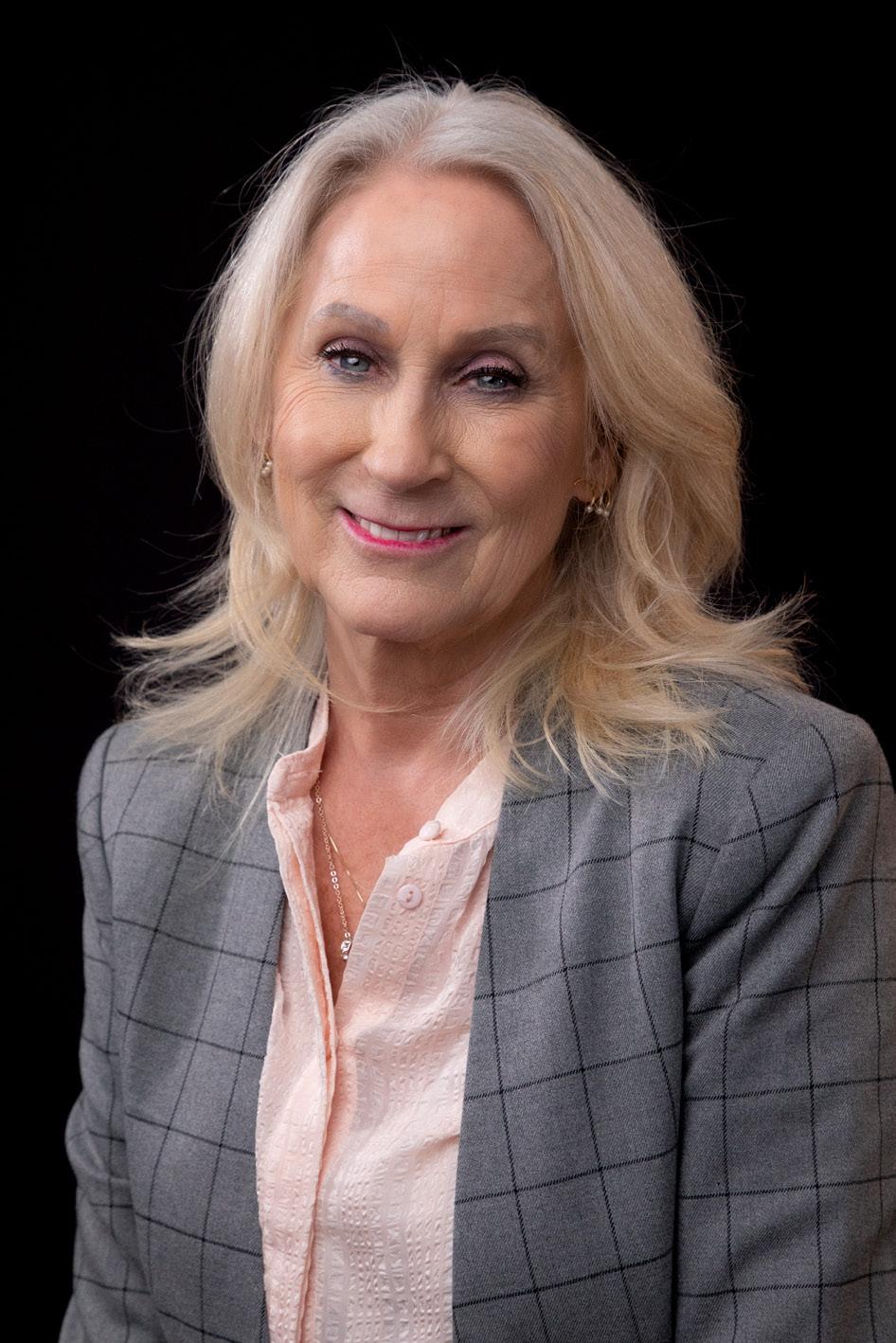
37 Academic Report 2020 | Dixie State University
NOELLE WEST: Following Research Across the Country
By Denali Lathrop, Senior, English Major, Creative Writing Emphasis
Noelle West’s interest in mathematical research was piqued when she took an Ordinary Differential Equations class at Jackson College in Jackson, Michigan. The class led to her conducting some baseline research where she found Dr. Vinodh Chellamuthu’s dissertation in which he modeled the disease dynamics of an illness in frogs. West transferred to Dixie State in 2017 to work with Dr. Chellamuthu.
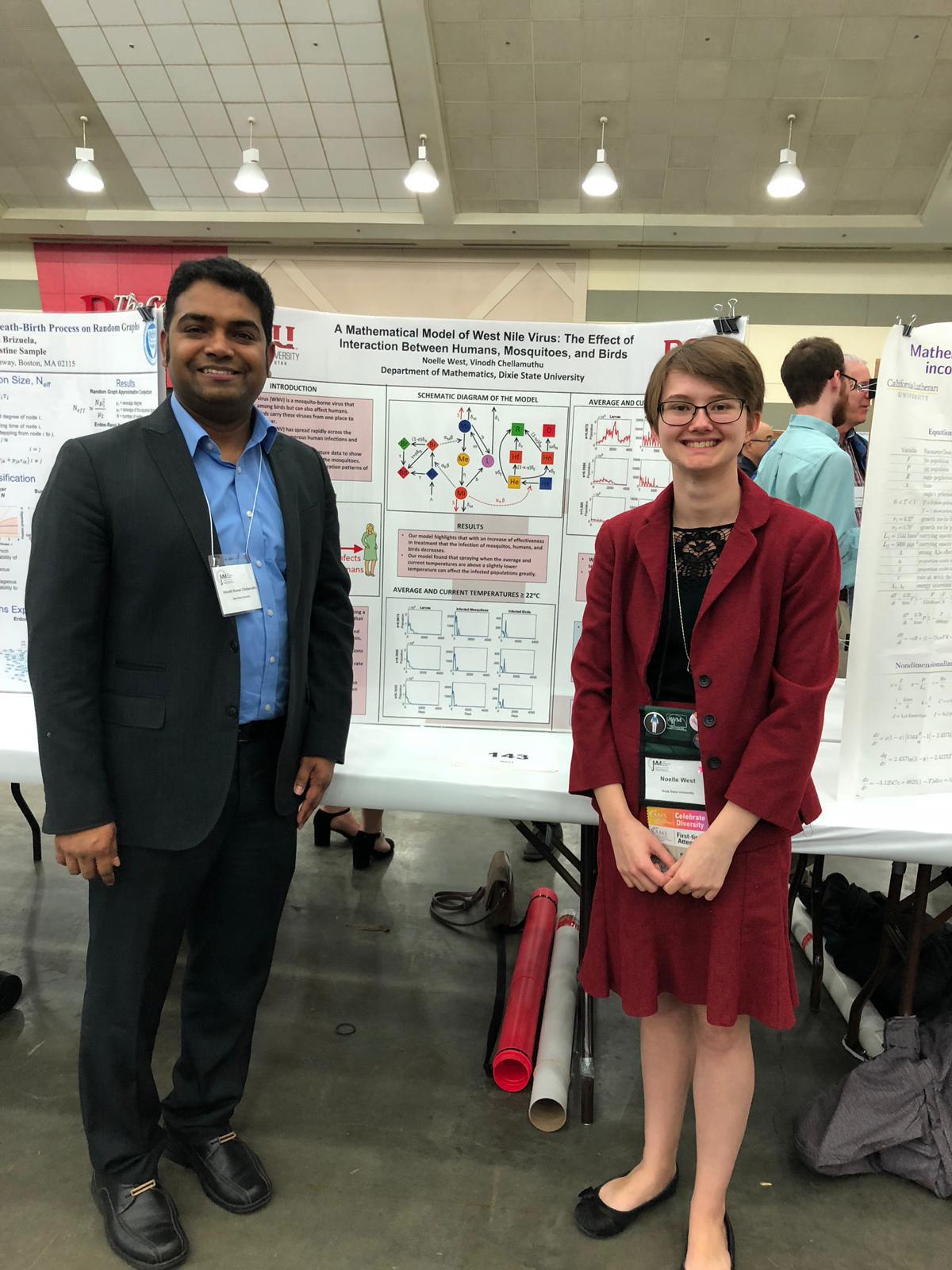
West’s research since arriving at Dixie included the implementation of a system of eighteen ordinary differential equations that all work together to simulate the disease dynamics of West Nile Virus (WNV). West Nile Virus is a mosquito-borne illness that has spread worldwide via birds. This disease has resulted in infections and deaths. Previous models of the West Nile Virus and its transmission did not include passive immunity and vertical transmission. West defined passive immunity as “the passing of resistance to a disease from the recovered adult populous to their young.”
West was accepted to present her research on the West Nile Virus at Posters on the Hill 2020. Members of Congress and their staff members attend Posters on the Hill to learn about undergraduate research by talking with the undergraduate students personally. This event takes place at Capitol Hill in Washington, D.C., and generally lasts two days. However, this year, due to COVID-19, the event took place virtually. Twitter was the mode of presentation. West uploaded four images and then replied to comments and questions. West says, “It was a bit tricky to reply to the questions and comments with Twitter’s character limit but I think it made it a bit of a challenge to try to get your point across with a character limit.” West also notes that because the presentations moved to digital format “a lot of people from my hometown were able to see and interact with my presentation when they would never have had the chance to before.”
West and Chellamuthu co-authored a report titled "Modeling
the Effects of Passive Immunity in Birds for the Disease Dynamics of West Nile Virus." This report was published in the sixth volume of Spora: A Journal of Biomathematics
West is now a first-year doctoral student at the University of North Texas. She is continuing her research in mathematics and is working toward a dissertation in representation theory. West says that she wants to be a professor and to “continue researching mathematics while also educating students and preparing them for their own goals and dreams.”
38 dixie.edu | Student Spotlights
STUDENT SPOTLIGHTS
HOLLY BLAHA: Pursuing Excellence through Hardship
By Allison Furse, Senior, English Major, Professional and Technical Writing Emphasis, Marketing Minor
Holly Blaha is a nontraditional student who returned to DSU in January of 2019. After deciding that nursing was not the path for her, but still wanting to pursue science and medicine, she transferred to the College of the Arts in Spring 2020 and began taking both science and art classes. She was just getting into her element there when COVID-19 struck with a vengeance. The coronavirus pandemic created many difficulties for Blaha and her family, as well as exacerbated some that they were already facing. Through it all, Blaha never failed to demonstrate her commitment to her studies and her ability to make the best out of challenging situations.
When students were notified that in-person classes would not resume after spring break, Blaha was able to work with the faculty of the art department and retrieve her pieces and supplies from the building. She then created her own make-shift art studio on her kitchen table. She began figuring out how to complete her classes and further her craft in this new online setting while at the same time helping her 11-year-old daughter navigate the same difficulties in her own schooling. Blaha split her time between her schoolwork, homeschooling her daughter, and caring for her ailing mother.
Blaha continued into the summer, taking classes and preparing her application to the Bachelor of Fine Arts program here at Dixie. She continued to adapt to the new style of learning and was able to step up and take the lead in one of her classes when the professor was sick and unable to teach for several weeks.
Even through all the adversity and hardship placed in her path, Blaha remains enthusiastic and hopeful. She maintains stellar grades in her classes and works toward her goal of graduating from DSU with a Bachelor of Fine Arts and going on to Johns Hopkins University to pursue a degree in Medical Illustration, melding her love for both art and health sciences. Blaha is a true example of the Dixie Spirit and is thriving, even in times of great uncertainty and struggle.
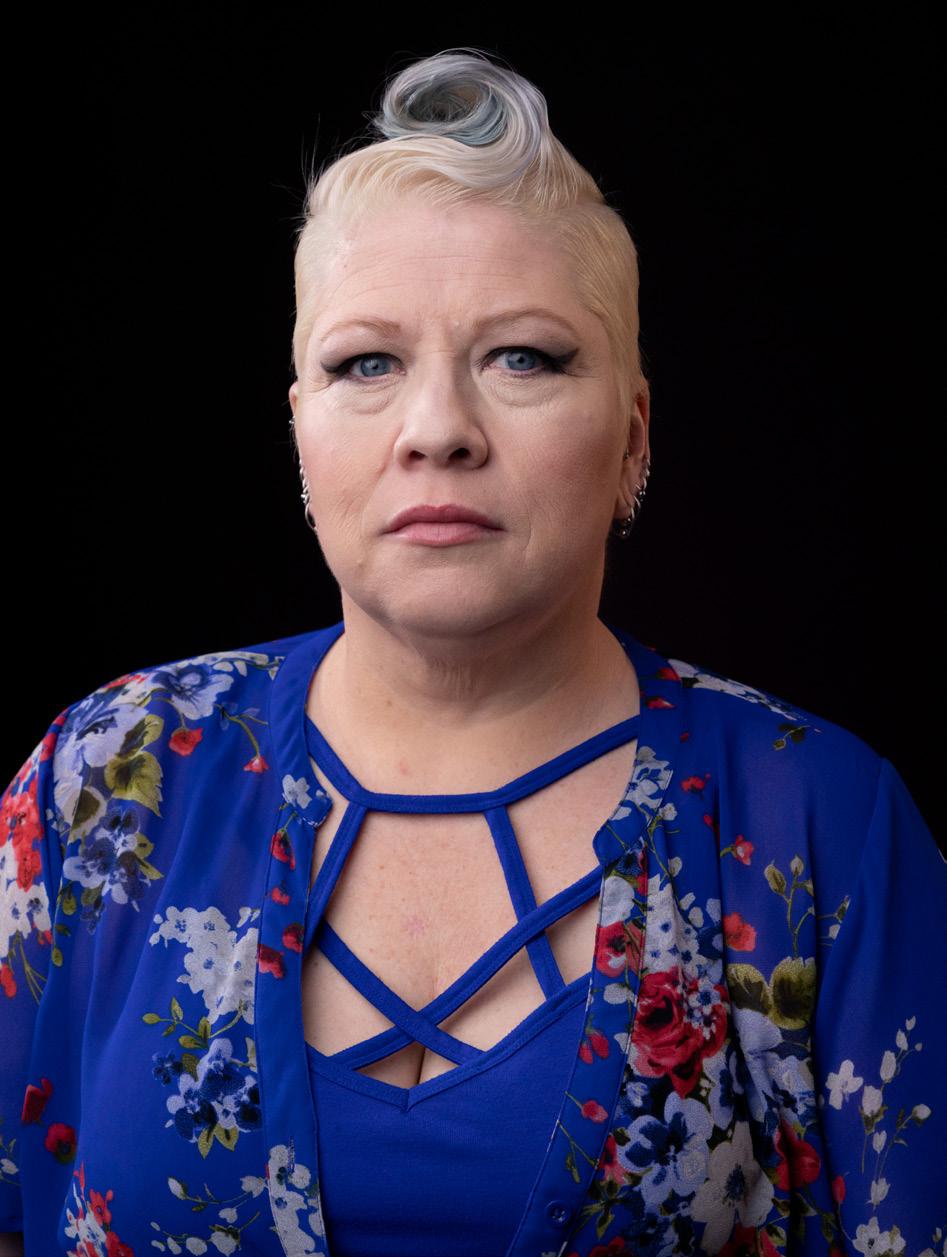
39 Academic Report 2020 | Dixie State University
COLLEGE OF THE ARTS
ALLRED, NANCY C., Professor of Music: Allred, N. C., Piano Q&A, YouTube Series for piano technique and literature; Allred, N. C., YouTube Channel for performances of classical and sacred music; Allred, N. C., Beethoven Festival (performer), Eccles Concert Hall, DSU; Allred, N. C., Christmas Concert in the St. George Tabernacle; Allred, N. C., Sterling Scholar Auditions, Crimson Cliffs High School; Allred, N. C., A step by step approach to teaching cross rhythms, UMTA State Conference; Allred, N. C., From beginning to end: Tips for more effective practice and performance, Southern Utah Piano Pedagogy Conference, DSU/SUU; Yu, K.-W., & Allred, N. C., When East meets West: A guide to traditional Chinese Music, Dixie Forum.
BLAKLEY, GLEN B., Professor of Art: Blakley, G., Ceramics, Faculty Fall Showcase; Blakley, G. B., Ceramics: Lurking in the shadow, Annual Halloween Art Show, St. George Art Museum; Blakley, G. B., Telling asunder: Episode 1.
FRANCIS, TIMOTHY, Associate Professor of Music: Francis, T. Jazz Christmas Concert, Rebel Jazz Band; Francis, T., Bohemia in the Desert Concert, Southwest Symphony Orchestra; Francis, T., Saint George City Valentine Dance, Rebel Jazz Band; Francis, T., Saint George Jazz Festival, Rebel Jazz Band with Chuck Findley and Bob Reynolds; Francis, T., Southwest Symphony Orchestra Halloween Concert: Superheroes, Southwest Symphony Orchestra.
GALLO, SARA, Associate Professor of Dance: Gallo, S. E. Dance improvisation–An ever-evolving avenue for self-affirmation, Zion National Park; Eastwest Shin Somatics Zion Conference: Somatics in Phenomenology, Performance & Leadership.
HALE, ROGER H., Associate Professor of Music: Hale, R. H., Remote Guest Clinician for SingFonix Male Choral Ensemble; Hale, R. H., Clinician: Crimson Cliffs High School Chamber choir; Hale, R. H., Clinician: Farmington High School Chamber Singers Workshop; Hale, R. H., Clinician: Pine View High School Chamber Singers Workshop; Hale, R. H., Clinician: Providence High School Choir; Hale, R. H., Clinician: Roy High School, Crimson Cliffs High School Concert Choir; Hale, R. H., Clinician: Washington County School District Honor Choir; Hale, R. H., Clinician: Herriman High School Chamber Singers Workshop; Hale, R. H., Clinician: Herriman High School Chamber Singers Workshop; Hale, R. H., Clinician: Pine View High School Chamber Singers Workshop; Hale, R. H., Topics in music education, Music Education Course at University of Pretoria, South Africa.
MARTINEZ, DENNIS J., Professor of Art: Martinez, D. J., Arrangements: A survey of Utah collage, 2017-2020.
RHODES, RHONDA L., Assistant Professor of Music: Rhodes, R., Clinician - Guest Conductor. San Juan County School District Jr. High Honor Band; Rhodes, R., & Giles, C.. Performance - Faculty Recital.
SMITH, BRYANT W., Assistant Professor of Music/Director of Bands: Smith, B. W., The Waves. Grand Circle New Music Ensemble; Smith, B.W., Washington County School District Honor Band; Smith, B. W., Beethoven’s Wind Music/Beethoven's Fidelio Octet with DSU Students, Faculty, and Community Members; Smith, B. W., Region 9 Jazz Festival Adjudication; Smith, B. W., Region 9 Solo and Ensemble Festival Adjudication; Smith, B. W., St. George Jazz Festival Adjudication; Smith, B.W., Three Ideas for Saxophone and Piano with Grace Palfreyman; Smith, B., Unsilent Night; Smith, B. W., DSU Conducting Symposium, Eccles Fine Arts Center.
STICH, ELIZABETH, Assistant Professor of Dance: Hane, J. & E. Stich, The gift of embracing risk: Responsibility as practice in aerial dance, Journal of Dance Education.
WEBB, GLENN D., Assistant Professor of Music: Webb, G. D., Extended techniques for vibraphone in George Crumb’s "Madrigals, Book 1" percussive notes; Webb, G. D., (Re) Creating Zion. DSU Symphony Orchestra; Webb, G. D., After the storm by Steve Ricks; Webb, G. D., Praise the lord with drums and dance: The old testament advocates for drumming in culture and religion, Percussion Studio Masterclass, BYU School of Music; Webb, G. D., Active learning session on how to foster student learning, teaching, learning, and student success conference, DSU.
WEBER, JENNIFER Y., Assistant Professor of Dance: Weber, J. Y., Another myself, American College Dance Association Northwest Conference; Weber, J. Y.,
40 dixie.edu | active learning. active life.
FACULTY PUBLICATIONS AND RESEARCH 2019-2020
Identifying intersections of identity as a tool to understand the complexity of the dancing body. Advocating for Integrity in Ballet’s Education, Performance, Research, and Profession, Council of Organized Researchers of Pedagogical Studies (CORPS) de Ballet International.
YU, KA-WAI, Assistant Professor of Music, Cello: Yu, K.-W., Transcriptions for Voice and Strings. St George Chamber Music Live; Yu, K.-W., World Premiere of JunYi Chow’s Dance and Weep for solo cello, St George Chamber Music Live; Yu, K.-W., An Afternoon of German Baroque Music; Yu, K.-W., Concerts with Southwest Symphony Orchestra; Yu, K.-W., Conductor of St. George Cello Ensemble; Yu, K.-W., Soiree Musicale: Mykola Suk & Friends, Celebrating Beethoven’s 250th Birthday, Chamber Music Society of Southern Utah; Yu, K.-W., World Premiere as Cello Soloist of Steven Ricks’ Re-Creating Zion, DSU Symphony Orchestra; Yu, K.-W., Cello Recital at the Hong Kong Economic and Trade Office; Yu, K.-W., DSU Cello Festival Final Concert, Festival Cello Ensemble and Ensemble Bravo; Yu, K.-W., Faculty Recital, DSU; Yu, K.-W., Grace Concert Series: Cosmopolitan Baroque; Yu, K.-W., Grand Circle New Music Concert; Yu, K.-W., On That Holy Night Concert, Cello; Yu, K.-W., Soiree Musicale in Concert: Chamber Music by Beethoven, Mozart and Schumann, Chamber Music Society of Southern Utah; Yu, K.-W., World Premiere and Soloist at Fresno International Cello Festival Gala Concert; Yu, K.-W., Beethoven: Symphony No. 7 (for Cello Octet) - Allegretto; Yu, K.-W., Cello Concerto No. 2 in D Major (for Cello Quintet), among many other performances.
GUBLER, SHANDON DALE, Professor of Business Management: Gubler, S.D., Reverse mentoring, speed mentoring, and micro-internships, DSU Women’s Resource Center.
CROSBY, JERI L., Instructor of the Practice in Educ & Elem Arts Endowed Chair: Crosby, J. L., Pop! Goes the xylo, Utah Music Educators Association Statewide Conference, Dixie Center; Crosby, J.L., Body bops and boogie buckets, Utah Music Educators Association Statewide Conference, Dixie Center.
BARTHOLOMEW, GREG, Associate Professor of Education: Bartholomew, G.E., Mentor Teacher/university supervisor compensation as a factor in successful field experience opportunities, National Field Experience Conference, University of Northern Colorado.
BRANDT, ADRIANA M., Associate Professor of Education: Brandt, A., Understanding the English side of dual language/bilingual immersion, TESOL International Convention and English Language Expo, Atlanta.
BUCKNER, CARI L., Associate Professor of Family & Consumer Sciences, First graders in a multi-ability classroom: An interpretive case study; Literature books for young children, WCSD Special Education Preschool Teachers.
CHILD, ANGIE, Associate Professor of Education: Child, A. R. & Knight J. A., Teaching an effective phonics lesson, The New Mexico Journal of Reading, Vol. XXXVIII.
GALI, KARI A., Assistant Professor of Education: Chellamuthu, V. K., DiSalvo, L. K., Wrede, T., & Gali, K. A. Learning innovation mini-grant research: How to improve active learning in the classroom, CTL Lunch and Learn.
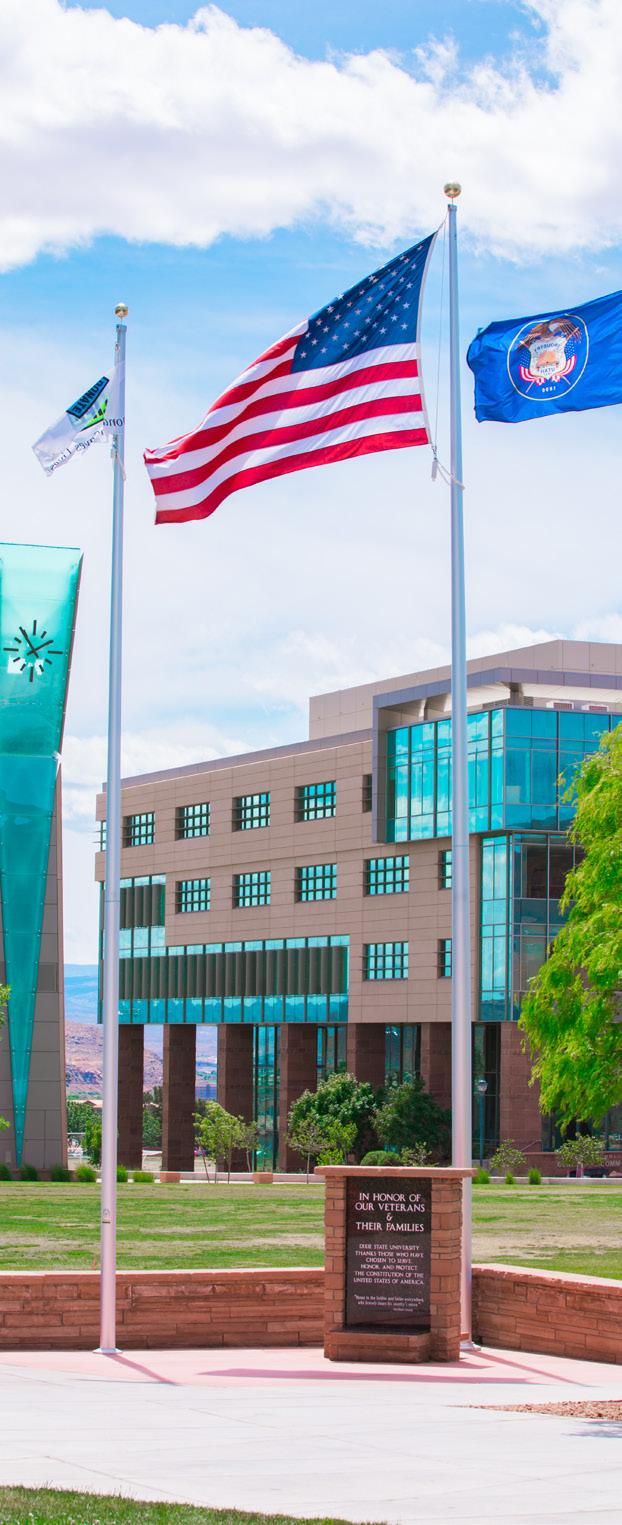
41 Academic Report 2020 | Dixie State University
COLLEGE OF BUSINESS
COLLEGE
OF EDUCATION
HAUCK, NANCY E., Associate Provost for Community & Global Engagement: Hauck, N. E., & Ortiz, E., Trailblazing connections: creating a sense of belonging in the first year, High Impact Practices in the Nation Conference; Hauck, N. E., & Hill, J. Utah women’s leadership exchange: Exploring potential barriers of career advancement in higher education, Utah Women’s Leadership Exchange, Utah System of Higher Education, Salt Lake City; Hauck, N. E. Health and happiness in Washington county, Utah, Washington County Commissioners, St George City Council, DSU University Council, Intermountain Healthcare Executive Council; Hauck, N. E., & Taylor, J., Live Long! Live Well! Utah State Board of Education, Utah Science Standards, K-2 Grades.
PAK, BYUNGEUN, Assistant Professor of Education: Cavanna, J. M., Pak, B., and Jackson, B., How do number talks support beginning teachers’ ambitious and equitable instruction?, Conference of the Association of Mathematics Teacher Educators, Orlando; Pak, B., et al., New teachers’ equitable and ambitious number talks, Poster, 42th Conference of the North American Chapter of the International Group for the Psychology of Mathematics Education, Mazatlán, Sinaloa, México; Pak, B., et al., Exploring about beginning teachers’ equitable and ambitious teaching practice with number talk routine, American Educational Research Association, Orlando; Pak, B. and Drake, C., Beginning elementary teachers’
curriculum use in English language arts and mathematics, American Educational Research Association, Orlando; Yang, X. and Pak, B., Pedagogical challenges of immigrant minority teacher educators: A collaborative autoethnography study, Roundtable, American Educational Research Association, Orlando.
ROSS, NANCY L., Assistant Professor of Interdisciplinary Arts & Sciences: Ross, N. L., & Finnigan, J., The unexpected conversation: LDS garments, gender, and belief, CHaSS Brown Bag Seminar, DSU; Finnigan, J. D., & Ross, N. L., Your religion is showing: Negotiation and personal experience in Mormon garments, religion, attire, and adornment in North America, Columbia UP.
COLLEGE OF HEALTH SCIENCES
ARMSTRONG, BRENDA L., Associate Professor of Dental Hygiene: Armstrong, B. L., & Jensen, K., From passive to active: Revisiting the transformation of the traditional lecture course, Utah Dental Hygienists’ Association Annual Session, Salt Lake City; Armstrong, B. L., & Stout, S., Oral health of long term care residents, Journal of Dental Hygiene; Armstrong B. L., & Stout, S., Oral health data and providing care to nursing home residents, Journal of Dental Hygiene; Jensen, K., & Armstrong, B., Medical/dental integration in dental hygiene program curriculum, American Dental Hygiene Association Annual Conference, New Orleans.
FAWNS, TRACY, Assistant Professor of Nursing: Fawns, T. YouTube Channel: Nurse Tracy, https://www.youtube.com/channel/ UCSEWQngDmo4o_glU0sTYLtA/; Fawns, T., Hiker trash, Audible, https://www. audible.com/; Fawns, T., Factors affecting student success in Oregon associate degree nursing programs, Western Institute of Nursing Research, Portland.
FICKLIN, TRAVIS K., Associate Professor of Exercise Science (Biomechanics): Papadopoulos, P., Lund, R.J., Ficklin, T.K., & Reed, J.P., The role of rhythm step on proagility test performance in division I football players, Research Quarterly for Exercise and Sport; Reber (Lewis), M., Del Toro, E., Lyman, H., Hargis, W., & Ficklin, T. Differences in anthropometric characteristics between intermediate and high-level rock climbers, DSU Regional Research Symposium; Clingman, J., Lindsley, K., Richardson, S., Del Toro, E., Bowles, B., & Ficklin, T., Hip and shoulder separation and its relationship to pitched baseball velocity, DSU Regional Research Symposium; Richardson, S., Lindsley, K., & Ficklin, T. Predictors of bat acceleration in collegiate softball players from a commercially available swing sensor, DSU Regional Research Symposium.
FLOERCHINGER, SHERRY M., Professor of Radiography: Imaging for the fun of it! ACERT Annual Conference. Las Vegas, Association of Collegiate Educators in Radiologic Technology.
JENSEN, KIMBERLY, Assistant Professor of Dental Hygiene: Armstrong, B. L., & Jensen, K., From passive to active: revisiting the transformation of the traditional lecture
42 dixie.edu | active learning. active life. FACULTY PUBLICATIONS AND RESEARCH 2019-2020
COLLEGE OF EDUCATION, continued
course. Utah Dental Hygienists’ Association Annual Session, Salt Lake City; Jensen, K., & Armstrong, B., Medical/Dental Integration in Dental Hygiene Program Curriculum. American Dental Hygiene Association Annual Conference. New Orleans; Jensen, K., Strategies for Active Learning Success, American Dental Educators Association Directors Meeting, Minneapolis; Jensen, K., Dental Health Services Study Abroad - GLS 4990R, DSU Study Abroad.
LOVELL, JOSEPH, Associate Professor of Recreation and Sports Management: Peterson, C., Chellamuthu, V. K., & Lovell, J., Weighted analytics - What do the numbers suggest; Lovell, J., The influence of high school athletics participation in developing lifelong healthy habits, North American Society for Sport Management Annual Conference, San Diego; Lovell, J., Facilitating play: 50 games in 60 minutes, National Recreation and Park Association Conference and Expo. Baltimore; Lovell. J. Recreation internships in southern Utah, Southern Utah Recreation and Park Association Workshop; Lovell, J. Costa Rica: Tourism and Adventure Recreation Study Abroad, DSU Study Abroad; Lovell, J., London: Sport and Culture Study Abroad, DSU Study Abroad.
NEIBERT, PETER J., Associate Professor of Athletic Training/Program Director: Neibert, P. J., & Garrett, T. R. Graston technique® as a treatment for patients with chronic plantar heel pain, Clinical Practice in Athletic Training: A Journal of PracticeBased, Outcomes, and Action Research.
SCHNEIDER, NICOLE, Assistant Professor of Physical Therapy, New course design
with DXL services: HYBRID/blended course, PTA 2400 Clinical Pathology, DSU PTA program; Schneider, N., New course development/creation: PTA 3000 Clinical Skills, DSU PTA program; Schneider, N., New online course development with DXL, Intro to PT, PTA 1010, DSU PTA program.

WELCH, LISA M., Associate Professor of Dental Hygiene: Doctorate of Education in Health Professions. A.T. Still University of Health Sciences; Welch, L. M., Doctoral Research Project Investigation into the Cultural Competency of Dental Hygienists in a Large Western State of the United States of America; Welch, L. M., Investigation into the cultural competency of dental hygienists in a large western state of the United States of America, Journal of Dental Hygiene; Welch, L.M., Investigation of the cultural competence of dental hygienists practicing in the state of Utah, Journal of Dental Hygiene; Welch, L. M., Investigation into the cultural competency of dental hygienists in a large western state of the United States of America, American Dental Hygienist’s Association Annual Session, online; Welch, L. M., & Boyd, L. D., Medical, Dental and Psychosocial Histories 163-182, Clinical Practice of the Dental Hygienist, Jones & Bartlett Learning; Welch, L. M., The patient with a blood disorder 1061-1075, Clinical Practice of the Dental Hygienist, Jones & Bartlett Learning; Welch, L. M. New Online Course Development with DXL Biostatistics, DHYG 4010, DSU Dental Hygiene Program.
WILCOX, DREW Chair of the Department of Healthcare Diagnostics and Therapeutics, and Director of the Physical Therapist Assistant Program: Wilcox, D., The value of
a profession that is #bettertogether, past, present, and future, Keynote Address, Utah Physical Association Spring Conference; Wilcox, D., Professionalism/ethics in clinical education, Utah Physical Therapy Association Spring Conference; Wilcox, D., Ethical practice and the Utah practice act, Dixie Regional Medical Center Continuing Education Series.
43 Academic Report 2020 | Dixie State University
COLLEGE OF HUMANITIES & SOCIAL SCIENCES
ABBOTT, JESSICA A., Assistant Professor of Criminal Justice: Abbott, J. A., et al., The effects of police effort on victims’ fear of crime, American Journal of Criminal Justice; Abbott, J. A., et al., College Students’ Alcohol and Substance Use: Religiosity as a Protective Factor. Journal of Alcohol and Drug Education; Abbott, J. A., Maintaining an active research agenda while at a small teaching university. Mid-South Sociological Association. Jackson; Abbott, J. A., & McGrath, S. A., Understanding victim-offender dynamics when predicting violent crime victims’ fear, Mid-South Sociological Association, Jackson.
ALVARADO, RAISA, Assistant Professor of Communication Studies: Alvarado, R., NO US WITHOUT YOU!: On recontextualizing border visuality, Border Rhetorics, Communication and Critical/Cultural Studies Forum; Alvarado, R. & Holling, M., Digital testimonios of and witnessing to Salma Hayek and America Ferrera’s disclosures of sexual harassment and assault, The Routledge Handbook of Communication and Gender; Alvarado, R., Book Review of Si Ella Puede: The rhetorical legacy of Dolores Huerta and the United Farm Workers, Quarterly Journal of Speech.
ARMSTRONG, STEPHEN, Professor of English: Roger Corman’s New World Pictures (1970-1983): An Oral History Volumes 1 and 2, Bear Manor Media.
ANDES, RICHARD H., Instructor of the Practice in ESL: Miles, S. W., Nagrodsky, J., & Cutler, C., Now We’re Talking, Book 1 & 2: Communicating in English. (R. H. Andes & L. Galloway, Eds.), Blue Sage Learning.
BACABAC, FLORENCE ELIZABETH, Professor of English: Bacabac, F. E. , ‘We write to serve': The intersections of service learning, grant writing, and the feminist rhetorical agency, Louisville; Bacabac, F. E., Community engagement through grant writing and the rhetorical agency, Brown Bag Seminar, DSU; Bacabac, F. E., Service writing, service learning: (DIY) feminist pedagogy and community partnerships, 12th Biennial International Feminism(s) and Rhetoric(s) Conference, Harrisonburg; Bacabac, F. E., Toward writing in the disciplines through critical thinking, The CEA Forum.
BARRY, BRAD A., Professor of English: Barry, B. A., Soda, Route 7 Review; Barry, B. A., Student retention and the ‘are you okay?’ e-mail, Chronicle of Higher Education; Barry, B. A., DeLillo’s white noise in our post post-modern age of a viral pandemic, Rocky Mountain MLA, Denver; Barry, B., DeLillo’s White Noise during the onset of the COVID-19 pandemic, Utah English Journal.
BROWN, KRISTEN R., Visiting PostDoctoral Teaching Fellow of English: Brown, K.R., Of sound mind and body: Lessons in listening to the jingle dress dance, Humanities on the Brink: Energy, Environment, Emergency, Association for the Study of Literature and the Environment; Brown, K. R., Queering the waters: The subversive potential in
E. Pauline Johnson’s Canoe, Western American Literature 55.2; Brown, K.R., The Earth is our common ear: Zitkala Ša’s Sonic Ecologies, Dissent, The Society of Nineteenth-Century Americanists; Brown, K.R., Tiny taps and noisy hacks: Listening to Zitkala Ša’s Sonic Politics, Resonance, A Journal of Sound and Culture.
CARTMILL, MICHAEL K., Associate Professor of Spanish/Director of Global Education: Cartmill, M. K. Yucatán, México Medical Interpreting Service Learning Trip with Wheeling University Physical Therapy Program; Cartmill, M. K., Utah St. George West Coordinating Council of the Church of Jesus Christ of Latter-day Saints.
DING, ZHAO, Assistant Professor of Communication: Ding, Z., et al., Crazy sexy Asian men!: Masculinities in crazy rich Asians, de-whitening intersectionality: Race, intercultural communication, and politics, Lexington; Ding, Z., Review on the book Queer Chinese Cultures and Mobilities: Kinship, Migration, and Middle Classes by John Wei. QED: A Journal in GLBTQ Worldmaking; Ding, Z., Same joy, same happiness: A critical reading of transnational whiteness through Blackface performance in CCTV Chinese New Year Gala, Transnationalizing Critical Intercultural Communication: Legacy, Relevance, and Future, Bern, Switzerland: Peter Lang.
DUPREE, JARED, Associated Professor of Communication Studies: Bean, R. A. & Dupree, J. W., Evaluating scholarship productivity in COAMFTE-accredited doctoral programs: An update, Journal of Marital and Family Therapy.
44 dixie.edu | active learning. active life. FACULTY PUBLICATIONS AND
RESEARCH 2019-2020
HAENDIGES, JIM A., Associate Professor of English/Director of FYE: Kennedy, G. E., Montgomery, T. T., & Haendiges, J., Solving problems with new media, Technical and Professional Writings: Solving Problems at Work, Upper Saddle River.
HARRIS, LISH, Associate Professor of Criminal Justice: Harris, L., et al., School Shootings and the Availability Cascade, San Francisco.
LIN, HENGJUN, Assistant Professor of Communication Studies: Lin, H., An Exploration of Psychological Distance, Risk Perception, Proactive Risk Intention toward Risk Messages; Lin, H., Is intercultural mindfulness associated with anxiety, uncertainty, and communication effectiveness? A Moderated Mediation Model of Cross-cultural Health Communication, 106th annual conference of the National Communication Association, Indianapolis; Lin, H., Coping with workrelated depression: Resistance, stigma management and resilience construction through an online anti-depression and antianxiety forum, 105th annual conference of the National Communication Association, Baltimore; Lin, H. & Thompson, C.M., An Application of anxiety and uncertainty management theory in a patient-provider cross-cultural context, 69th International Communication Association annual conference, Washington DC.
MANN, BENJAMIN, Postdoc

Communication Studies: Mann, B. W., Theorizing intersectional stigma management communication at the
crossroads: LGBTQIA+ and autistic subjectivities, National Communication Association Convention, Indianapolis; Jensen, R.E., Parks, M.M., Mann, B.W., Maison, K., Krall, M.A. Mapping nature’s scientist: The posthumous demarcation of Rosalind Franklin’s crystallographic data, Quarterly Journal of Speech, NCA Association for the Rhetoric of Science, Technology, and Medicine Article of the Year Award.
MILES, SCOTT W., Assistant Professor of English as a Second Language (ESL): Miles, S. W., et al., Now We’re Talking, Book 1 & 2: Communicating in English, Blue Sage Learning; Miles, S. W., & Song, B., Happiness and the L2 writer: The effect of positive psychology writing tasks on second language learners, Korea TESOL Journal.
OLSON, KRISTINE J., Associate Professor of Psychology: Olson, K.J., et al., The relationship between religious fundamentalism, conservatism, and perceptions of substance and behavioral addictions, The Journal of Psychology and the Behavioral Sciences; Olson, K. J., et al., The relationship between mentor support experiences and STEM graduate student career optimism, Career Development International; Olson, K. J., & Jiang, L., The effects of university research and teaching climate strength on faculty self-reported teaching performance, Higher Education Research & Development; Olson, K. J., et al., Job insecurity: Connections with financial and psychological wellbeing, American Psychological Association Annual Convention, Washington DC.
45 Academic Report 2020 | Dixie State University
COLLEGE OF HUMANITIES & SOCIAL SCIENCES, continued
ORTIZ, ERIN, Associate Professor of Media Studies: Hauck, N. E., & Ortiz, E., Trailblazing connections: Creating a sense of belonging in the first year, High Impact Practices in the Nation Conference.
PHELAN, KOREY S., Assistant Professor of Criminal Justice: Abbott, J., Phelan, K. S., & McGrath, S., Assessing the relationship between public lands and juvenile arrest rates: Does a greater proportion of public lands yield lower delinquency rates, MidSouth Sociological Association Annual Meeting.
PILKINGTON, OLGA A., Assistant Professor of English: Pilkington, O. A., & Pilkington, A. G. (Eds.), Lab Lit: exploring literary and cultural representations of science, Lexington/Rowman & Littlefield; Pilkington, O. A., The language of popular
science: Analyzing the communication of advanced ideas to lay readers, McFarland; Pilkington, O. A., Uhura and the linguistics of Star Trek, The Kelvin Timeline of Star Trek, Jefferson; Pilkington, O. A., Definitions of scientific terminology in popular science books: An examination of definitional chains, Science Communication; Pilkington, O.A., Presented Discourse in Popular Science: Professional Voices in Books for Lay Audiences, Brill; Pilkington, O.A., Undergraduate research: What’s in It for me? opportunities and benefits for faculty and Popularizing research findings, Annual Teaching and Learning Conference, DSU; Pilkington, O. A., Mentoring future researchers: Identifying and fostering potential, DSU Women's Resource Center Workshop Series.
ROSE, KATHY, Instructor of the Practice in English: Rose, K., & Grauman, J., Motivational scaffolding's potential for inviting transfer in writing center collaborations, Transfer of Learning in the Writing Center: A WLN Digital Edited Collection; Rose, K., Inviting undergraduate students to be co-researchers in WAW (writing about writing) research, CCCC, Spokane.
SMITH-LAHRMAN, MATT B., Professor of Sociology: Smith-Lahrman, M. B., & Oxley, R., DSU’s bachelor's degree in applied sociology: Year three, Association for Applied and Clinical Sociology Applied U Webinar; Smith-Lahrman, M. B. , DSU’s bachelor's degree in applied sociology: The making of a program, Association for Applied and Clinical Sociology Annual Conference, Portland.
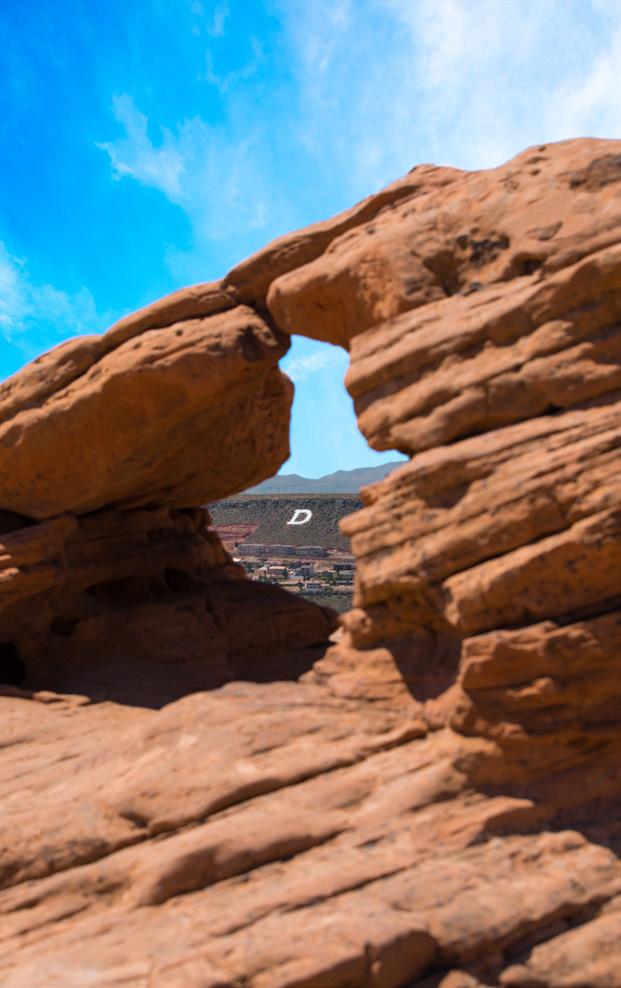
STEIN, JAMES, Assistant Professor of Communication Studies: Stein, J. B., A longitudinal extension of Relational Turbulence Theory: Popping the dyadic bubble, Journal of Personal Relationships; Stein, J. B., A longitudinal test of Relational Turbulence Theory, Journal of Relationships; Murphy, B., Fiori, K., & Stein, J. B., Keep your friends out of it: Network interference negatively predicts relationship quality and mental health in young dating couples, The Journal of Social, Behavioral, and Health Sciences; Stein, J. B., et al., Measuring the sources and content of network- based relational uncertainty: Looking outside of the dyadic bubble, Journal of Social and Personal Relationships; Stein, J. B., & Davidson, M. J., Exploring the predictive and theoretical validity of network interference and facilitation, Southern Communication Journal.
TAYLOR, LUCIA, Associate Professor of Spanish: Taylor, L., Learning Languages in a pandemic, is it worthy? CHaSS brown bag seminar, DSU; Taylor, L., Teaching and learning languages under COVID-19, International Conference Innovation in Language Learning, Firenze, Italy; Taylor, L., Looking under the hood of advanced level, ACTFL conference, Washington DC.
WIGHT, SHAUNA S., Assistant Professor of English: Wight, S., Supporting student literacy for the transition to college: Working with underrepresented students in precollege outreach programs, Routledge.
WIGNALL, DENNIS, Professor of Communication Studies: Chair for one or more panels and/or research presentations
46 dixie.edu | active learning. active life. FACULTY PUBLICATIONS
AND RESEARCH 2019-2020
at the National Communication Annual convention. Reviewed seven research papers for presentation at the convention submitted to the Division of Human Communication and Technology.
WOLFE, JOHN E., Associate Professor of Philosophy: Wolfe, J. E., A community of outsiders: Finding community through great texts, The Character of the University, Waco, Institute for Faith and Learning; Wolfe, J. E., Dying with dignity: An introduction, DSU Institute of Politics.
WOOD, BARRY DAVID, Assistant Professor of Humanities: Wood, B., The naturalistic turn in the humanities, CHaSS Brown Bag Seminar, DSU; Wood, B. D., War with Iran? DSU Institute of Politics; Wood, B., Introduction to Asian humanities, Dubuque, Great River Learning; Wood, B., Rethinking the ecology of Islamic geometric ornament, Journal of the Utah Academy of Sciences, Arts, and Letters.
WREDE, THEDA, Professor of English, Chellamuthu, V. K., DiSalvo, L. K., Wrede, T., & Gali, K. A., Learning innovation minigrant research - how to improve active learning in the classroom, CTL Lunch and Learn; Wrede, T., Interstitial spaces of the border: The construction of the MexicanAmerican border in Luis Alberto Urrea’s The house of broken angels, Annual Conference of the Rocky Mountain MLA; Wrede, T., Barbara Kingsolver’s flight behavior: The sciences in a post-fact world, Lab Lit: Exploring Literary and Cultural Representations of Science, Rowman & Littlefield.
YILDIZ, MUHAMMED, Assistant Professor of Sociology: Yıldız, M., Stressful life events and adolescent suicidality: An investigation of the mediating mechanisms, Journal of adolescence; Orak, U., Yildiz, M., et al., The utility of social learning theory in explaining cigarette use in a military setting., Substance Use & Misuse; Gurbuz, S., Yildiz, M., et al., Drug-using behaviors of Turkish Armed Forces Service members: A social control perspective, Military Behavioral Health.
COLLEGE OF SCIENCE, ENGINEERING & TECHNOLOGY
CHELLAMUTHU, VINODH KUMAR, Assistant Professor of Mathematics: Chellamuthu, V. K., & West, N., Modeling the effects of passive immunity in birds for the disease dynamics of West Nile virus, SPORA: A Journal of Biomathematics; Chellamuthu, V. K., et al., Somatic mutations in the DNA repairome in prostate cancers in African Americans and Caucasians, Nature, Oncogene; Peterson, C., Chellamuthu, V. K., & Lovell, J., Weighted Analytics - What do the numbers suggest; West, N., & Chellamuthu, V. K., Modeling the effects of passive immunity in birds for the disease dynamics of West Nile virus, Poster on the Hill, Washington DC; West, N., & Chellamuthu, V. K., A mathematical model of West Nile virus: The effects of passive immunity in birds and vertical transmission in mosquitoes, Utah Conference on Undergraduate Research; West, N., & Chellamuthu, V. K., A mathematical model of West Nile virus:
The effects of passive immunity in birds and vertical transmission in mosquitoes, AMSMAA Joint Mathematics Meeting, Denver; Smith, H., Gowans, B., Kellerstrauss, J., & Chellamuthu, V. K., A mathematical model to analyze COVID-19 related panic buying, DSU Symposium for Research, Innovation and Creativity, among much other research.
CHILOM, GABRIELA, Professor of Chemistry: Holden, M., Dustin, M., Spiller, C., Chilom, G., Study of humic acids from soils and from leaves, Dixie Research Symposium; Holden, M., Richardson, S., Dustin, M., Chilom, G., Comparative study of humic acids from soils and from leaves, American Chemical Society National Meeting, Philadelphia; Dustin, M., Holden, M., Peterson, R., Chilom, G., Heavy metals analysis of particulate matter removed by trees, American Chemical Society National Meeting, Philadelphia; Dustin, M., Kondel, M., Chilom, G., Accumulation of particulate matter on leaf surfaces, American Chemical Society National Meeting, San Diego.
DEL SESTO, RICO, Associate Professor of Chemistry: Bardsley, T., Evans, C., Greene, J., Audet, R., Harrison, M., Zimmerman, M., Nieto, N., Del Sesto, R, Koppisch, A., Kellar, R., Integration of choline geranate into electrospun protein scaffolds affords antimicrobial activity to biomaterials used for cutaneous wound healing, in review; Greene, J., Merrett, K., Heyert, A., Simmons, L., Migliori, C.**, Vogt, K., Castro, R., Phillips, P., Baker, J., Lindberg, G., Fox, D., Del Sesto, R., Koppisch, A., Investigations into the scope, efficacy and antimicrobial mechanism of the broad-
47 Academic Report 2020 | Dixie State University
2019-2020

spectrum antiseptic choline geranate, PLoS ONE; R. E. Del Sesto, S. Mitragotri, M. Zakrewsky, D. T. Fox, A. T. Koppisch, K. S. Lovejoy, Ionic Liquids for Transdermal Drug Delivery, US Patent issue number 10,449,254. International Application PCT/ US2014/063745; R. Keller, N. Nieto, A. Koppisch, R. Del Sesto, Ionic liquids that sterilize and prevent biofilm formation in skin wound healing devices, US Patent issue number 10,293,080.
HARRIS, JERRY D., Professor of Paleontology: Lucas, S. G., & Harris, J. D., The plastotype problem in ichnological taxonomy, Ichnos; Harris, J. D., Geology and paleontology of red cliffs NCA, Conserve Southwest Utah; Harris, J. D., Talks about geological hazards, Horizon Elementary, Washington, UT; Harris, J. D., The fossils in your backyard -or- dead things are all around you, Voyager Lecture Series, Ivins.
JIN, ZHENYU, Assistant Professor of Geography/GIS: Jin, Z., Chellamuthu, V. K., Kelley, N., & Maughan, D. Predicting habitat suitability for the Utah mountain kinsnake through GIS modeling, DSU Research Symposium; Jin, Z., Landscape change detection using GIS and remote sensing: A study on St. George, Utah, Annual Conference of the AAG, Washington DC.
O'BRIEN, ERIN E., Professor of Biology/ Director Community Engaged Learning:
O’Brien, E. E., Plant competition and the tragedy of the commons, Bryn Mawr College; O’Brien, E. E., Species specific
root allocation patterns in belowground competition, Annual Meeting of the Ecological Society of America.
QUINN, REN LORENZO, Assistant Professor of Computer Science: Quinn, R., Holguin, N., Poster, B., Roach, C., & Merwe, J. K., WASPP: Workflow automation for security policy procedures, 15th International Conference on Network and Service Management.
REID, RUSSELL, Assistant Professor: R.C. Reid, I. Mahbub, Wearable selfpowered biosensors, current opinion in electrochemistry; R.C. Reid, M.H. Merrill, J.P. Thomas, Stick–slip behavior during electrowetting-on-dielectric: polarization and substrate effects, microfluidics and nanofluidics; P.R. Adhikari, N.T. Tasneem, D.K. Biswas, R.C. Reid, I. Mahbub, Reverse electrowetting-on-dielectric energy harvesting integrated with charge amplifier and rectifier for self-powered motion sensors, ASME International Mechanical Engineering Congress and Exposition; N.T. Tasneem, D.K. Biswas, P.R. Adhikari, R.C. Reid, I. Mahbub, Design of a Reverse-Electrowetting Transducer Based Wireless Self-powered Motion Sensor, IEEE International Symposium on Circuits and Systems proceedings.
SMITH, GEOFF, Assistant Professor of Biology: Smith, G., Zani, P. A., & French, S. S., Life-history differences across latitude in common side-blotched lizards (Uta stansburiana).
BROEDER, KATHLEEN, Head of Special Collections & Archives, Library and Learning Services: Broeder, K. and D. Aldrich, Arcadia, forthcoming; Broeder, K. and E. Lanners, Priming for advocacy: Revitalizing a 35-year-old lecture series, Marketing Libraries Journal.
STEIN, JAMES B., Assistant Professor of Communication: Stein, J. B., & Davidson, M. J., Exploring the predictive and theoretical validity of the network interdependence measure, Southern Communication Journal; Stein, J. B., Murphy, B., & Fiori, K., Keep your friends out of it: Network interference negatively predicts relationship quality and mental health in young dating couples, Journal of Social, Behavioral, and Health Sciences; Stein, J. B., Monegeau, P. A., & Truscelli, N. I., Identifying and measuring networkbased relational uncertainty: Looking outside of the dyadic bubble, The Journal of Social and Personal Relationships.
ZIELKE, DAVID RAY, Librarian - Technical Services: Zielke, D., DSU patents and trademarks Libguide.
48 dixie.edu | active learning. active life.
FACULTY PUBLICATIONS AND RESEARCH
LIBRARY
DR. BRENT HUNT: Accomplished Scientist, Innovator, and Mentor
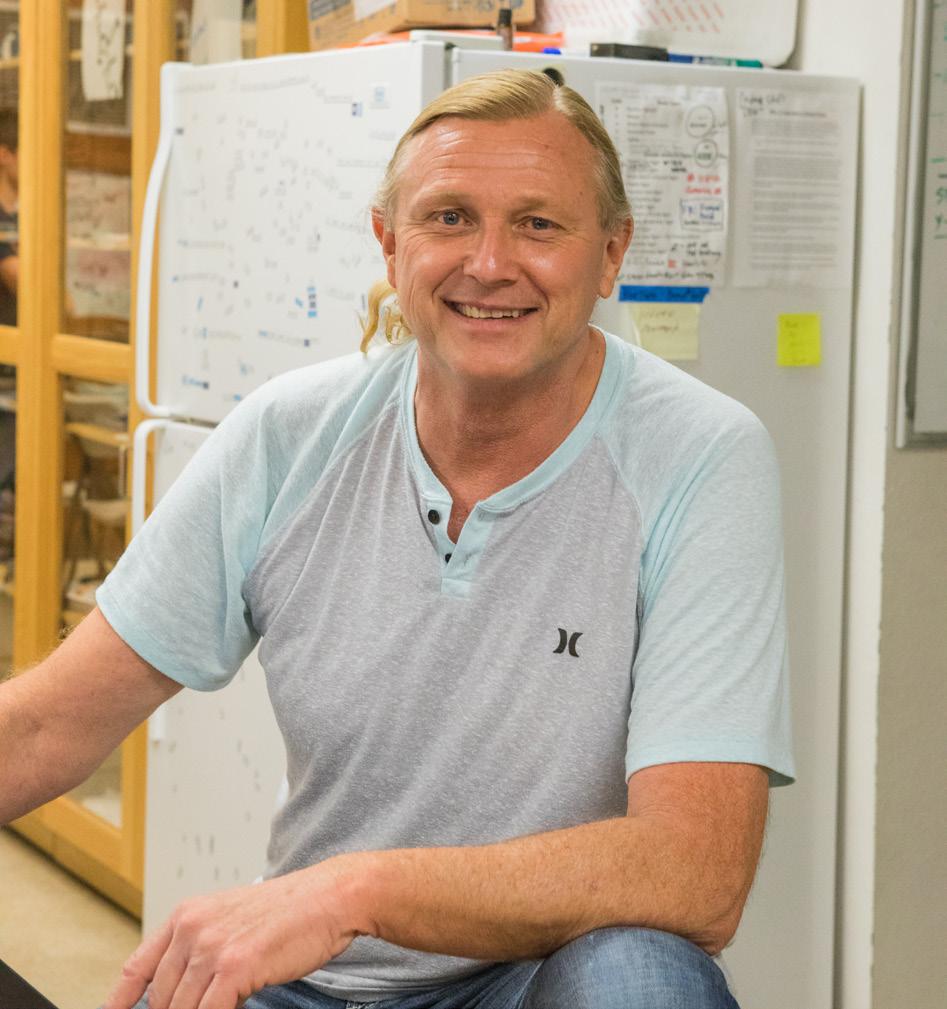
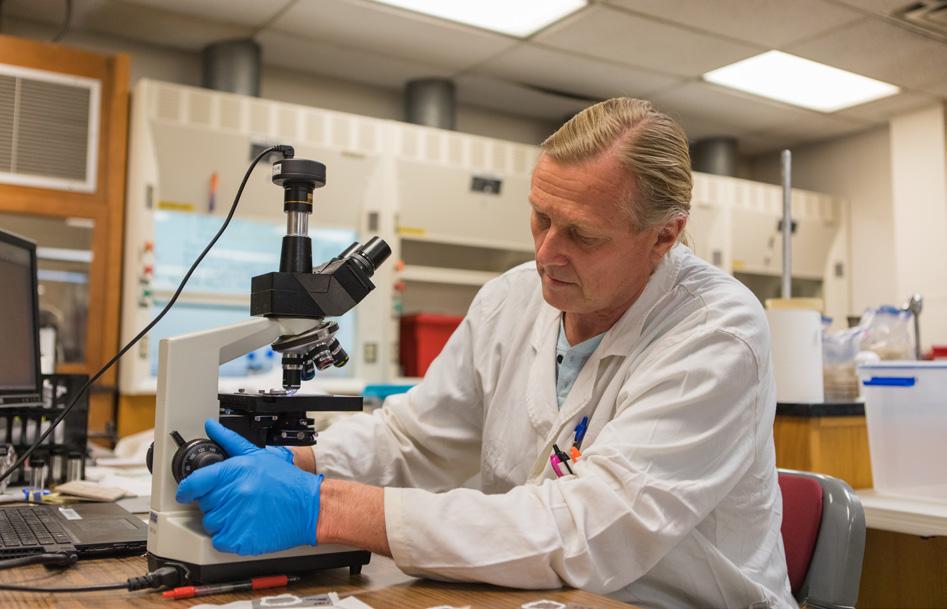 By Samantha Roybal, Senior, English Major, Professional and Technical Writing Emphasis, Photography Minor
By Samantha Roybal, Senior, English Major, Professional and Technical Writing Emphasis, Photography Minor
Following the passing of Dr. John “Brent” Hunt in May 2020, Dixie State University remembers and honors one of its own. Dr. Hunt was the CEO and founder of Soft Cell Biological Research. With the help of DSU students, he conducted much research on campus, making him a beloved mentor to a number of students. He was also a loving husband, father, and friend. He is remembered by students and loved ones for his enthusiastic passion for science and the well-being of others. His passing leaves many with a profound sadness, but also a great appreciation for the opportunity to know him.
Hunt was an excellent example of someone who followed DSU's "active learning. active life." motto wholeheartedly. He was a true Trailblazer who worked tirelessly to innovate, inspire, and encourage. Former student Kristian Johnson remembers him as an involved mentor who always pushed students to be the best they could be. Johnson says, “He always pushed me to keep investigating, and it made me a better scientist as a result.”
Hunt was widely recognized for his incredible intelligence and passion when it came to science, but he was even more admired for his caring heart and dedication to mentoring.
He never forgot about anyone and managed to make students feel as though they were a part of something much larger. His dedication to his students was as great as it was for science. If someone needed him, he was always there. Another former student Garett Milton describes him as such by saying, “His heart was massive and all he wanted to do was care for those who might be missed or overlooked.” His compassion was unmatched
and his infectious personality was one that pulled people in and allowed them to be their true selves. With unwavering acceptance, he taught his students to reject biases and always strive for more. The legacy he has left behind is tremendous and will surely not be forgotten. His presence can still be felt in the lab he built, as his passion continues to drive research. In fact, it was his passion for helping people that inspired him in all he did. Former student Lisa Justesen recalls, “When I think of Brent, I see his face the way it would light up when he was talking about his work. He was very passionate about finding answers to really help those with chronic illness.”
His mentorship to students left them with an astounding feeling of inspiration and motivation. He truly adored and represented his community with all that he had. “Southern Utah was in his blood and heart, and he wore it on his sleeve,” Milton states. The type of steadfast commitment and compassion that Hunt displayed is continually remembered by those who knew him. His legacy has left many with an earnest love for science, and his presence will be greatly missed at DSU.
49 Academic Report 2020 | Dixie State University
ratio students enrolled 1911 Founded as St. George Stake Academy on Main Street Admitted to the Utah System of Higher Education 1935 2000 Begins offering 4-year degrees 1923 Becomes Dixie Junior College 2020 2013 Receives university status from the Utah State Legislature 2020 Launched 2020-2025 strategic plan –Trailblazing Distinction 2018 Approved to offer its first graduate program 12,043 growth in bachelor’s degrees since 1999
% master’s degrees 4 bachelor’s degrees 53 associate’s degrees 16 degree emphases 68 of students are offered grants, scholarships, or financial aid international students 141 #1 Utah’s most affordable university 82
U.S. Postage PAID Non-Profit Org. PERMIT NO. 36 Provo, UT 225 South University Avenue St. George, UT 84770 435.652.7500 dixie.edu
21:1 student-to-faculty
2,450
%


 Dr. Michael Lacourse Provost and Vice President for Academic Affairs michael.lacourse@dixie.edu
Dr. Michael Lacourse Provost and Vice President for Academic Affairs michael.lacourse@dixie.edu

 By Allison Furse, Senior, English Major, Professional & Technical Writing Emphasis, Marketing Minor
By Allison Furse, Senior, English Major, Professional & Technical Writing Emphasis, Marketing Minor



 By Samantha Roybal, Senior, English Major, Professional and Technical Writing Emphasis, Photography Minor
By Samantha Roybal, Senior, English Major, Professional and Technical Writing Emphasis, Photography Minor




 By Brooke Carpenter, Senior, English Major, Professional and Technical Writing Emphasis
By Brooke Carpenter, Senior, English Major, Professional and Technical Writing Emphasis


 By Samantha Roybal, Senior, English Major, Professional and Technical Writing Emphasis, Photography Minor
By Samantha Roybal, Senior, English Major, Professional and Technical Writing Emphasis, Photography Minor


 By Denali Lathrop, Senior, English Major, Creative Writing Emphasis
By Denali Lathrop, Senior, English Major, Creative Writing Emphasis












 By Taylor Connor, Junior, English Major, Literary Studies Emphasis, Creative Writing Minor
By Taylor Connor, Junior, English Major, Literary Studies Emphasis, Creative Writing Minor












 By Rebecca Goates, Senior, Integrated Studies Major, Dance and English Areas of Emphasis, Honors Program
By Rebecca Goates, Senior, Integrated Studies Major, Dance and English Areas of Emphasis, Honors Program

 By Yasel Avalos, Junior, English Major, Professional and Technical Writing Emphasis, Spanish Minor
By Yasel Avalos, Junior, English Major, Professional and Technical Writing Emphasis, Spanish Minor










 By Samantha Roybal, Senior, English Major, Professional and Technical Writing Emphasis, Photography Minor
By Samantha Roybal, Senior, English Major, Professional and Technical Writing Emphasis, Photography Minor